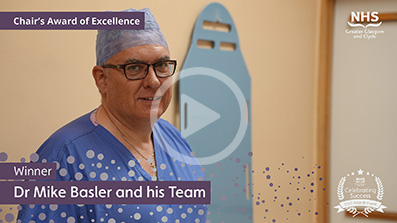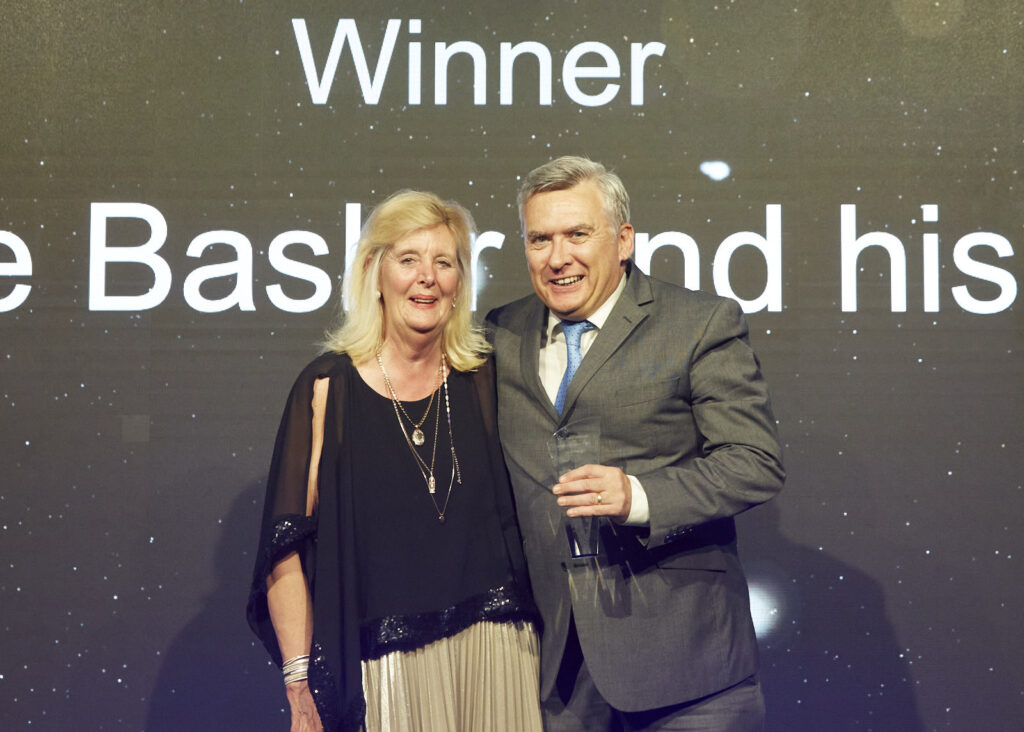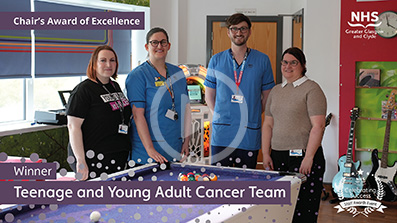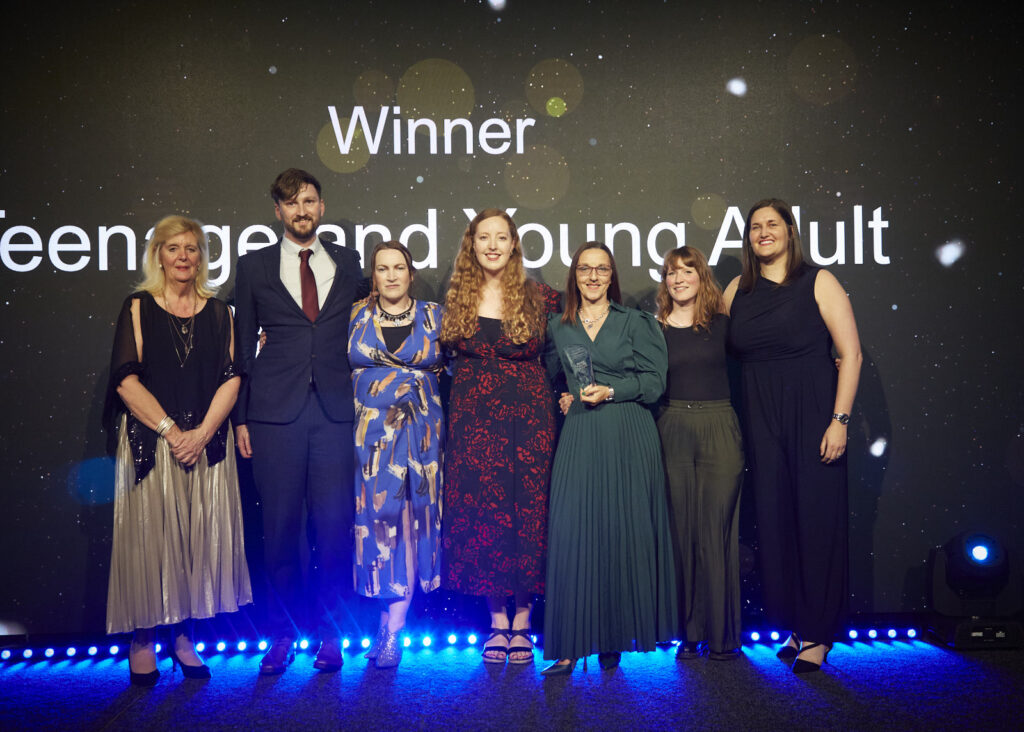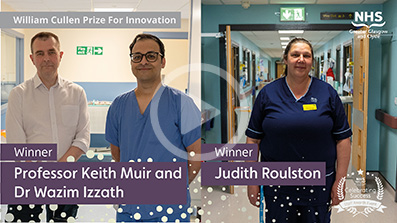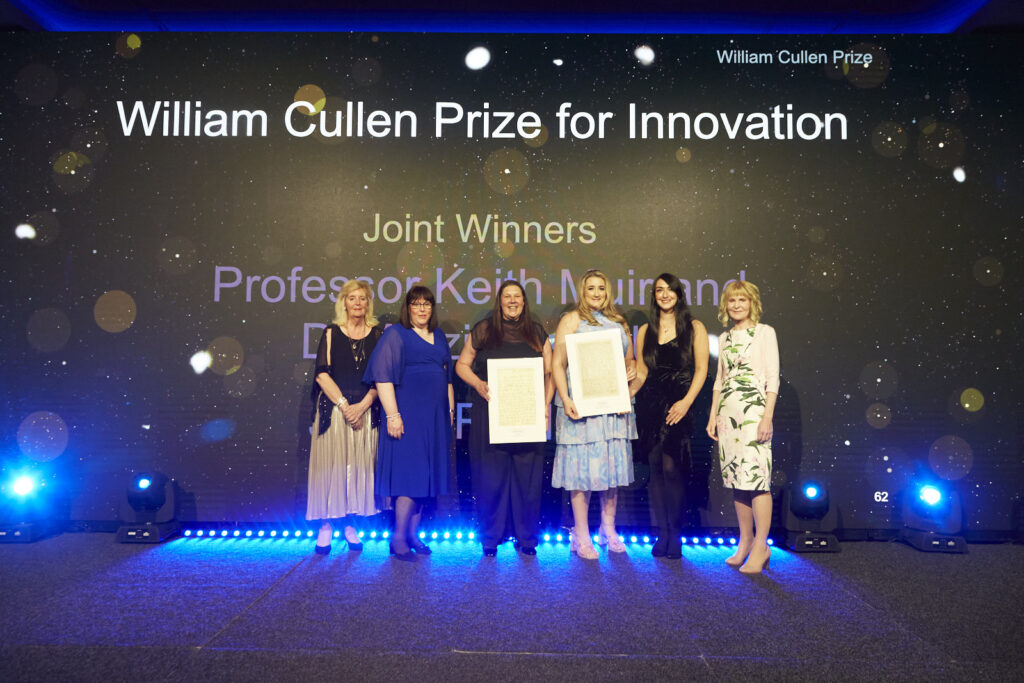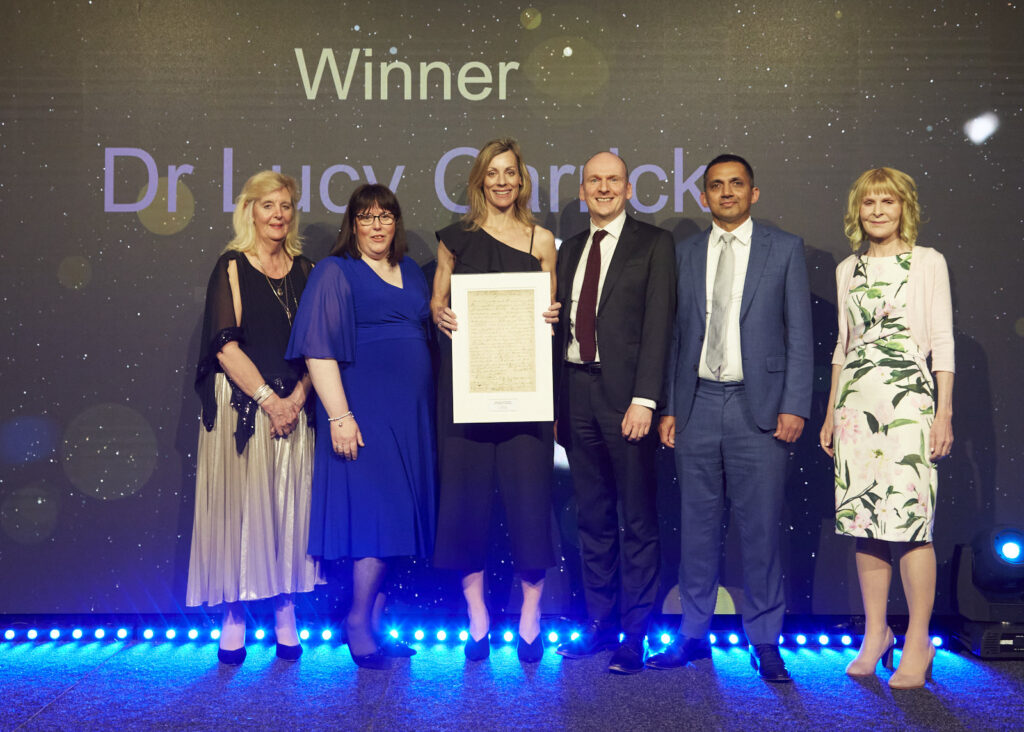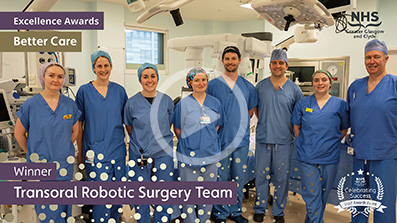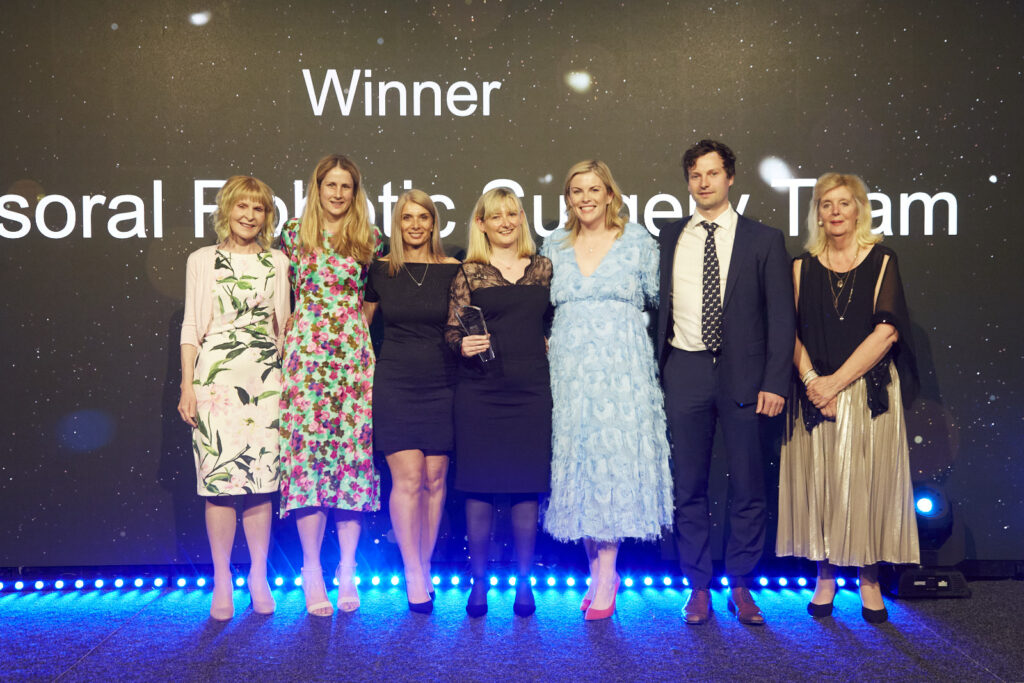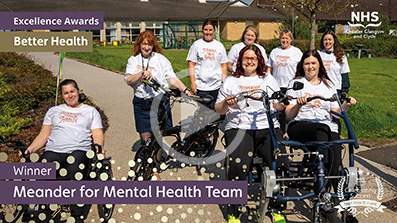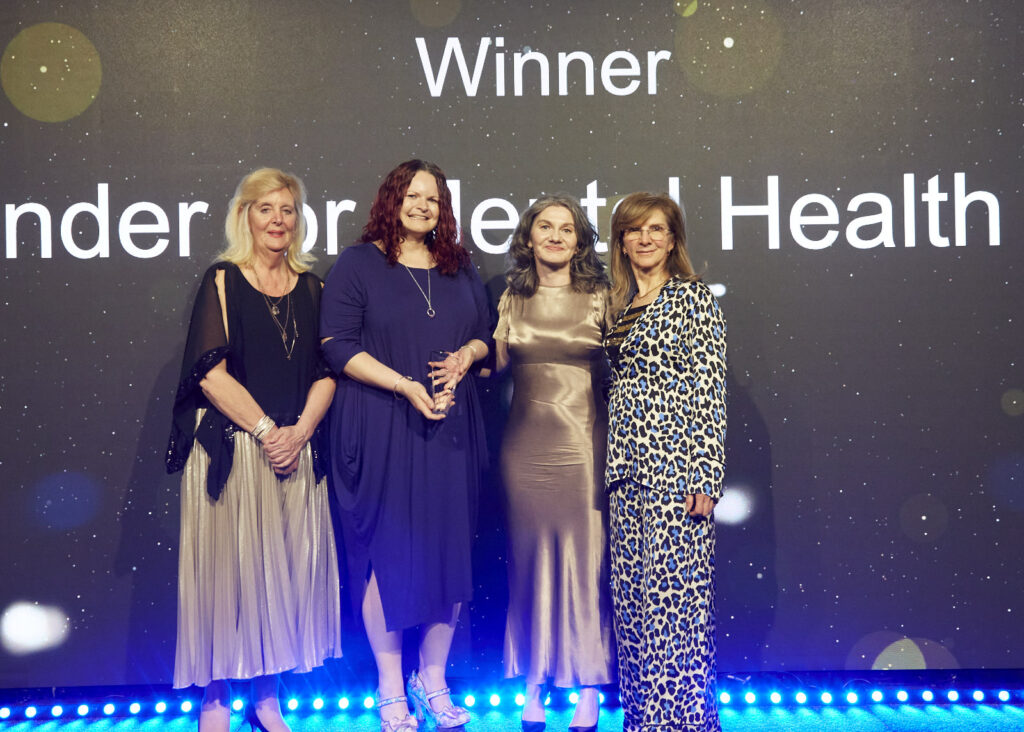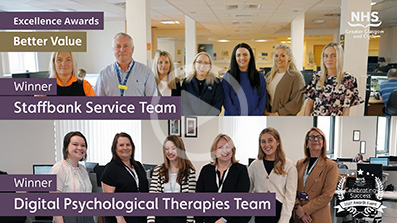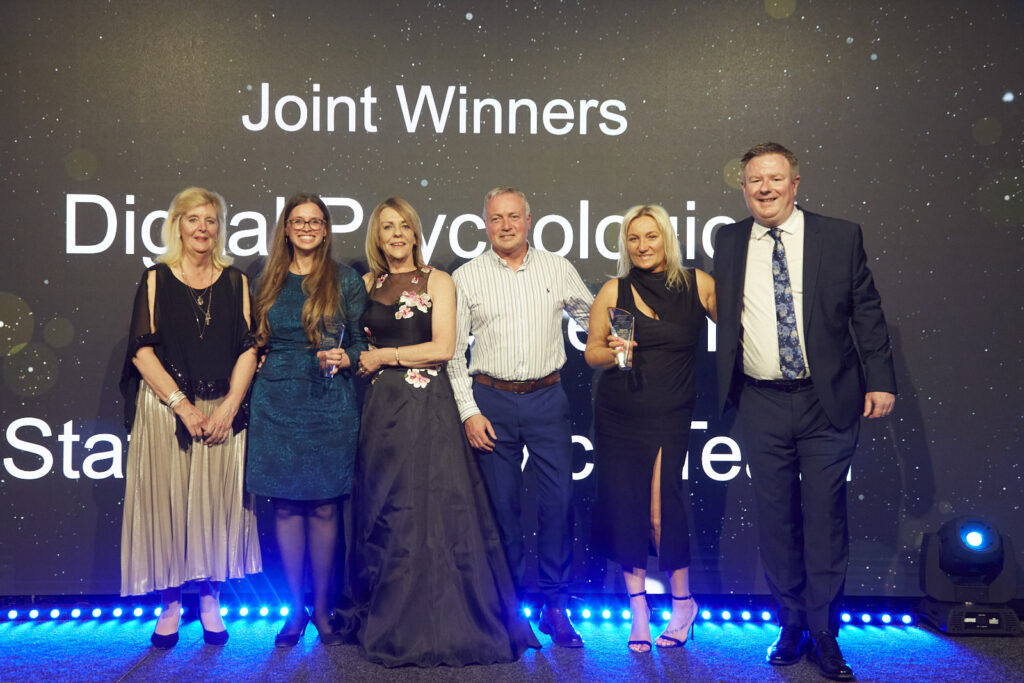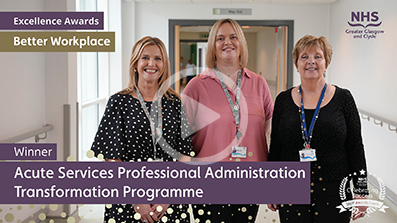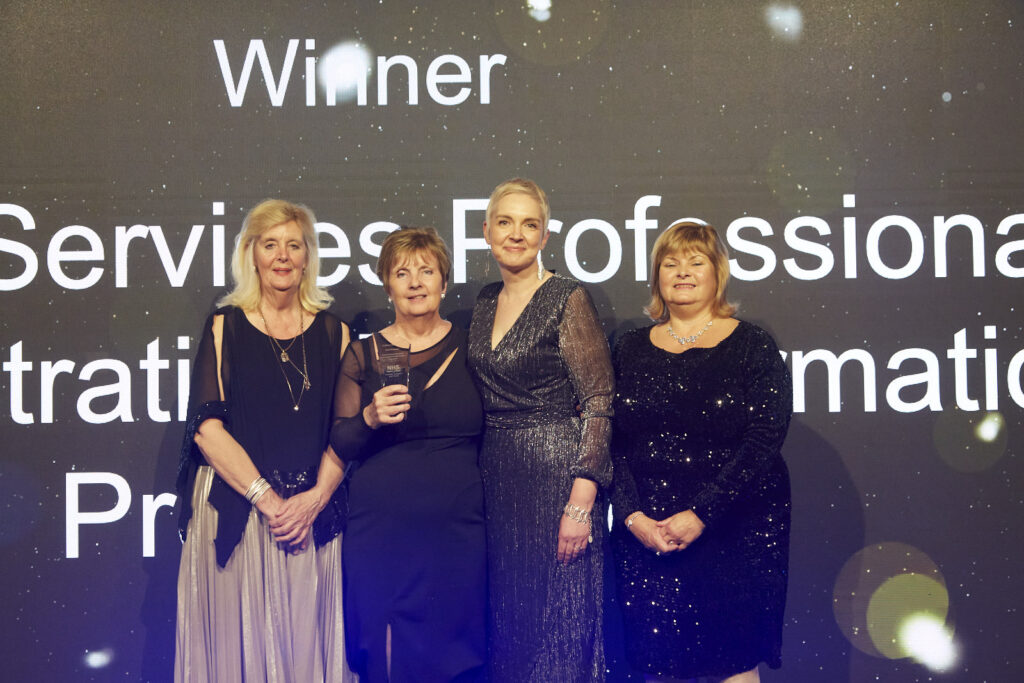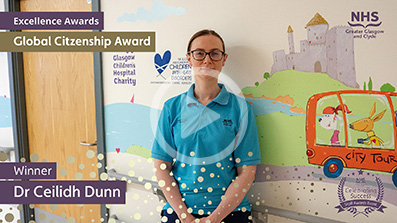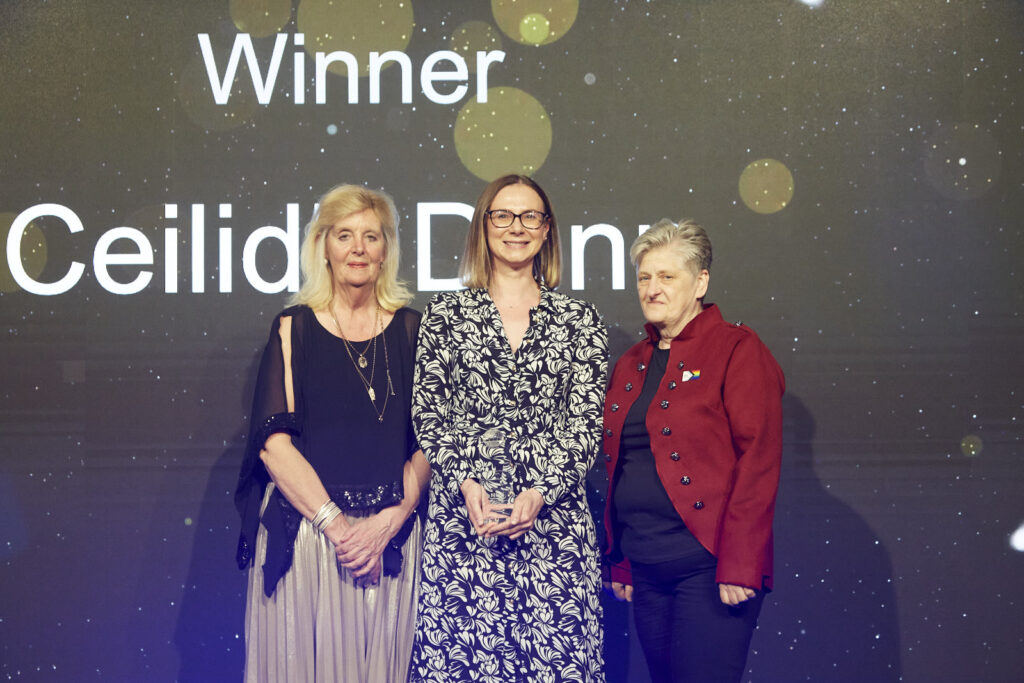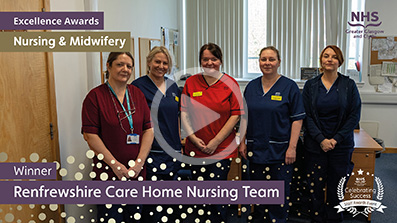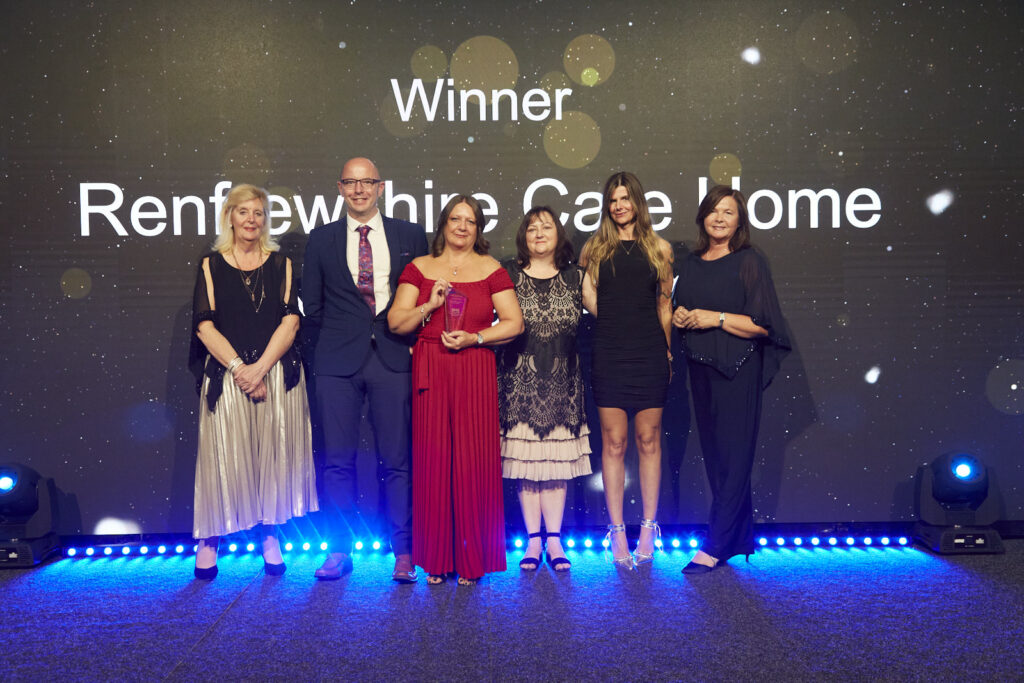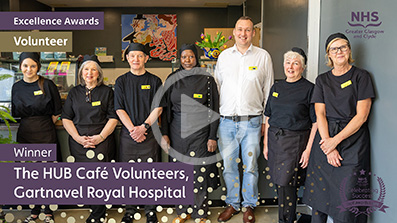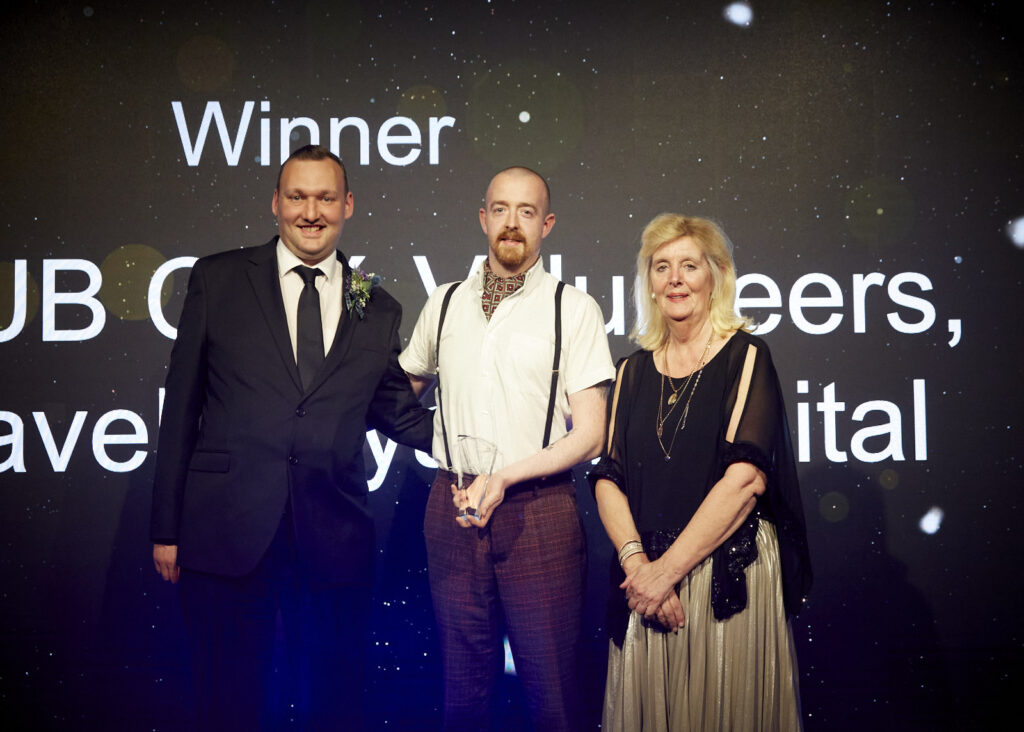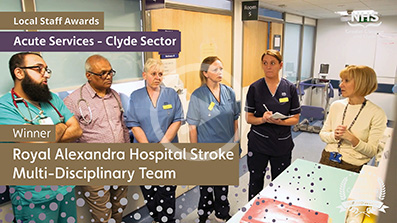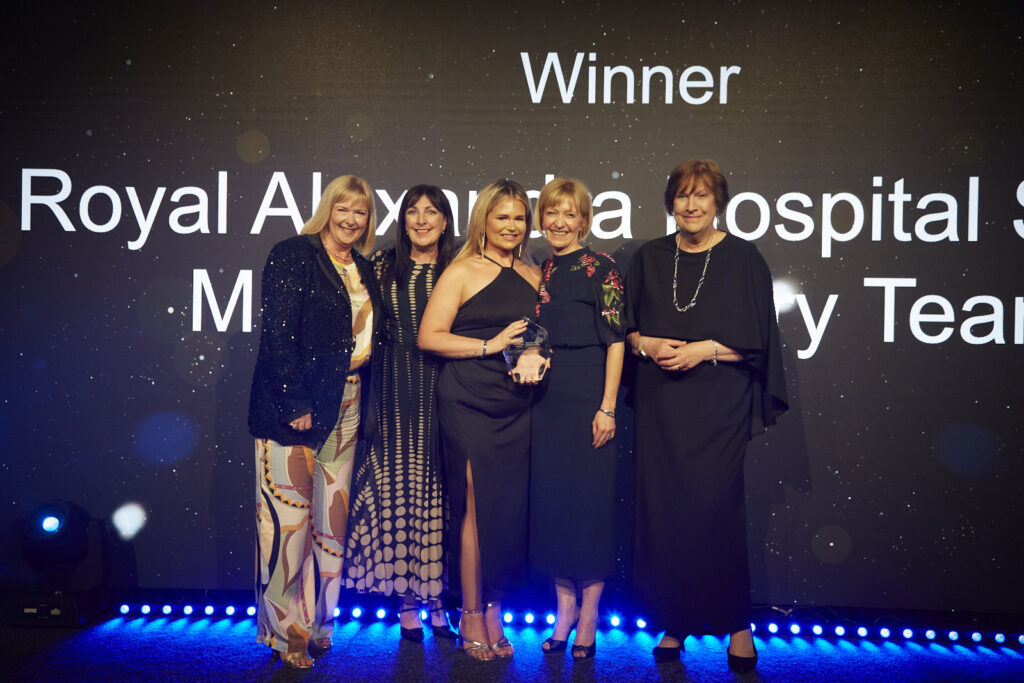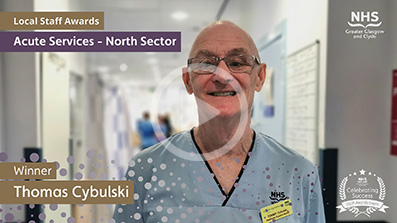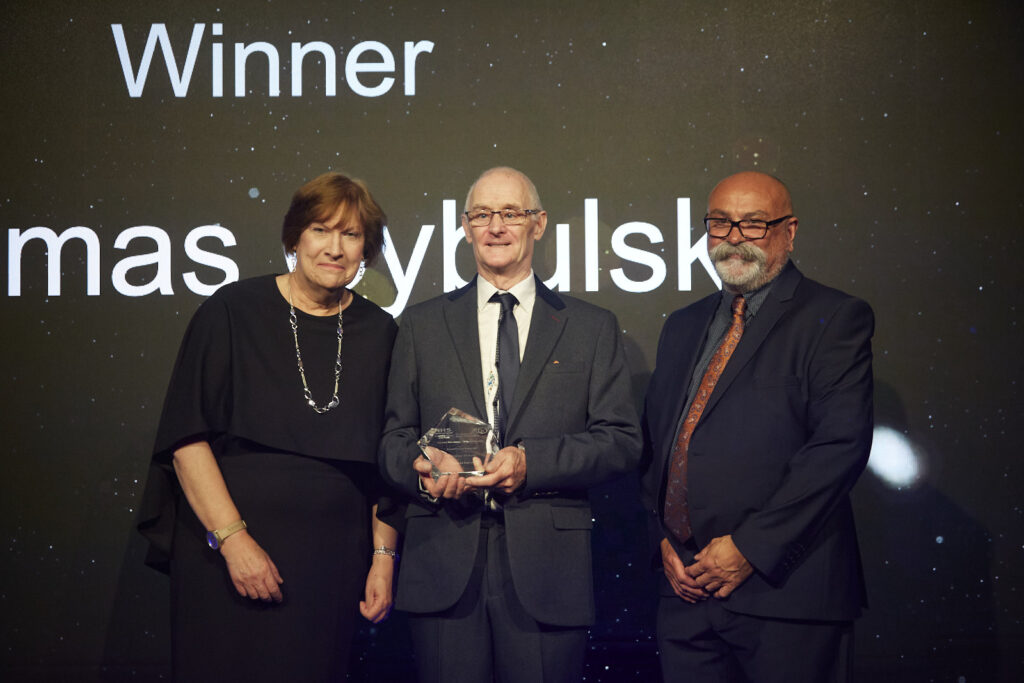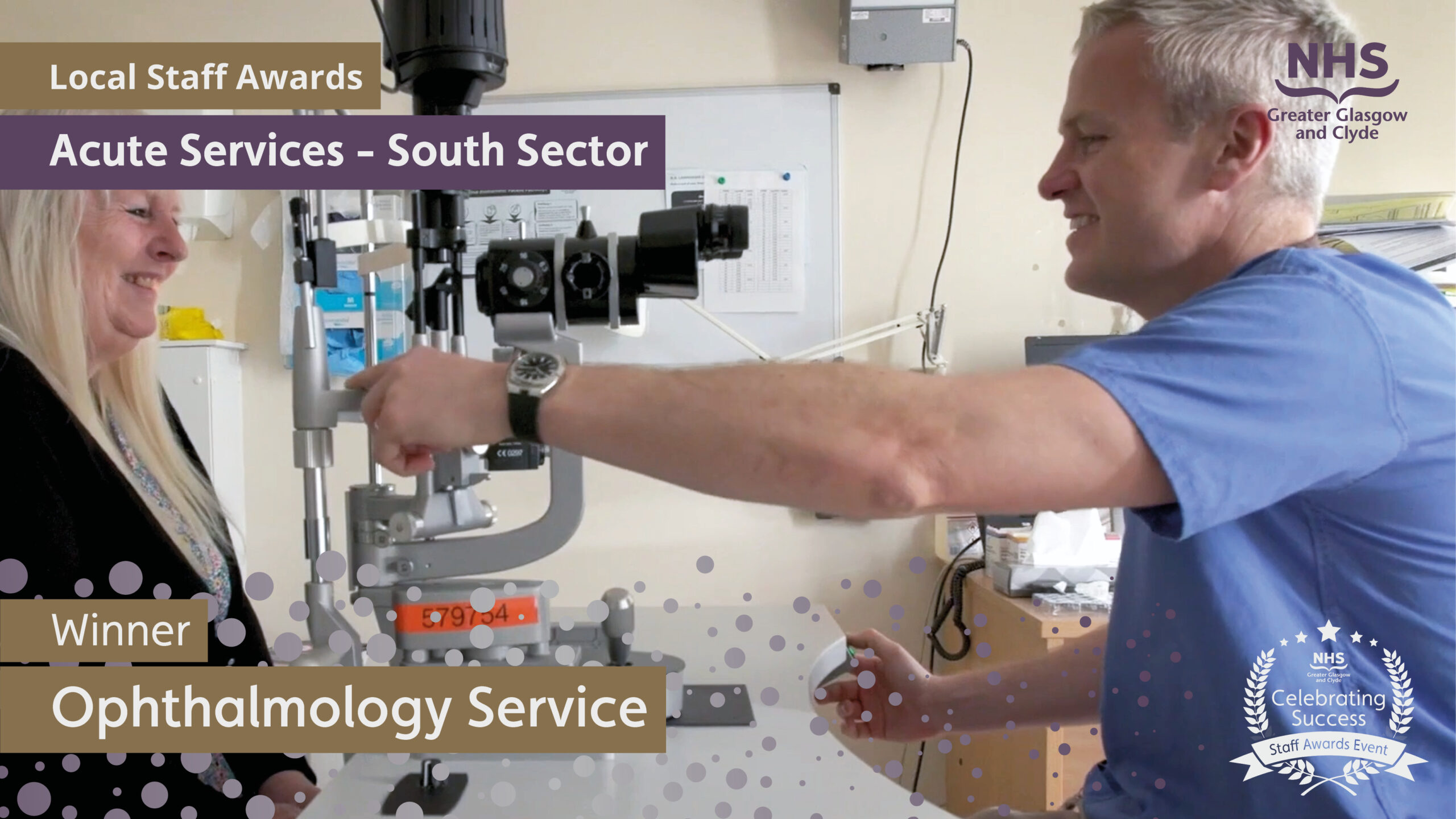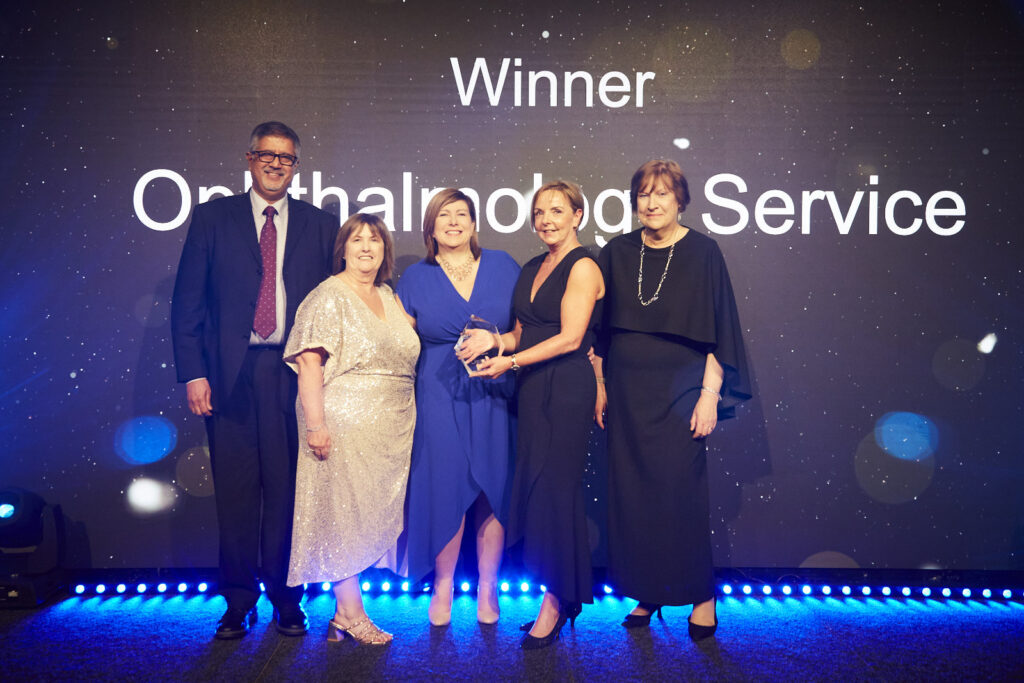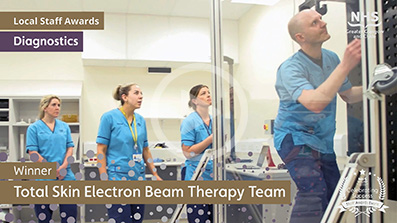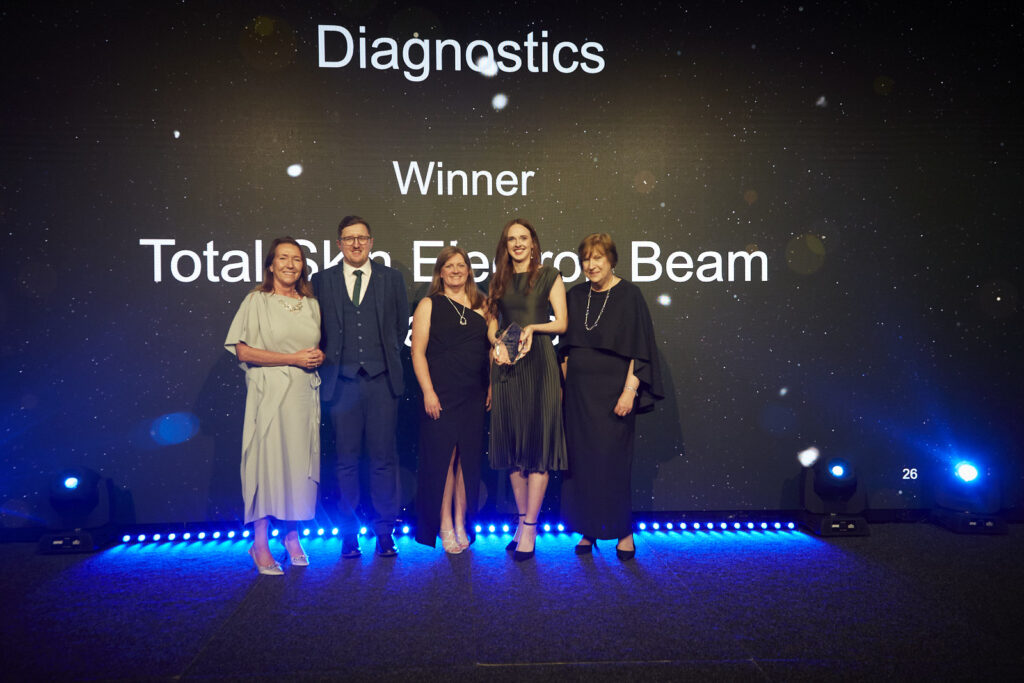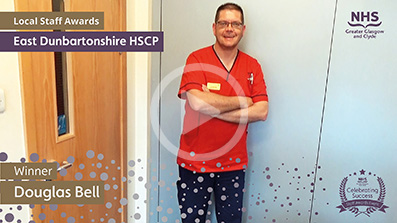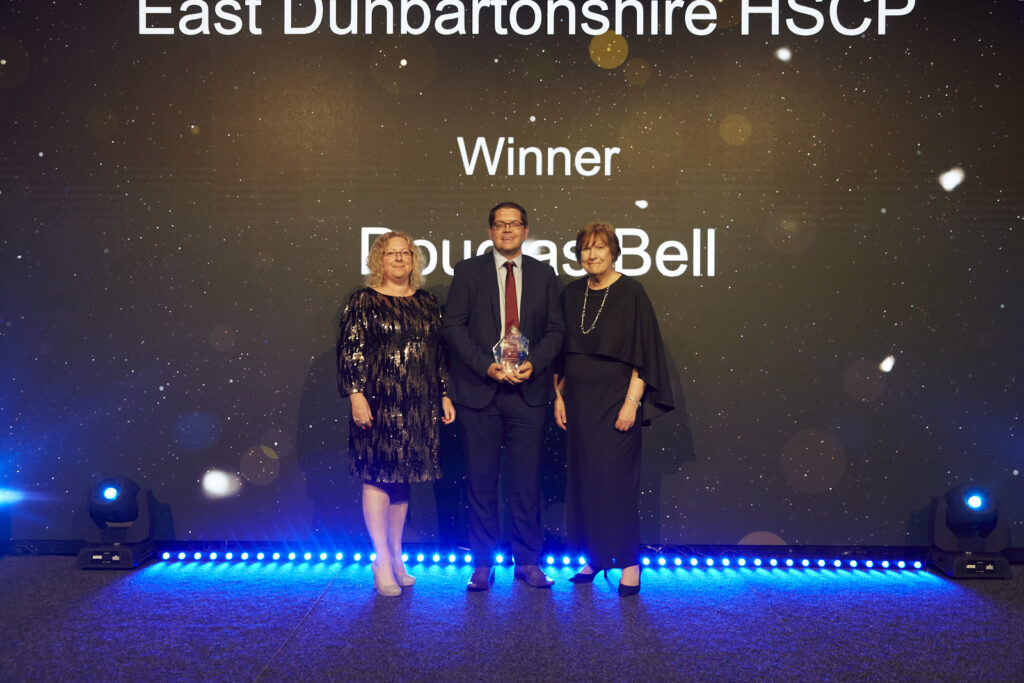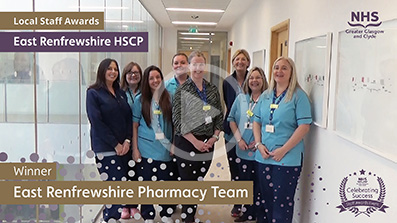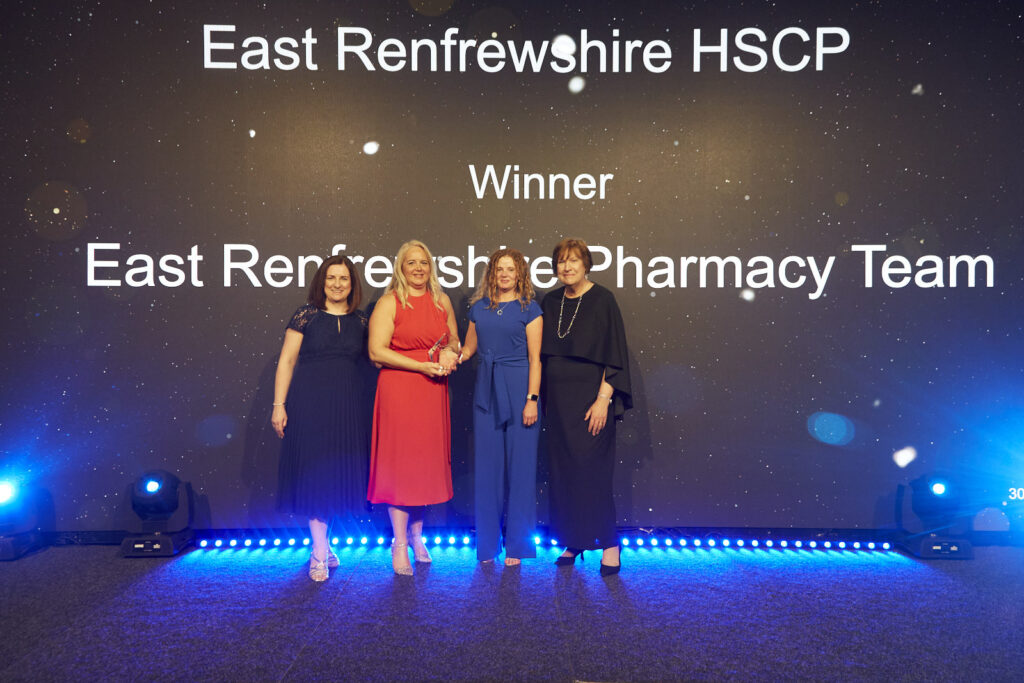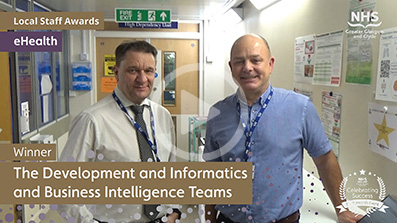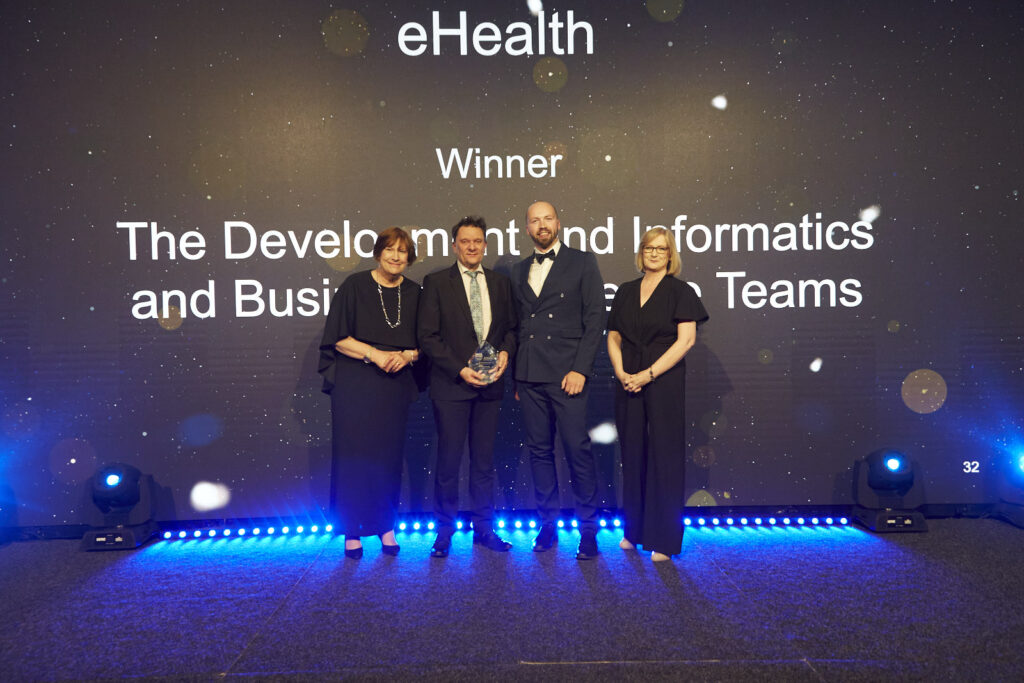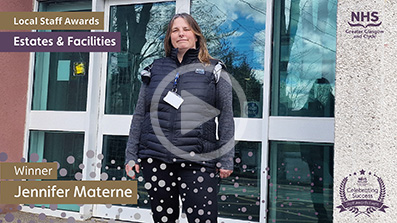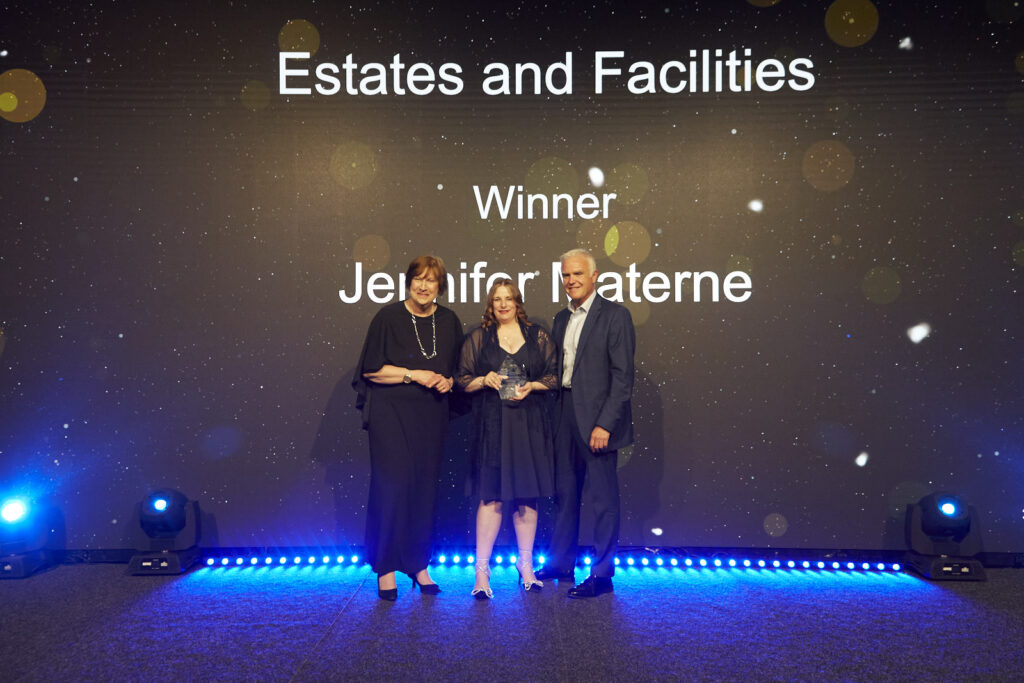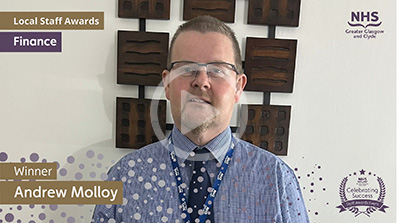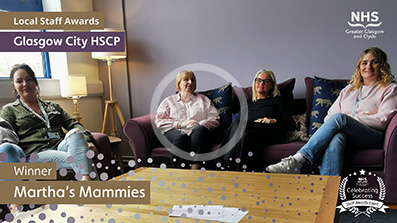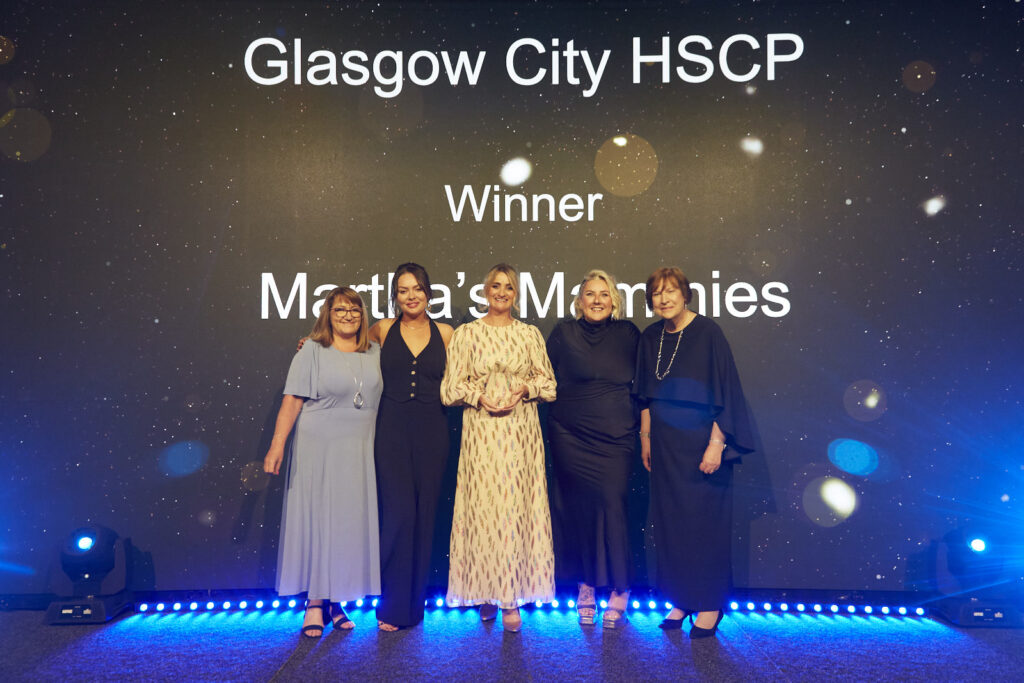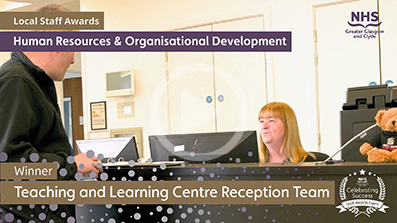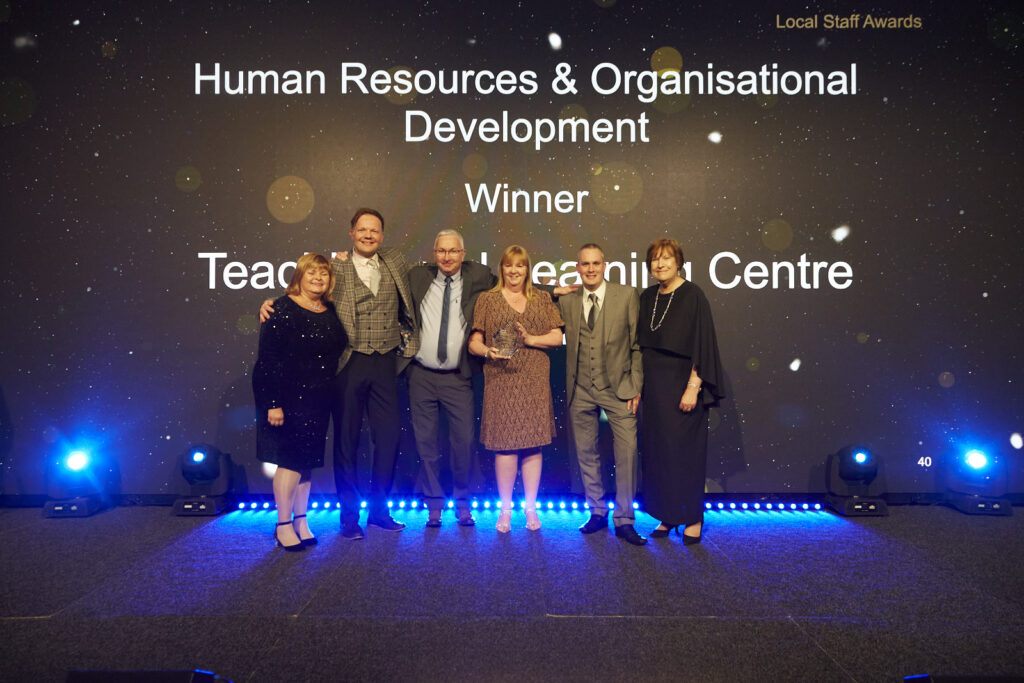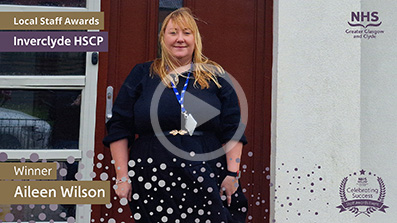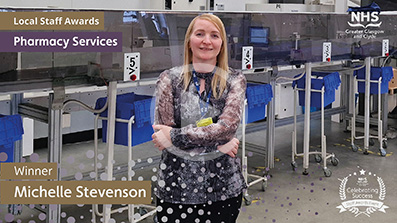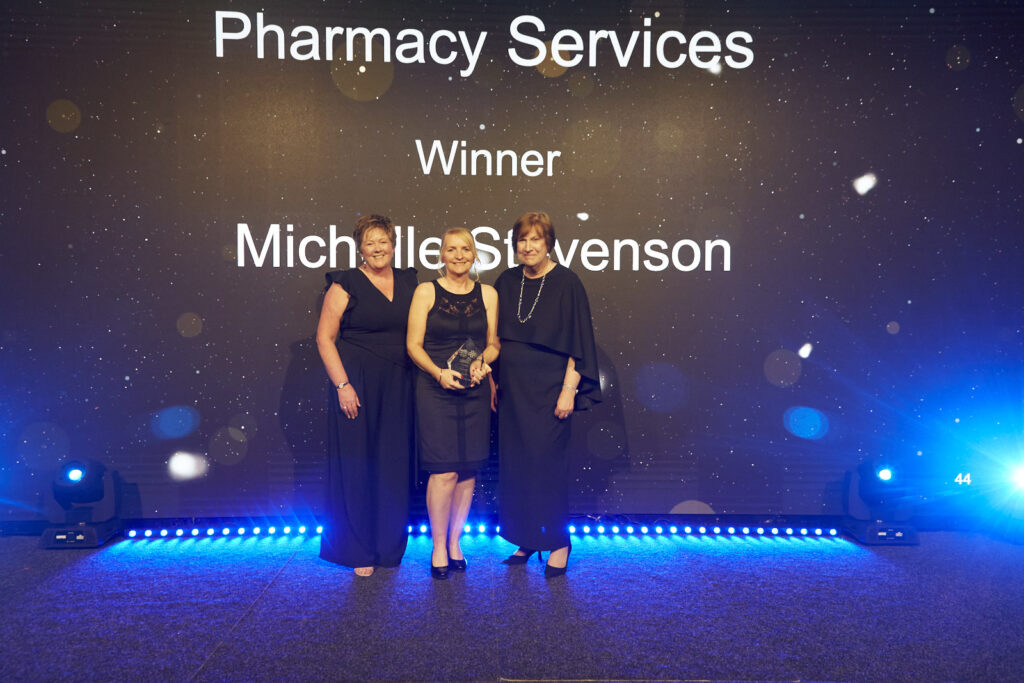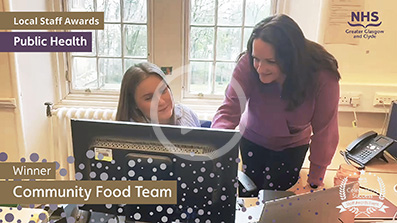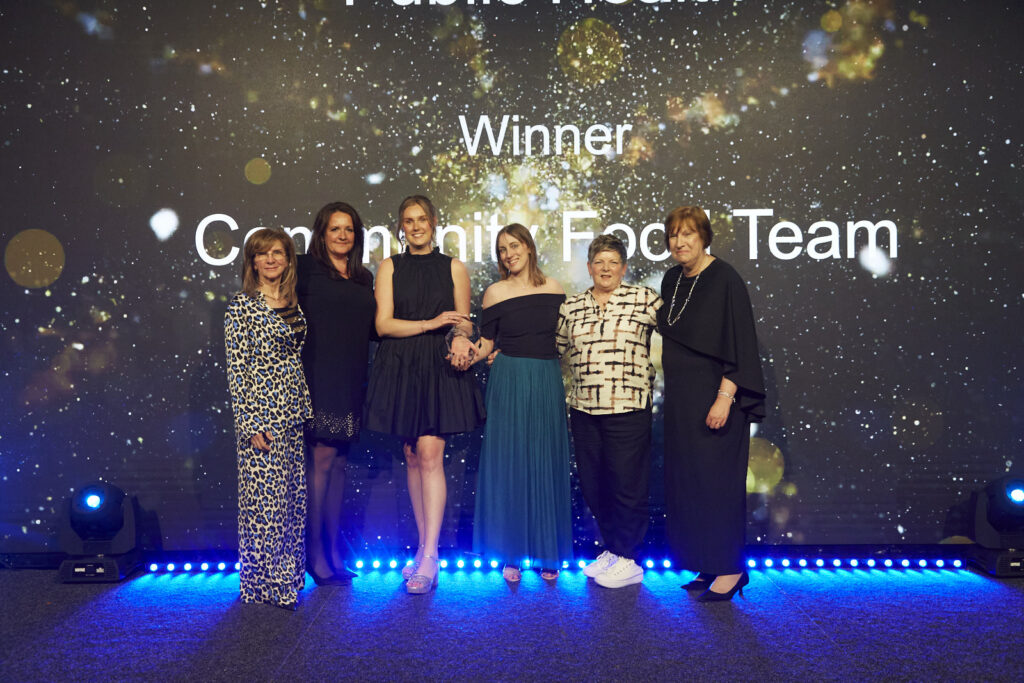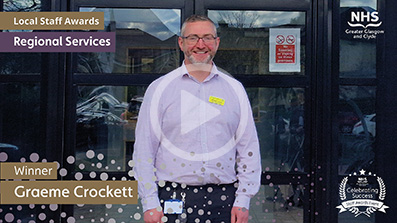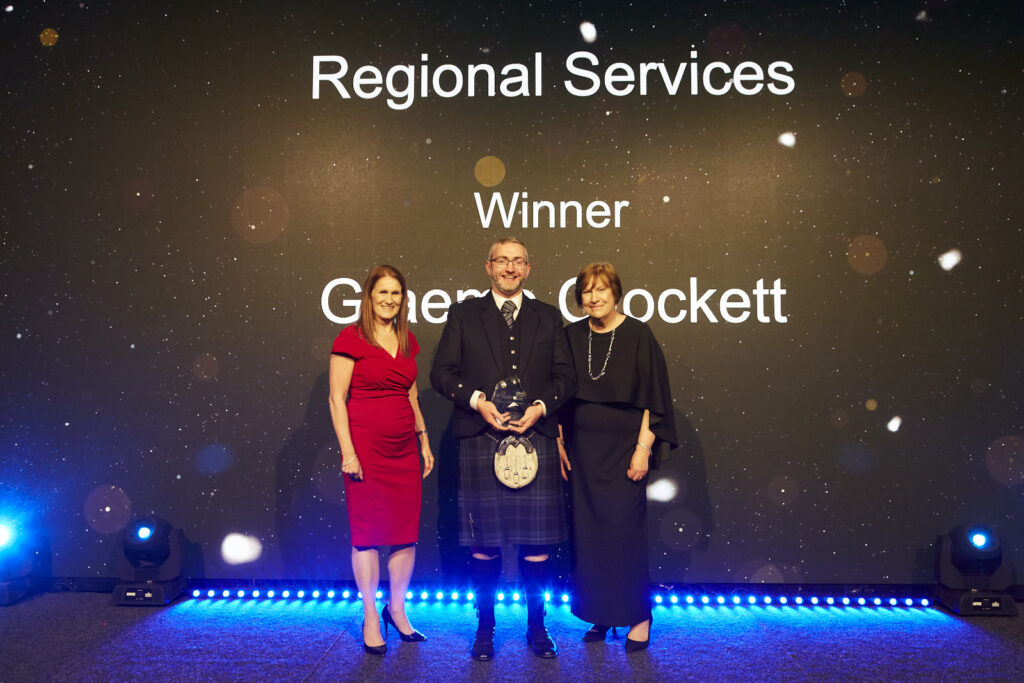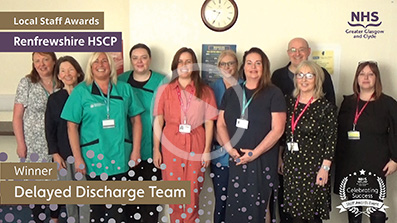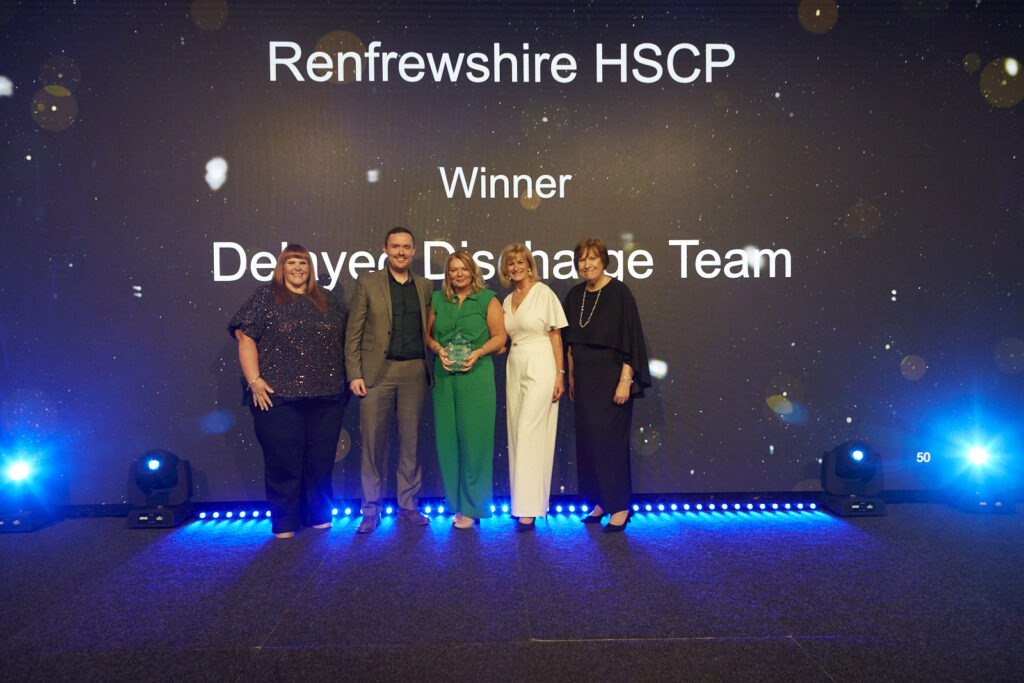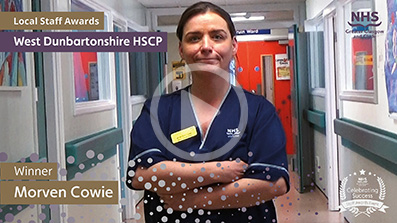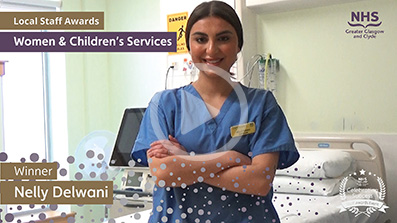Staff & Recruitment
The electronic Employee Support System (eESS) was introduced in 2018 meaning a fundamental change to working practices, with the introduction of the Manager Self Service function.
All Line Managers (Band 6 or above) will have access to eESS Manager Self Service and will be responsible for approving/declining any requests submitted by employees. Line Managers will also be able to process payroll transactions for staff for changes in employment.
eESS Managers – Going on leave?
- If you are going on leave and want to nominate a colleague to manage transactions in your absence you can set this up in Vacation Rules on your home screen (see SOP238 for further details). Please ensure you nominate a colleague in adherence with your Board’s policies and Standing Financial Instructions (e.g. in some Boards this may be a minimum of Band 7 and within the same business unit).
- If you want to grant another user access to manage your Worklist in your absence (see SOP239 for further details). This functionality is used to give another eESS user access to your Worklist. The user can manage your Worklist on your behalf
Fixed Term Contract extensions – If an employee’s fixed term contract is to be extended, please contact the eESS Support Team via the HR Connect Portal for this to be updated on the employee’s record, confirming the new date the contract is to be extended to (together with the employee Name and eESS ID)
Change of Contract Details – If an employee’s contracted hours or contract type is changing, ie. fixed term to permanent, please contact the eESS Support Team via the HR Connect Portal for this to be updated on the employee’s record, confirming the date the contract is changing (together with the employee Name and eESS ID)
Managers should also contact Payroll Officer for any changes being put through that have an impact on salary ( i.e. increasing/decreasing hours/band/terminations/annex 21 etc.) to save any under/over-payments being made
The eESS Manager Self Service section below shows some other examples of what Managers can do (role dependent):
Manager Self Service
- You can Approve, Reject, Return for Correction or Re-assign the request
- This transaction will be available to the employee to view once recorded
- Update Change Cost Centre
- Used in conjunction with “Change of Position” and “Change of Location”
- The transaction can be viewed by employee once recorded
- Only complete if there is no other Change i.e. Band, position etc
- Change of Position should be used if other changes required
- Change Position
For staff transfers due to promotion or move to another department
- As per the NHS GGC Policy – the Releasing Manager is responsible for completing the staff transfer transaction on eESS
- Maternity Leave
- Security Pass. Parking Permit, IT hardware, phones, keys, uniforms etc
- Complete after each episode of absence
Terminating an Employee
It is important that you complete the appropriate eESS transaction as soon as you become aware that a staff member is leaving (for example, when you are given notice of their plan to leave). This ensures the staff member is terminated on the correct date and that there are no salary overpayments.
If employee has only one position please refer to SOP – Termination (where only one post)
Where the employee has more than 1 position within the Organisation, please refer to SOP – Termination (multiple assignments).
For ease, please select Assignment Termination Step by Step Guide for detailed process.
- Assignment Number, start date. Job, Band etc
- Adoption Leave
- Maternity Leave
- Paternity Leave
Step-by-Step Guides
A number of step-by-step guides have been drafted to guide managers through some of the main transactions that require to be completed by eESS:
Proxy Users
In line with local arrangements there may be requirements to setup Proxy Users across NHS Greater Glasgow and Clyde (NHSGGC) for Manager Self Service.
A proxy user is someone who will transact self-service functions on behalf of:
- a line manager; or
- peer employees
- via self-service-based access.
Please refer to the Proxy User Briefing document which outlines the process and details the governance rules associated with Proxy Users. The document can be found on the HR Connect Portal. Completed forms should be returned via the portal.
Useful Information
Full access to all Employee Self Service Standard Operating Procedures and is available via the eESS National Webiste
Was this helpful?
General Genetic Clinics
Clinics are held on weekdays at Level 1A, Laboratory Medicine Building, Queen Elizabeth University Hospital, Glasgow. Peripheral Clinics are held, usually monthly, at the following locations:
- Crosshouse Hospital, Kilmarnock
- Houldsworth Centre, Wishaw
- Dumfries and Galloway Royal Infirmary, Dumfries
- Forth Valley Royal Hospital, Larbert
All referrals should be sent to the Clinical Genetics Service at Queen Elizabeth University Hospital (Laboratory Medicine ) and the patients will be offered an appointment at the nearest appropriate clinic, or in some situations, a virtual consultation.
Specialist Genetic Clinics
Prenatal Genetics Clinics
Consultant and Genetic Counsellor clinics are held at Clinical Genetics Department, Queen Elizabeth University Hospital
MDT Clinic alongside Fetal Medicine Service at Queen Elizabeth University Hospital
Cancer Genetics Clinics
Consultant and Genetic Counsellor clinics are held at Clinical Genetics Department, Queen Elizabeth University Hospital
At present, satellite clinics for cancer genetics are not being held at locations around the region, but patients will be offered remote consultation by video or telephone as an alternative to travelling to Glasgow to be seen face to face, as appropriate.
It is not always necessary to see patients with cancer genetics family history in clinic, and some referrals will be dealt with by letter.
Myotonic Dystrophy Clinics – Adults
Staff Grade Doctor delivers clinics, weekly at Clinical Genetics Department, Queen Elizabeth University Hospital, Glasgow. And at peripheral locations: University Hospital Crosshouse, Forth Valley Royal Hospital, The Houldsworth Centre in Wishaw, University Hospital Monklands. Dumfries and Galloway Royal Infirmary, Inverclyde Royal Hospital and Vale of Leven Hospital.
Multidisciplinary Clinics with Clinical Genetics Involvement
MDT clinics are listed below, please note that these clinics are not administered by Clinical Genetics.MDT clinics are listed below, please note that these clinics are not administered by Clinical Genetics.
Achondroplasia – Children
Jointly with paediatric endocrinology/neurosurgery/ENT/respiratory medicine/orthopaedics. 4-5 times per year, Royal Hospital for Children (RHC), Glasgow
Aortopathy – Children
Jointly with paediatric cardiology, paediatric rheumatology and clinical genetic input. Two times per year, RHC Glasgow
Cardiac Conditions – Adults and children- Direct referrals to ‘Inherited Cardiac Conditions’ on SCI-Gateway
Jointly with Consultant Cardiologists. Weekly, Clinical Genetics department, Queen Elizabeth University Hospital, Glasgow
Child Development
Jointly with community paediatricians in Child Development Centres, Greater Glasgow & Clyde/Lanarkshire/Ayrshire
Complex Bone Disorders- Children (direct referrals to paediatric endocrinology)
Jointly with paediatric endocrinologist. Twice monthly, RHC, Glasgow
Craniofacial Clinic – Children
Jointly with craniofacial team, Queen Elizabeth University Hospital, Glasgow
Dermatology- Children and Adults
Jointly with Consultant Dermatologists, Queen Elizabeth University Hospital, Glasgow
Differences in Sexual Development clinic – Children
Jointly with Paediatric Endocrinology, Clinical Psychology. Monthly, RHC, Glasgow
Endocrine cancer (familial paraganglioma, MEN, VHL)- Children and adults
Jointly with endocrinologists at Queen Elizabeth University Hospital, Glasgow. And with endocrinologists at RHC, Glasgow.
Endocrine/Genetic clinic – Children
Jointly with paediatric endocrinology. Two times per year, RHC Glasgow
Epilepsy – Children
Jointly with Paediatric Neurologists, RHC, Glasgow
Fetal Medicine
Jointly with Fetal Medicine Service, Queen Elizabeth University Hospital, Glasgow
Huntington Disease Management
Jointly with Consultant Neurologist. Institute for Neurological Sciences, Queen Elizabeth University Hospital, Glasgow
Neurofibromatosis 2 (Schwannomatosis)
Jointly with specialist ENT and skull base surgeons. Queen Elizabeth University Hospital, Glasgow
Neurogenetic/movement disorders – Adults
Jointly with Consultant Neurologist, Institute for Neurological Sciences, Queen Elizabeth University Hospital, Glasgow
Neurogenetics – Children
Jointly with Neurologists at RHC, Glasgow
Neuromuscular – Children and adults
Jointly with Paediatric Neurologists. Monthly to bimonthly. RHC Glasgow. No direct referrals.
Jointly with Adult Neurologists. Bimonthly to quarterly. Clinical Genetics, Queen Elizabeth University Hospital, Glasgow. No direct referrals.
Paediatric Rheumatology/Genetic clinic
Jointly with paediatric rheumatology. Two times a year, RHC Glasgow
Pre-implantation Genetic Diagnosis Clinic
Patients seen at Clinical Genetics clinics initially, and thereafter by Assisted Conception Service.
Was this helpful?
Chloe Cowan
- Interim Acting R&I Director
Email: Chloe.Cowan@ggc.scot.nhs.
Chloe Cowan
- Senior R&I Manager
Email: Chloe.Cowan@ggc.scot.nhs.uk
Dr Katriona Brooksbank
- Innovation Lead
Email: katriona.brooksbank2@ggc.scot.nhs.uk
Dr Melissa Robert
- Research & Innovation Systems & Operations Manager
Email: melissa.robert@ggc.scot.nhs.uk
Dr Caroline Watson
- Research Governance Manager
Email: Caroline.Watson@ggc.scot.nhs.uk
Dr Samantha Carmichael
- Lead Pharmacist
Email: Samantha.Carmichael@ggc.scot.nhs.uk
Dr Judith Godden
- Ethics Manager
Email: Judith.Godden@ggc.scot.nhs.uk
Charlie Mayor
- Safe Haven Manager
Email: Charlie.Mayor@ggc.scot.nhs.uk
Clare Orange
- Biorepository Manager
Email: clare.orange@ggc.scot.nhs.uk
Tracey Hopkins
- Lead Research Radiographer
Email: Tracey.Hopkins@ggc.scot.nhs.uk
Sandra Quinn
- Head of R&I Finance
Email: Sandra.Quinn2@ggc.scot.nhs.uk
Was this helpful?
As clinical staff may not be in the department or may be on leave, it may be preferable to contact via the genetics secretaries or generic email / phone rather than directly.
Telephone: 0141 354 9200 or 0141 354 9300
Email: ggc.genetic.secretaries@nhs.scot
Consultant Clinical Geneticists
- Dr Cheryl Longman (Neuromuscular genetics consultant)
- Prof Daniela Pilz
- Prof Edward Tobias (Senior Lecturer & Honorary Consultant)
- Dr Jenny Patterson
- Dr Karolina Pesz (lead clinician for prenatal diagnosis and preimplantation testing)
- Dr Mark Hamilton
- Dr Michael Yates
- Dr Pete Constantinou
- Dr Rosemarie Davidson (Lead Clinician for Cancer Genetics and for Huntington disease)
- Dr Ruth McGowan (Lead clinician for cardiac genetics, Lead clinician for DSD)
- Dr Sarah Wedderburn
- Dr Shelagh Joss (Lead clinician)
Speciality Doctor
- Dr Bob Ballantyne
Specialist Registrars
- Dr Kerra Templeton
- Dr Lisa Bryson
- Dr Rhiannon Mellis
- Dr Lucy Littlejohn
- Specialist Registrars usually remain with the department for the duration of their 4 year training programme or may rotate to other Scottish Clinical Genetics Centres
WoS Genetic Counsellors
- Abrar Buhlaiqah: Pre-registered Genetic Counsellor
- Angela Iley: Genetic Counsellor
- Camelia Harrison: Pre-registered Genetic Counsellor
- Irene Esteban: Genetic counsellor
- Lisa Hay: Genetic Counsellor
- Mark Longmuir (Head of Service): Lead Consultant Genetic Counsellor
- Nandini Somanathan: Principal Genetic Counsellor
- Somya Ellis: Genetic Counsellor
- Subhashini Crerar (she/her): Consultant Genetic Counsellor, Clinical Lead for Prenatal & Neurodegenerative Genetic Counselling. Specialities: Rare Disease, Neurogenetics and Prenatal
- Terix To: Pre-registered Genetic Counsellor
Cancer Genetic Counsellors
- Catherine Watt – Principal Genetic Counsellor
- Jennifer Gorrie – Genetic Counsellor
- Nicola Bradshaw – Macmillan Principal Genetic Counsellor
- The cancer genetics service provides comprehensive genetic counselling to individuals with a family history and / or a personal history of cancer, This process involves constructing detailed and confirmed family histories, risk assessment, arranging screening and or genetic analysis/ testing where appropriate and providing ongoing support. The service also participates in various U.K and international research studies.
Genetic Clinic HCSW’s
- Elaine Sprowl
- Sylvia McCreight
Was this helpful?
This year the Chair, Dr Lesley Thomson KC, presented two Chair’s Awards of Excellence which recognise outstanding achievement, expertise and dedication in patient care. As with all our awards, they celebrate the incredible efforts of our wonderful staff.
The Celebrating Success Event was held on 30th May 2024.
The winners were announced live on the night on our social media channels (follow the #ggcawards tag).
You can find out who the winners were and also view their photos and videos below.
Congratulations to all our winners!
Dr Mike Basler and his Team
Dr Mike Basler is a Consultant Anaesthetist at the Glasgow Royal Infirmary. Since 2017, Dr Basler has helped provide anaesthetic care to patients in Ghana as part of project, Resurge Africa, while organising and leading burns, resuscitation, and regional anaesthesia courses for the local staff.
This year was Dr Basler’s last trip as an NHS consultant before he retires and he pulled together a larger team of anaesthetic consultants and trainees to provide a more ambitious programme of teaching along with anaesthetic support in theatre.
Dr Basler has worked tirelessly for many years on this project and provided high quality clinical care in challenging circumstances, always with an infectious level of enthusiasm.
He has also made it his goal to ensure a sustainable relationship between the Glasgow and Accra anaesthetics departments so that these training and clinical care initiatives can continue successfully after his retirement.

Teenage and Young Adult Cancer Team
The Teenage and Young Adult Cancer Team is based in the Beatson West of Scotland Cancer Care. The team provides outstanding support for their patients and their families during a highly stressful time in their lives.
This included enabling young people to get together with others of a similar age who are also going through a cancer journey.
When an annual and much-loved charity peer-to-peer support event fell through in 2023, this team stepped in to arrange, organise, facilitate, and support a group of young people from all over Scotland to attend a weekend-long event at an outward-bound centre instead. It was a great success and a trip to remember for everyone involved.

Was this helpful?
The William Cullen Prize for Excellence In Teaching and the William Cullen Prize for Service Innovation are awarded in collaboration with the Royal College of Physicians in Edinburgh.
The Celebrating Success Event was held on 30th May 2024.
The winners were announced live on the night on our social media channels (follow the #ggcawards tag).
You can find out who the winners were and also view their photos and videos below.
Congratulations to all our winners!
William Cullen Prize for Innovation – Joint Winners
The leadership of Professor Keith Muir and Dr Wazim Izzath has been crucial in moving forward a very challenging, and time critical treatment paradigm and this award recognises the hard work moving this treatment pathway over the past 4 years. Stroke is one of Glasgow’s ‘big three’ killers alongside cancer and heart disease and over the past 18 months stroke thrombectomy has developed on the QEUH site.
The Stroke service initially starting as a test of change, broadening to a service for local Queen Elizabeth patients and in the past month has moved forward for a service for the West of Scotland. The service development has been transformative for those patients with life threatening severe stroke. It would not have been possible without the commitment of multiple teams involved including ED, Stroke, neuro-anaesthetics and diagnostic and interventional neuroradiology.

As part of the Realistic Medicine work programme in NHS Greater Glasgow and Clyde, Judith Roulston has developed and implemented Treatment Escalation Plans (TEPs) in the Beatson in-patient service. This area of work has contributed to reducing inter-hospital critical care transfers, improved communications by both patients and staff, and has promoted patient centred shared decision making in Oncology services.
This innovation is particularly evident in the Beatson Enhanced Care Unit where there is a focus on all patients having a TEP in place and ongoing discussions to support their wishes. Judith works with a wider team within the Beatson Centre and across NHSGGC to enable staff to have confidence and competence to have the necessary realistic conversations with patients.
William Cullen Prize for Education – Dr Lucy Carrick
This year’s William Cullen Prize for Education is Dr Lucy Carrick.
Dr Carrick is a Consultant Psychiatrist and Clinical Director in Gartnavel Royal Hospital. The psychiatry team at Gartnavel Royal Hospital train foundation, core and specialist trainees, and the responses in the Scottish Trainee Survey from 2023 demonstrate how much the unit values its trainees.
This award is a reflection on the hard work of the Educational and Clinical Supervisors as well as the administration and operations team who have worked hard to provide a positive training experience.
At a time when we are looking to support foundation training in Greater Glasgow and Clyde, the feedback from Foundation trainees was particularly gratifying in terms of key aspects such as handover, induction and the educational environment and is an indication of the focus on improving training and clinical care within the department.

Was this helpful?
The eESS Self-Service module will be a fundamental change to working practices for employees.
eESS Employee Self Service
Employees will now have access to view and update the following information:
Please note – All Personal Sensitive Information is held securely within eESS. Any updates or changes to this type of information is held in confidence, and will not be notified to your manager, HR or anyone else using the system.
- Equality and diversity information – age, gender, religion etc – Please check/update. You can do so by following Change Personal Information – NHS Scotland eESS. This enables us to continuously improve as an equal opportunities employer. It ensures the right resources, facilities and support are available for you. Further information can be found at Employee Equality Data – NHSGGC
- Name, address, date of birth etc
- Always use “Type” Primary Home Country address
- Emergency Contact details/Next of Kin details
- Certificates, Highers, Degrees etc
- Line Manager will approve once evidence is presented
- Includes self employed, ad hoc work and contracted work
- Adoption Leave
- Matching certificate must be retained by line manager
- Maternity Leave
- MATB1 certificate must be retained by line manager
- Paternity Leave
- Copy of MATB1 must be retained by line manager
Useful Information
Full access to all Employee Self Service Standard Operating Procedures and eLearning video’s is available via the eESS National website
Was this helpful?
Our dedicated teams and individuals were nominated for the prestigious NHSGGC Excellence Awards by patients, visitors and staff. All of our staff have gone above and beyond in the past year and we asked to hear about your experience of outstanding care and for your nominations.
There are 7 categories in our Excellence Awards and the winners were announced at the Celebrating Success Event on 30th May 2024.
The winners were announced live on the night on our social media channels (follow the #ggcawards tag).
You can find out who the Gold Winners were, read about the Silver Winners who were shortlisted, and also view photos and videos in each of the categories below.
Congratulations to all our winners!
Better Care
This award recognises staff who provide and contribute towards incredible patient care improving everyday practices across NHSGGC.
Gold Winner – Transoral Robotic Surgery
The Transoral Robotic Service (TORS) was set up at the Queen Elizabeth University Hospital in 2022. It provides a minimally invasive option for patients which results in a reduced length of hospital stay, quicker recovery and a reduced functional impact on swallowing. In addition, it can provide a therapeutic surgical option to patients with early-stage oropharyngeal cancers.
In the first year, the team treated 25 patients, and this doubled to 50 patients in 2023. They are now working on establishing a regional service to provide TORS for other patients in Scotland.
This means that within 2 years, the Glasgow TORS team has become the 3rd largest provider of TORS in the United Kingdom and the only therapeutic centre in Scotland.
Well done to the team for their outstanding work in delivering patient centred care.

Silver Winners
The Teenage and Young Adult Cancer Team
Based in the Beatson West of Scotland Cancer Care, the Teenage and Young Adult Cancer Team has been nominated due to the outstanding support they have given to patients and their families during a highly stressful time in their lives.
This included enabling young people to get together with others of a similar age who are also going through a cancer journey.
When an annual and much-loved charity peer-to-peer support event fell through in 2023, the team stepped in to organise a weekend-long event at an outward-bound centre instead, arranging for a group of young people from all over Scotland to attend and giving them the support they needed. It was a great success and a trip to remember for everyone involved.
The teens’ feedback said it all. They said:
“It was honestly the most amazing weekend, and I am missing being away already. This will be a weekend that will be spoken about for a long time to come.”
“This is the best thing I’ve ever done! I’ve been to another residential and this was by far the best. We were really lucky to have such a great group and I now have friends that I didn’t know I needed.”

Dr Ann-Margaret Little, Histocompatibility and Immunogenetics Team
The wait for a new kidney is a long, stressful experience for patients – and if someone is unfortunate to have developed antibodies in the blood that means they would be at risk of early severe rejection, that wait could be even longer.
Dr Little wanted to change that – she wanted to use new technology and the expertise of her team within the Histocompatibility and Immunogenetics (H&I) Laboratory to analyse the profile of these different antibodies in individual patients and use that information to identify more potentially compatible kidneys and reduce the risk of rejection.
As a result of this work, the strategy is now embedded in the process for all kidney transplant candidates in Scotland and probably more than 100 patients including children have received a kidney transplant who might not have otherwise.

Falling Stars Initiative, Cuthbertson Ward
The falling stars initiative was introduced to reduce the number of falls on an older adult dementia assessment ward by 30%.
The team introduced several measures including a traffic light mobility chart to provide information on falls risk for each person on their bedroom door.
Additionally, prompt cards were introduced to provide information highlighting fall risks and preventative measures including information relating to activities/behaviour, considerations and distraction techniques that could result in a fall. The project also aimed to improve staff awareness and knowledge on falls prevention and management.
In the six months prior to implementing the initiatives, the ward had 133 falls. In the six months following this, the ward saw falls reduce by 32% to record 90 falls within the same period – a great achievement.

Dr Claire Patterson
Dr Claire Paterson has been influential in improving cancer care and outcomes for head and neck cancer in the West of Scotland.
Dr Paterson undertakes the Head and Neck Oncology Team leadership role while organising regular update meetings for staff and has improved recruitment results in this area.
Claire regularly goes above and beyond the day-to-day clinical work and drives optimal clinical care and service by improving research, she regularly implements changes in practice while being aware of the need to audit, reflect and publish.
Thanks to her, the team keep up to date with evidence-based head and neck cancer management and our patients have access and support to be involved in clinical trials.
Better Health
This award commends staff who have implemented an initiative to improve the health and wellbeing of patients, the public and/or staff.
Gold Winner – Meander For Mental Health
Meander for Mental Health came from the Design in the Dale project led by the physiotherapy team at Leverndale Hospital, with the aim of promoting walking as a way of managing mental health, to reduce the stigma of mental illness and to bring the hospital and its local community together.
The project has grown over the past four years and now has two other events, Mambo for Mental Health and Pedal for Progress, and the group continues to lead on promoting physical activity across the site and opening opportunities that benefit the hospital and its local community.
Three main walking routes in and around the hospital are used by the team and each of the events organised has seen more than 150 participants from the hospital and local community, and the team have been able to use feedback from participants to shape their upcoming events, with each building on the successes of those that have gone before.

Silver Winners
The Mobile Global Health Clinic
The Forensic Community Health and Learning Disability Teams look after adults aged 18-65 with severe and enduring mental health problems and who have a history of serious offending, across Greater Glasgow and Clyde.
The teams of nurses had an aim of increasing uptake of and engagement with annual physical health checks and screening through Global Health Clinics, which provide person-centred packages of care to help reduce health inequalities.
During the Covid pandemic, the teams found many patients were willing to have the clinic at their home, and as a result they saw engagement rise to 81% in 2022, compared with only 11% when the clinics first started in 2014. The number of patients engaging with the service has increased each year.
These clinics allow onward referrals to be made to primary care and national screening programmes, improving patient care and helping to tackle health inequalities.

Specialist Treatment for Addressing Risk (STAR) Service
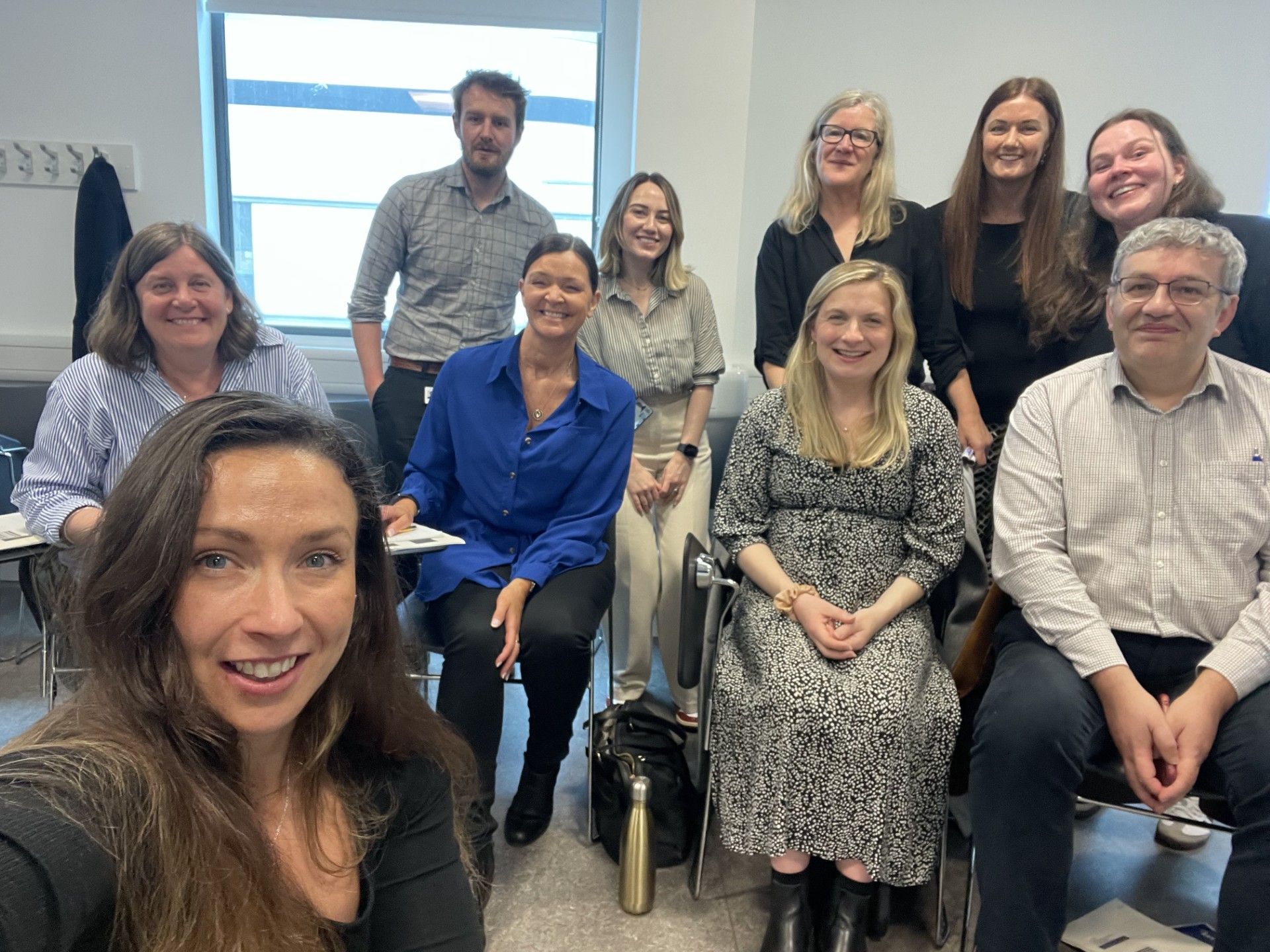
The Directorate of Forensic Mental Health and Learning Disability offers care and support for patients experiencing a range of learning disabilities and mental disorders. However, there are some patients whose condition means that they pose a high risk to those around them.
STAR is a team that offers highly specialised care for these people, delivered by a dedicated team of Clinical Psychologists. Working alongside other disciplines within the directorate, as well as healthcare professionals outside NHSGGC, criminal justice social workers and law enforcement officers, the team provides individualised care tailored to every patient’s needs.
This approach increases the likelihood of successful outcomes by reducing reoffending rates, improving mental health of service users, and enhancing their overall well-being. And in turn, it contributes to an overall sense of safer neighbourhoods and community cohesion.

Meander For Mental Health
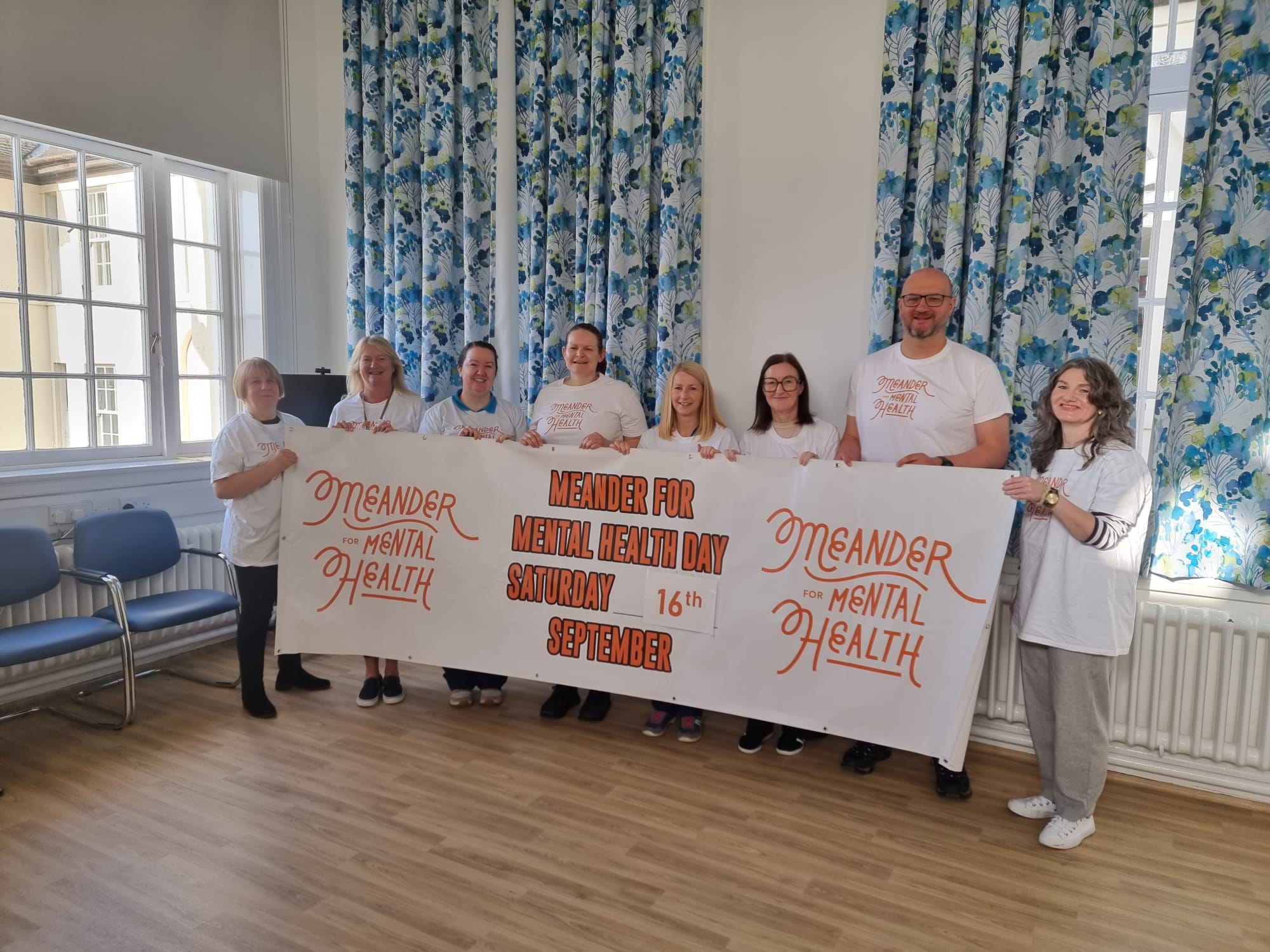
Meander for Mental Health came from the Design in the Dale project led by the physiotherapy team at Leverndale Hospital, with the aim of promoting walking as a way of managing mental health, to reduce the stigma of mental illness and to bring the hospital and its local community together.
The project has grown over the past four years and now has two other events, Mambo for Mental Health and Pedal for Progress, and the group continues to lead on promoting physical activity across the site and opening opportunities that benefit the hospital and its local community.
Three main walking routes in and around the hospital are used by the team and each of the events organised has seen more than 150 participants from the hospital and local community, and the team have been able to use feedback from participants to shape their upcoming events, with each building on the successes of those that have gone before.
Better Value
This award is for staff who have increased efficiencies taking a new approach to work making better use of resources.
Gold Joint Winners – Digital Psychological Therapies and the Staffbank Service Team
Reconfiguring some psychological therapy services became a significant challenge due to Covid-19 and long waiting times, but the creation of a centralised team, delivering psychological therapies digitally via the NHS Near Me/Attend Anywhere system has transformed how services are delivered.
Since June 2023, when the team went live, they have been able to establish systems and processes which allows them to work flexibly across multiple teams with long waiting time pressures.
By embracing digital technology, the service has been able to deliver measurable benefits in terms of improving treating the number of people waiting over the 18-week national standard.
It is also making this way of delivering this type of service to appropriate patients more mainstream, allowing local teams to focus on patients who require their therapy delivered face-to-face in clinical settings.
While using the new model, the team continue to monitor, refine and streamline their processes to ensure they deliver a service which benefits patients.

The sheer diversity and large number of staffing requests to ensure services continue to deliver healthcare makes the Staffbank Service worthy of recognition. Any requests to support services always turn to the Bank Team, who are the largest in the country, and deal with around 10,000 shifts per week being booked via the bank office.
The team have provided a rapid and efficient response to mass recruitment needs, with more than 4,000 Healthcare Support Workers on boarded and hundreds cross-trained and reducing reliance on the use of agency staff in some services.
As well as this, the service was approached by the Public Health Vaccination Programme to support the training of vaccinators and also provided major staffing support to ensure that the schools immunisation programme could proceed.
Overall, the team have provided a vital service in challenging circumstances, ensuring that the needs of patients and service delivery are met in the most appropriate ways, ensuring continuity of care.
Silver Winners
Karen Thomson, Consultant Sonographer
Karen joined the Diagnostic Imaging team in February 2023 as a Consultant Sonographer. At the time, the service was still recovering from the pandemic, and waits for Ultrasounds were still longer than the team would have hoped for. However, in barely a year, Karen has been instrumental in reducing this waiting list significantly, cutting the longest waits by more than half.
In addition, she has completed an in-depth service review and implemented a focused strategic plan by upskilling Sonographers in examinations, allowing for more complex scans to be undertaken by a wider group of Sonographers.
Karen’s knowledge, skills and experience along with her approachable bubbly personality leadership style has built a strong team dynamic and that, along with her patient-focused approach, has been integral to improving the waiting list and patient outcomes.
Better Workplace
This award recognises the often unseen work of our staff who help make NHSGGC a better workplace, improving the culture and supporting colleagues.
Gold Winner – Acute Services Professional Administration Transformation Programme
The Acute Services Professional Administration Transformation Programme was set up in 2018 to recognise the central role that administrative services play in supporting patient-centred care, and to ensure the Board’s patient administrative services were operating efficiently and effectively. Last year it was refreshed to highlight administration as a professional career role within Acute Services.
The team has embraced partnership working and new technologies with the aim of creating a better workplace. At the outset, they delivered more than 72 roadshows to communicate and engage with staff. The programme has improved training and development opportunities for clinical administration staff and helped them harmonise ways of working and management arrangements.
This has included the Smarter Ways of Working Project, which utilises technologies to maximise support and make administrative staff more productive, as well as the development of an Appointment Planners pilot for Cardiology and Paediatric Surgery.
Silver Winners
Staff Hardship Fund
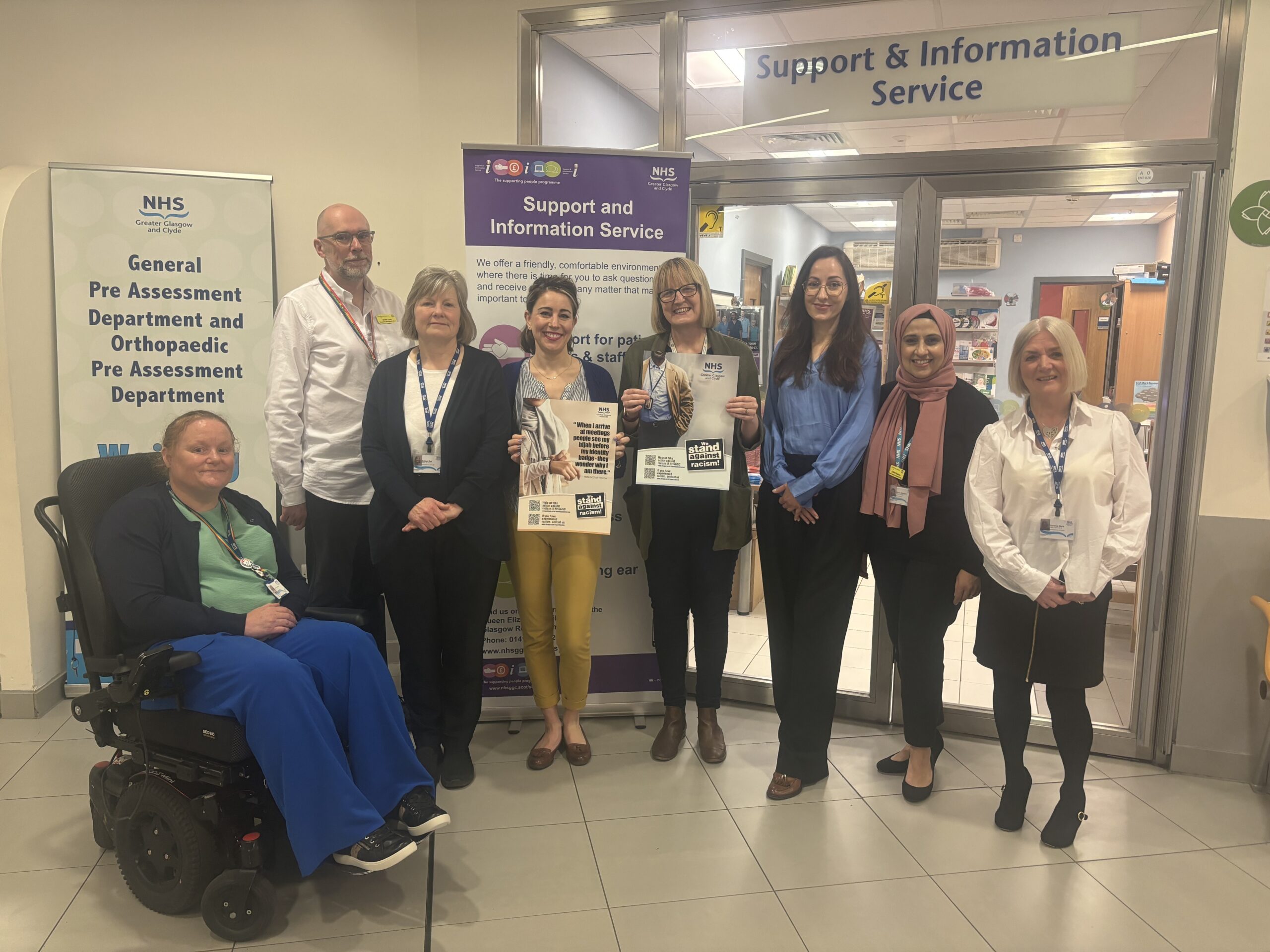
The Staff Hardship Fund was set up by the Support and Information Service to help mitigate the impact of the cost-of-living crisis on NHSGGC staff by offering a compassionate response to short-term financial difficulties, as part of our Staff Health Strategy action plan 2023/24.
Small grants of up to £100 are distributed to staff who are experiencing financial hardship. These grants are one-off payments are staff are not required to repay them. The fund also provides wrap-around support as part of the application process, with support offered from our in-house trained SIS advisors.
Staff can be further referred to our Financial Inclusion Partnership Services, where they can get access to financial advice and further grants and, if need be, benefits advice.
The fund can be accessed via self-referral by staff, Human Resources, staff-side representatives or Occupational Health, and staff are supported in a holistic and compassionate manner.
By end of December 2023 the fund had made 440 awards and provided staff with £43,770 worth of grants. Almost half of the staff referred to the fund have had onward referral or other support, such as our Money Advice Service or Home Energy Scotland.

INS Violence Reduction Team SLWG
Across NHSGGC, the safety and well-being of our staff is paramount, but in some areas, the nature of the job and the needs of the patients can bring additional risk and stress. The INS is one of these areas, and the Violence Reduction Group (SLWG) was set up to improve the well-being of staff who are regularly involved with providing care to patients who, due to brain injury, are frequently aggressive and physically violent towards staff.
Over a period of 3 months, the group looked at a range of issues and developed as range of measures to support staff. The model was then piloted on Ward 67, before going live across the Institute earlier this year.
While the reality of working with brain-injured patients mean the physical risk faced by staff will remain, by investing time in staff, and coming up with practical, workable measures to help them feel supported, the Team has helped staff feel more valued and listened to, reducing the anxiety that could lead to sickness absence through stress.

Global Citizenship
This award recognises staff who have travelled overseas to provide healthcare and/or education in developing countries or countries in crisis.
Gold Winner – Ceilidh Dunn
Ceilidh is a paediatric cardiac physiologist, specialising in congenital heart conditions. Day-to-day she is part of the paediatric cardiac team at the Royal Hospital for Children, but in her spare time she has gone to great lengths to help children with undiagnosed heart conditions in Gambia.
In December 2023, she used her own annual leave to fly out to the African country, for the second year in a row, to set up diagnostic services in paediatric cardiology in the Edward Francis Small Teaching hospital, situated in the capital Banjul.
Using Echo machines, donated by health boards in the UK, she and other clinicians spent their time seeing patients and training local staff in the use of the machines and other diagnostic techniques.
The hospital in Banjul now has a thriving diagnostic service thanks in no small part to Ceilidh’s efforts, and in addition to the contribution she makes at the RHC, it is wonderful to see one of our staff having such a global impact.
Silver Winners
Janet Litherland and Jane McNaughton
This project was organised by the charity Medical Aid for Palestine, which has been implementing heath development projects in the region for 25 years.
Consultant Radiologist Janet Litherland and Clinical Specialist Radiographer Jane McNaughton, both based at the West of Scotland Breast Screening Service, arranged for Palestinian mammographers and technicians to improve local diagnostic practices, and provided training to local healthcare professionals.
They arranged shadowing agreements for Palestinian consultants to see how clinics operate in NHSGGC, and also travelled to the region to provide invaluable clinical support and advice regarding current practice as used in the UK.
As a result of their efforts, MAP was able to run 39 missions to the West bank, Gaza and Lebanon. As well as this, a total of 82 volunteers donated 815 volunteer days to the missions, at an estimated value of more than £250,000, greatly improving local breast care services in the region.

Dr Mike Basler
Since 2017, Dr Basler, Consultant Anaesthetist at the Glasgow Royal Infirmary, has helped provide anaesthetic care to patients in Ghana, while organising and leading burns, resuscitation, and regional anaesthesia courses for local staff.
This year was Dr Basler’s last trip as an NHS consultant before he retires, and he pulled together a larger team of anaesthetic consultants and trainees to provide a more ambitious programme of teaching along with anaesthetic support in theatre.
Dr Basler has worked for many years on this project and provided high-quality clinical care in challenging circumstances, always with an infectious level of enthusiasm.
He has also made it his goal to ensure a sustainable relationship between anaesthetics departments in the Glasgow and Accra, Ghana, so that these training and clinical care initiatives can continue successfully after his retirement.

Kate Wensley
Kate is a Plastic Surgery Registrar who is based at the Royal Hospital for Children and Glasgow Royal Infirmary. She has travelled abroad to provide advanced plastics care as well as an ongoing training programme to local staff in Malawi, one of the world’s poorest countries.
This has restored care and function to patients and helped prevent ongoing morbidity and in some cases destitution from the inability to work.
Nursing and Midwifery
This award recognises nurse(s) who demonstrate the best qualities of patient care and the ethos of nursing.
Gold Winner – Renfrewshire Care Home Nursing Support Team
The Renfrewshire Care Home Nursing Support team (CHNST) is nominated for their approach to preventing unnecessary hospital admissions from care homes.
This is an innovative, nurse-led service which has empowered safe, effective care by providing a combination of reactive and proactive care, as well as advice. The service is run with a team of advanced nurse practitioners, a practice development nurse, care home liaison nurses and care home support nurses working in collaboration with care home staff to deliver person-centred care and staff development. It also promotes person-centred care planning which is evidence based.
This team provides service across all 23 older people care homes in Renfrewshire and two residential care homes in Inverclyde that borders Renfrewshire. In the year to 31 March 2023, they provided direct assessment to 772 care home residents resulting in 3048 consultations from which only 8% needed referral to acute services. Additionally, 68 training sessions have been provided ranging on a wide range of clinical topics.
Silver Winners
Ann Gray
Senior Charge Nurse Ann Gray works at Inverclyde Royal Hospital’s Emergency Department and has shown exemplary leadership skills, creating an inclusive, positive and compassionate environment for all staff and patients.
Ann’s calm and composed approach to patient safety and staff wellbeing is at the centre of everything she does, and she is described by colleagues as a “pillar of strength”. Her career spans across 30 years and her team look up to her.
Working in any Emergency Department is demanding with continued pressures and sustained activity. However, Ann manages to juggle resources with high expectations extremely well and regularly goes above and beyond the call of duty by coming in to help her team through challenging times.
Her positivity shines through and motivates those around her and allows her team to give the best possible care to patients.

Kirstie Law
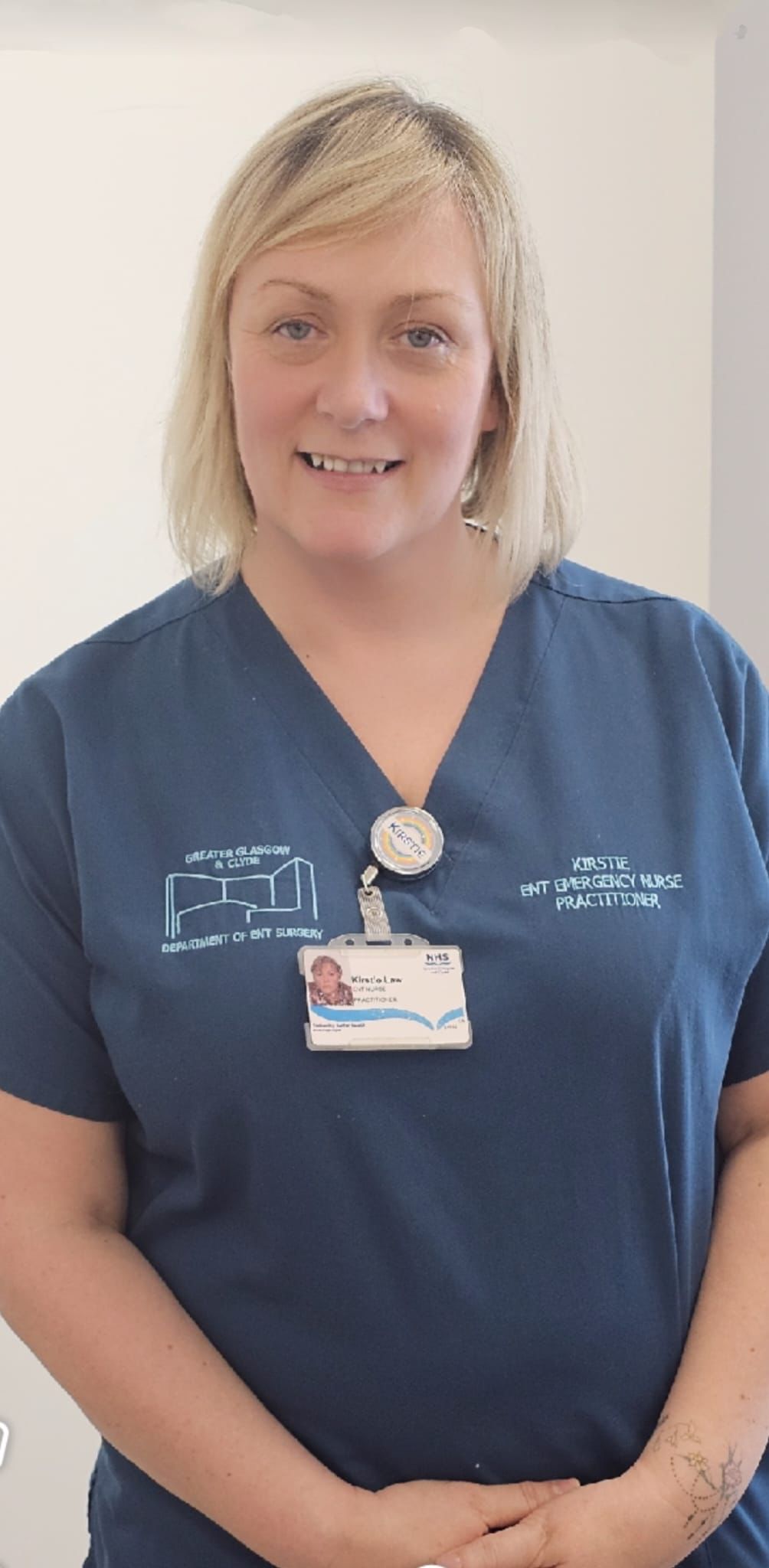
Kirsty Law is an ENT emergency nurse practitioner at the Queen Elizabeth University Hospital and has been recognised by colleagues for providing high-quality, patient-centred service.
Her role is to provide emergency care to patients with unscheduled ear, nose, and throat problems. As well as seeing primary care referrals and Emergency Department (ED) referrals she now also sees some patients straight from ED triage to decrease waiting times for these patients and help our busy ED.
She has established treat and discharge for many conditions which means that many patients no longer require inpatient admission. Last year, the treatment room saw 4500 patients for emergency care and diverted this workload away from our busy EDs.
As well as treating ENT emergency patients Kirstie has been integral in providing teaching and support to the junior doctors both informally on the ward in the treatment room and as formal induction teaching. She is consistently named in feedback as an individual who provides outstanding teaching and support.

Shona Scott

Shona, a Parkinson’s nurse specialist, has been working in Clyde Sector for more than 20 years, and in that time has developed nurse-led clinics, a nursing helpline for patients to contact between clinics as well as leading nurse education in Parkinson’s disease.
She was instrumental in developing the Movement Disorder Service in Clyde and has forged close supportive relationships with the patients she treats as well as supporting senior medics and acting as mentor to other nursing staff.
The service takes part in the national Parkinson’s audit every two years, which looks at patient experience in the service. Shona has been described by the patients she cares for as “always there if I need anything” and “always looking for the best treatment for me as an individual”.
Shona is due to retire this year, but while specialist nursing roles are more common now, staff in the service recognise Shona as “an early trailblazer 24 years ago” who has “a work ethic second to none” and an “immense” knowledge of Parkinson’s disease.
Volunteer
Recognising people who go the extra mile contributing tirelessly and providing outstanding help and support for the benefit of others.
Gold Winner – Hub Cafe Volunteers
Throughout NHSGGC, the value of safe, sociable, patient-focused spaces where people can meet, relax and spend quality time together, is huge, and the creation of such a space within a psychiatric hospital was of particular importance.
The Hub Café volunteer project at Gartnavel Royal Hospital was set up to establish such a space and, after the team was recruited, they have successfully delivered every aspect of the new café.
From Opening Hours to the range of activities on offer and from the menu to the way in which the Cafe is presented, the Team has worked hard to make the space the best it can be.
The volunteers perform a range of tasks from customer service to food hygiene and have embraced this new challenge with good humour and commitment. The fact that the drinks and snacks on offer are delicious is the icing on the cake!
Silver Winners
Marie Phillips
Marie Phillips is a rehabilitation support volunteer, who started supporting the Royal Alexandra Hospital during the Covid-19 pandemic.
She works with Allied Health Professionals in Orthopaedics to support and encourage patients with mobility and gentle recovery exercises.
Marie also spends time listening to patients and providing companionship to help lift their mood and has been described as an “incredible support at the RAH” who is popular with staff and patients.
In addition to this important role, Marie has also become a valued member of the RAH INSPIRE team.
Marie initially provided incredible support throughout the pandemic years as a key part of the RAH’s Volunteer Covid Response team, helping with the Give and Go service and in the hospital’s ICU Halo gardens.
Colleagues have described her as being “unfailingly generous”, with a natural ability to make patients feel at ease.

Claire Duffy
Claire Duffy is an Emergency Department Volunteer at the Queen Elizabeth University Hospital. The volunteer service had been set the objective to provide distraction and company to patients in the waiting rooms during winter of 2022. Initially a Volunteer Guide, Claire was asked to support the project.
In a short time, Claire had initiatives off the ground that supported patients and their families. These included distributing free newspapers, contacting newspaper distributers to source free crossword activities, and providing children with activities while they waited with parents.
Claire also noticed other areas where the volunteers could support. Before long, she was helping patients with phone access. Many would like to call home but weren’t sure how to work their mobile, access Wi-Fi, or have means to charge their phone. Claire supported by sourcing power banks and assisting where needed. She also sourced a bank of reading glasses for patients who had left theirs at home. All these small differences made a huge impact on people’s day. Patients were noticeably calmer once these changes were made.


Was this helpful?
The local staff awards are popular across all Directorates and HSCPs as they enable all areas to recognise and show appreciation to colleagues who have gone the extra mile. Everyone can give their own examples where amazing care or services have been delivered under hugely challenging conditions and staff have nominated the colleagues who they think most deserve recognition for their stand-out efforts, skills and commitment.
Presentations have been held in each local Directorate and HSCP to award the winners in categories including Employee of the Year, Team of the Year, Leader of the Year, Innovation of the Year and Volunteer of the Year, with the overall winner announced at the Celebrating Success Staff Awards Event on 30th May 2024.
You can find out more about each of the overall winners in each category below, read about the nominees who were shortlisted, and you can also view photos and videos.
The winners were announced live on the night on our social media channels (follow the #ggcawards tag).
Congratulations to all the winners!
Local Staff Award Winners
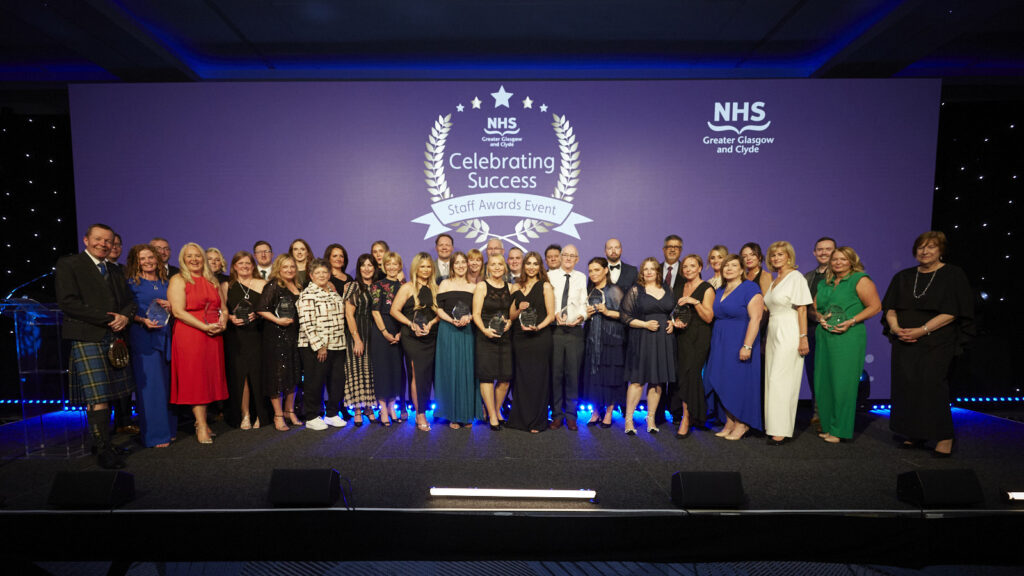
Acute Services – Clyde Sector
Overall Winner – Royal Alexandra Hospital Stroke Multi-Disciplinary Team

Overall Winner Nominees
Team of the Year
RAH Stroke Multi-disciplinary Team
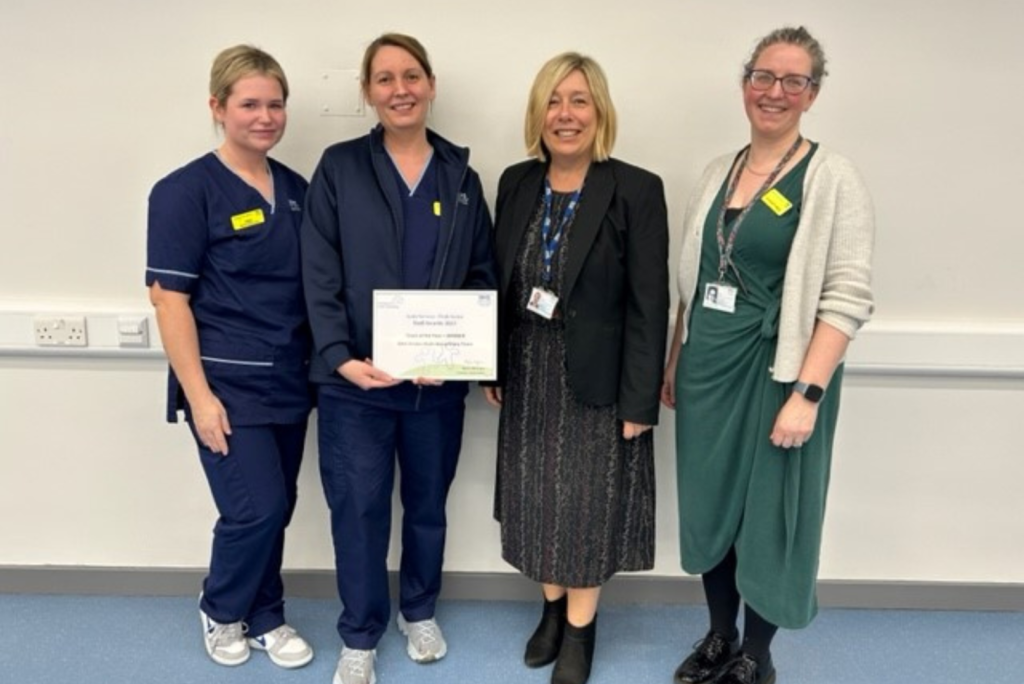
The Team led the stroke improvement work at RAH, aiming to facilitate timely patient access to Acute Stroke Unit, and implementing a thrombolysis service. This involved partnership working across the multi-disciplinary team, educating and training staff to transition wards into a hyper-acute stroke unit and stroke unit.
Early assessment, diagnosis and treatment significantly impacts outcomes for suspected stroke patients. The redesign enables improved performance, with patients reaching the unit and receiving necessary care quickly. In addition, the thrombolysis pathway means hyper-acute treatment can be provided at RAH, rather than transfer to QEUH.
The improvements present RAH as a modern stroke service, delivering to national stroke standards. Unscheduled care performance is also supported by ensuring quick and appropriate transfers from ED

Employee of the Year
Sharon McLauchlan, Housekeeper, Lomond Ward, Vale of Leven
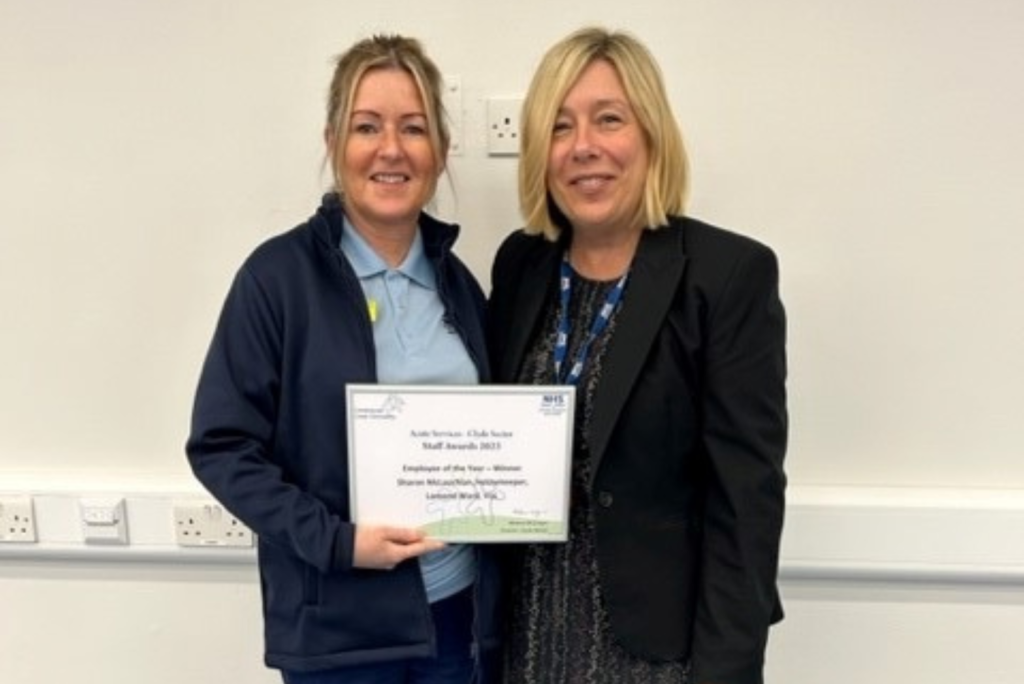
Sharon has made a significant impact since commencing her employment with NHSGGC one year ago. Every day she has a positive ‘can do’ attitude, is extremely hard working and efficient. She has taken time to fully understand the importance of her role, promotes high standards in processes and procedures, and encourages others to do the same.
Sharon goes out of her way to make a difference to others and is an asset to the ward and wider hospital team. Her kindness is a joy to observe, with patients and relatives routinely commenting on the time she affords them, her bright attitude, caring behaviours and support.

Leader of the Year
Angela Thomson, Senior Charge Nurse, Ward 10, RAH
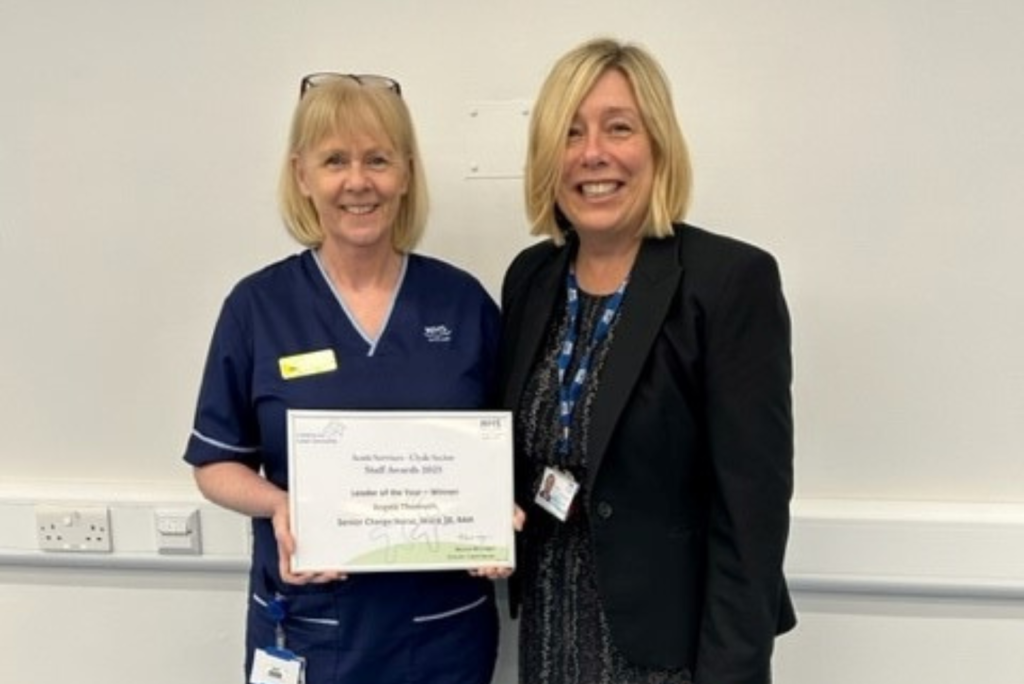
Angela she has demonstrated unparalleled leadership skills, particularly during the pandemic, and more recently through a period of unprecedented change.
She leads by example, undertaking any task in the interests of patient care. As an example, Angela went above and beyond to provide special support a patient who married while rehabilitating from an illness. This heart-warming story was reported in the local press and featured on STV News.
In addition to her commitment to high quality patient care, Angela always prioritises her staff before herself, including starting shifts early; finishing late; and even working on days off to ensure staff feel supported. This has resulted in excellent nursing staff recruitment and retention in Ward 10.

Innovation of the Year
Clyde Robotic Theatre Team
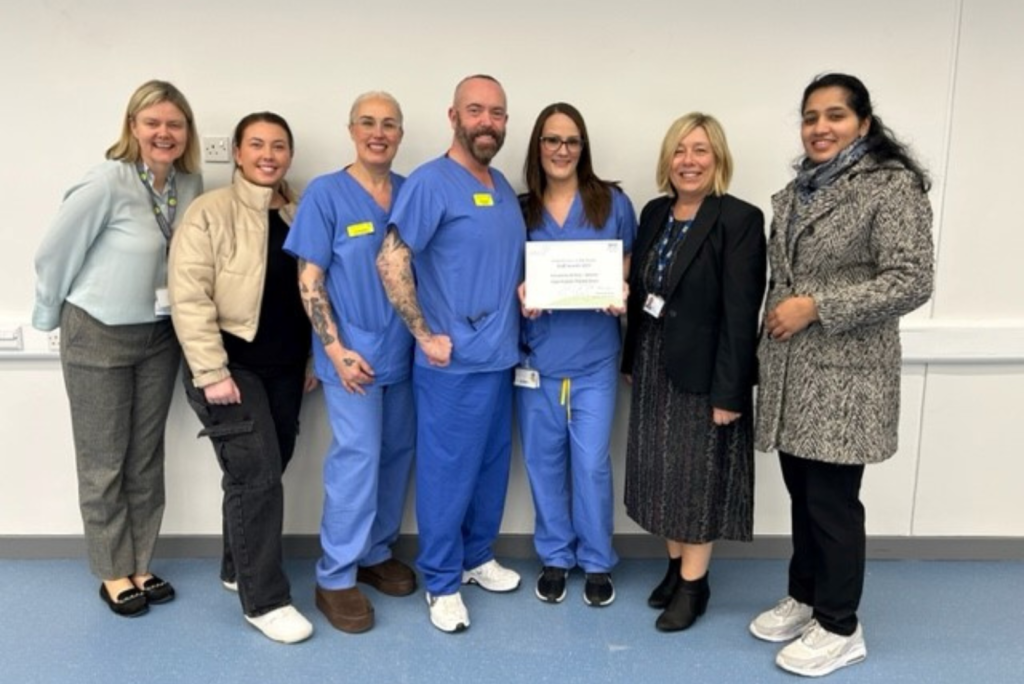
This innovative staffing model has seen in excess of 20 Theatre staff from across Clyde undergo specific training in robotic surgery to provide a new, minimally invasive service that is improving outcomes for colorectal cancer patients.
The service is provided by Clyde theatre staff on QEUH site, recently increasing delivery to 2 theatre days per week.
All staff involved, including lead nurses and educators, are commended for their commitment and enthusiasm in undertaking the training (often in their own time), and building strong, collaborative working relationships with QEUH colleagues to develop and launch the new service.
The team are key players in its success, their expertise and professionalism ensure this service continues to prioritise patient safety and improve cancer outcomes for Clyde patients.

Volunteer of the Year
Marie Phillips, AHP Rehab Support Volunteer; INSPIRE Volunteer
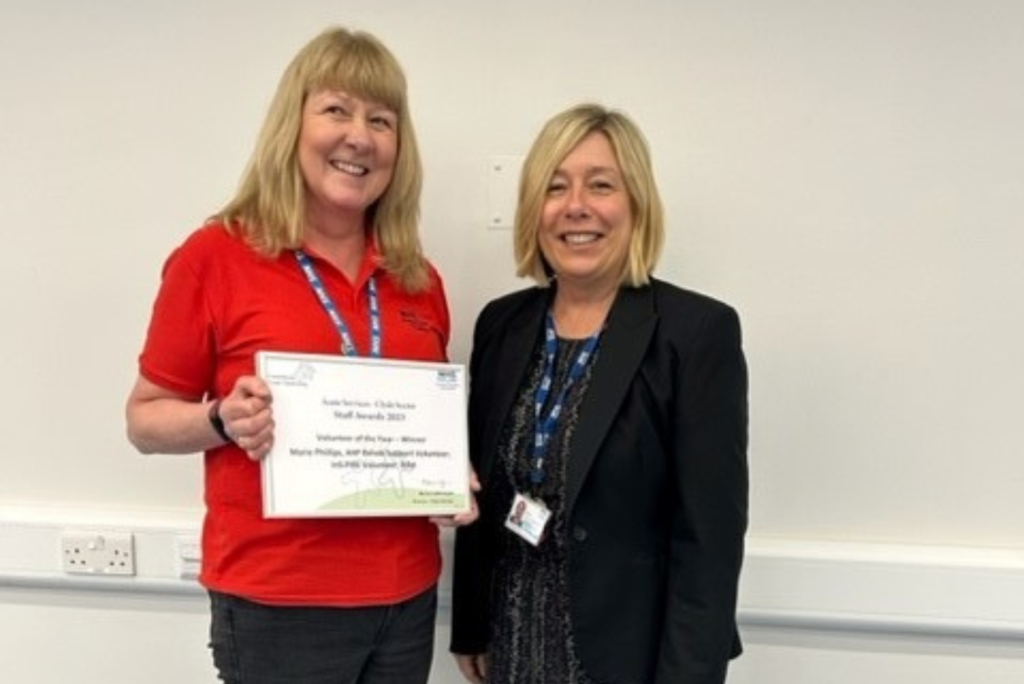
Marie has been an incredible support at the RAH and is popular with both staff and patients. She is unfailingly generous in her time and will offer to help out wherever needed.
Marie works with Orthopaedics AHP colleagues, supporting and encouraging patients with mobility and recovery exercises, or simply spending time listening, providing companionship and support, to help lift their mood and provide a welcome distraction to their time on the ward.
Marie is also a valued member of RAH INSPIRE team, creating a friendly and relaxed environment and supportive encouragement to participants.
Acute Services – North Sector
Overall Winner – Thomas Cybulski – OPS

Overall Winner Nominees
Team of the Year
The Acute Medical Receiving Unit (AMRU) Housekeeping Team
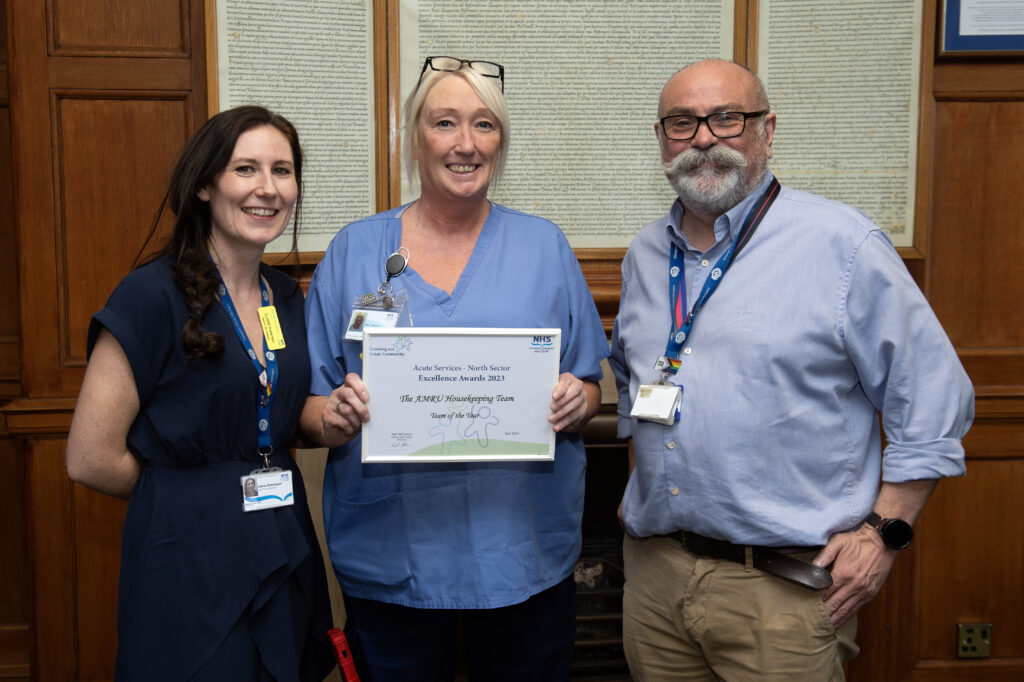
Jackie and Simon consistently go above and beyond to support the wards and their colleagues. They show great pride in their work, they are fantastic team players who always go the extra mile to support the areas they cover. The epitomize teamwork and dedication and their unwavering commitment to maintaining cleanliness and hygiene ensures high-quality care for our patients. Their supportive approach fosters a positive work environment, promoting staff wellbeing and unity among colleagues. Their proactive efforts contribute significantly to departmental and directorate objectives, exemplifying excellence in their field.

Employee of the Year
Thomas Cybulski – OPS
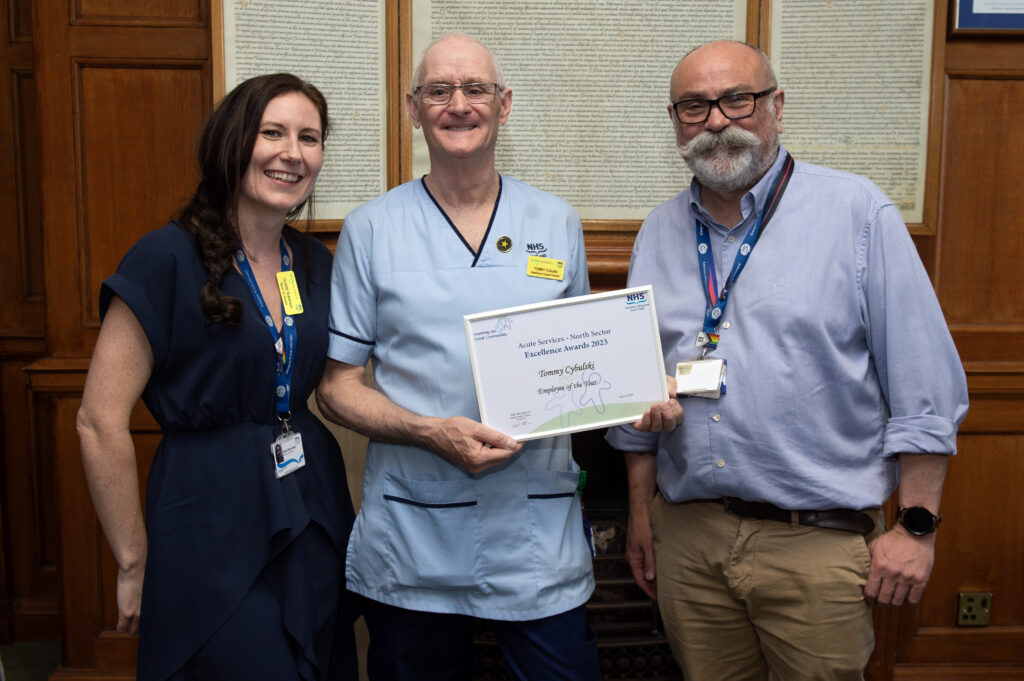
Thomas Cybulski, fondly known as “Tommy” to his patients and colleagues, exemplifies the essence of exceptional patient care at Glasgow Royal Infirmary. Despite facing his own health challenges, Tommy’s dedication knows no bounds. His unwavering commitment to serving the hospital with positivity and joy sets him apart. There is no job that Tommy will not assist with, nothing is a bother and he brightens brining positivity and joy to our days. Tommy’s selflessness shines through in his tireless efforts to brighten the lives of patients and their families, mostly notably seen each Christmas as he visits wards clad in festive attire to spread cheer among his patients, their families and colleagues. His actions, driven purely by a desire to enhance patient well-being, exemplify the spirit of compassionate caregiving. Tommy’s impact extends beyond his duties, making him a beacon of inspiration and an outstanding colleague.
Working together in a true team approach to administer the COVID booster vaccination to in-patients at 3 North Sector sites, this team ensured patients were vaccinated while in hospital in a timely, caring and compassionate manner reducing the risk of COVID infection. They responded quickly to urgent requests, and built up a strong rapport with staff and seamlessly meeting demand despite there own services being remobilised.
Having local staff run the program was beneficial for staff and patients, but it was the patient centred and teamwork nature of this team that made all the difference. Thank you team for your dedication to patient centred care and team working.

Leader of the Year
Janet Craig – GRI OPD
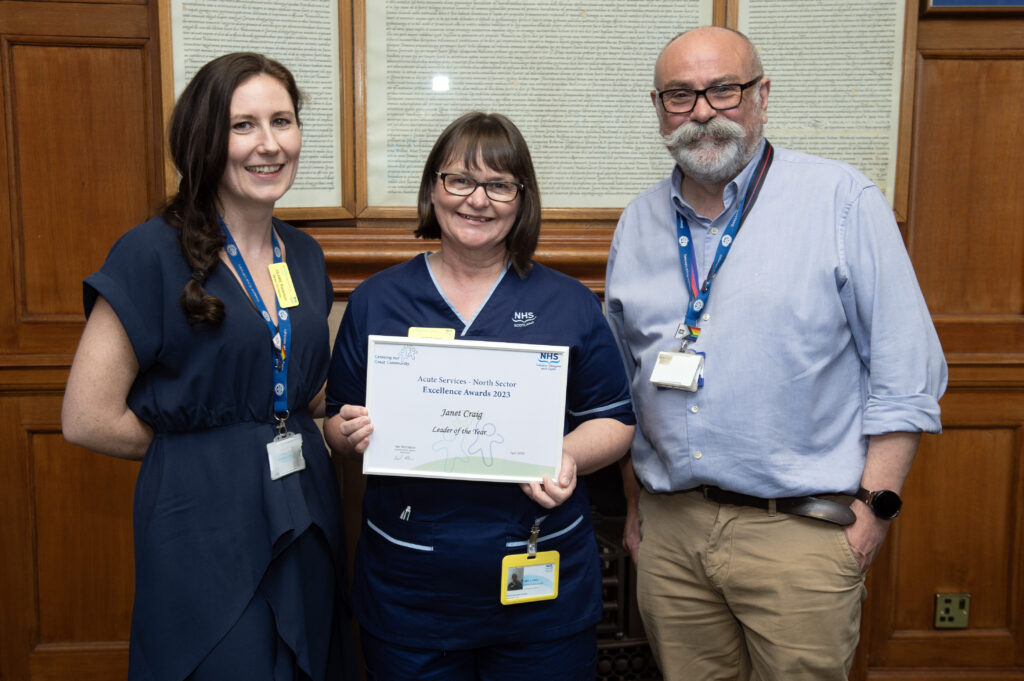
Janet Craig has shown exceptional leadership throughout this year, guiding her team with unwavering support and morale-boosting initiatives. Glasgow’s Royal Infirmary OPD team were displaced throughout the COVID pandemic to support inpatient areas and morale suffered as a result. Janet has diligently fostered team spirit through inventive activities, including staff lunches that have encouraged camaraderie and shared experiences. Furthermore, Janet’s commitment to community engagement was evident as she led her team in charitable endeavors, notably organizing a team-building walk and fundraising for local charities during the holiday season.
Janet’s leadership approach inspires and uplifts and has resulted in a return of services to pre-pandemic levels, while utilising staff to work differently in areas increasing the ability to provide diagnostic services in urology clinics and day
settings reducing inpatient demand. Her leadership has not only revitalized team morale but also significantly contributed to the community’s well-being.

Innovation of the Year
GRI Medicine WeCARE Junior Doctor Experience QI Group
Responding to junior doctors’ feedback at Glasgow Royal Infirmary for a desire for consistency and predictability during their time on the receiving wards, a Junior doctor led group, working in tandem with the consultant team have sought to improve ward rounds with structured pre and post-ward pauses. The group looked at ways to put in place a consistent approach to ward rounds to support junior doctors to plan their post ward round work and make it easier to take their breaks. This approach gave junior doctors an equal voice and input into planning and testing new ways of working. The group developed a structured approach to ward rounds in receiving which includes a pre and post ward pause which could be adopted in other areas of the hospital. This ensures consistency, predictability, and facilitates breaks. The collaborative approach empowers junior doctors, enhancing both efficiency and staff wellbeing and the model, epitomizes continuous improvement and contribute to quality care and staff wellbeing

Volunteer of the Year
Pain Management Patient Volunteers
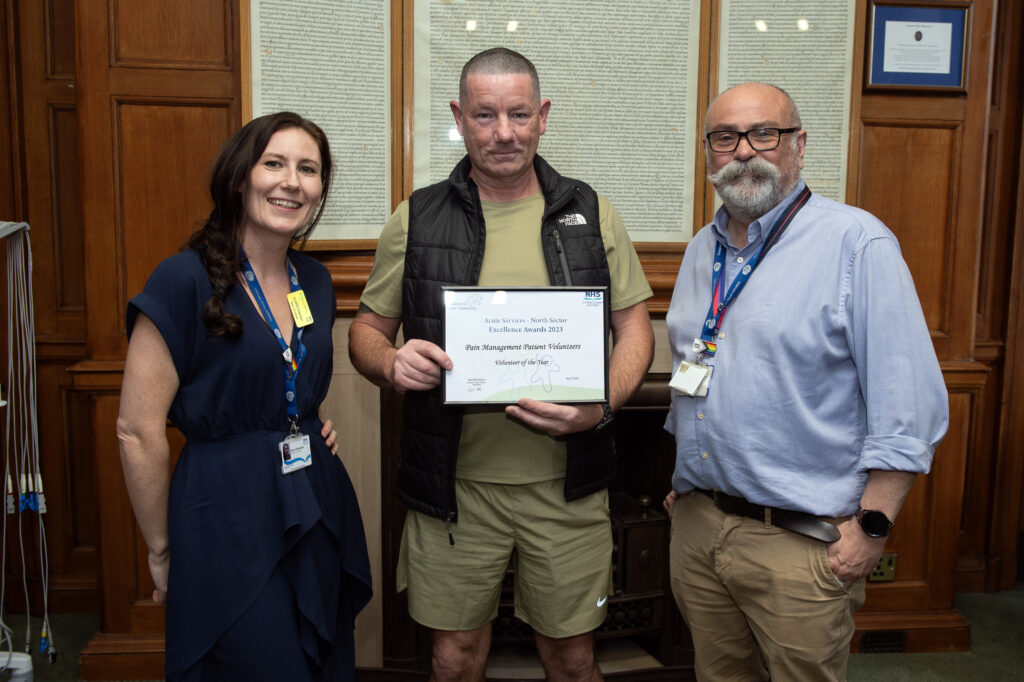
The Pain Management volunteers have supported the pain service over many years. Despite living with, and managing, their own long-term pain conditions, this exceptional team has dedicated countless hours to enriching our pain service and community.
Their impact is profound, as they educate patients, carers, and HCPs on pain management. Through their lived experiences, they offer invaluable insights to our Pain Management Programme, inspiring hope and resilience.
Their commitment extends beyond individual struggles, actively shaping patient centred service delivery. Their selflessness and unwavering dedication exemplify the spirit of volunteerism, illuminating paths of empathy and support for our patients and their families.
Acute Services – South Sector
Overall Winner – Ophthalmology Service

Team of the Year
Ophthalmology Service
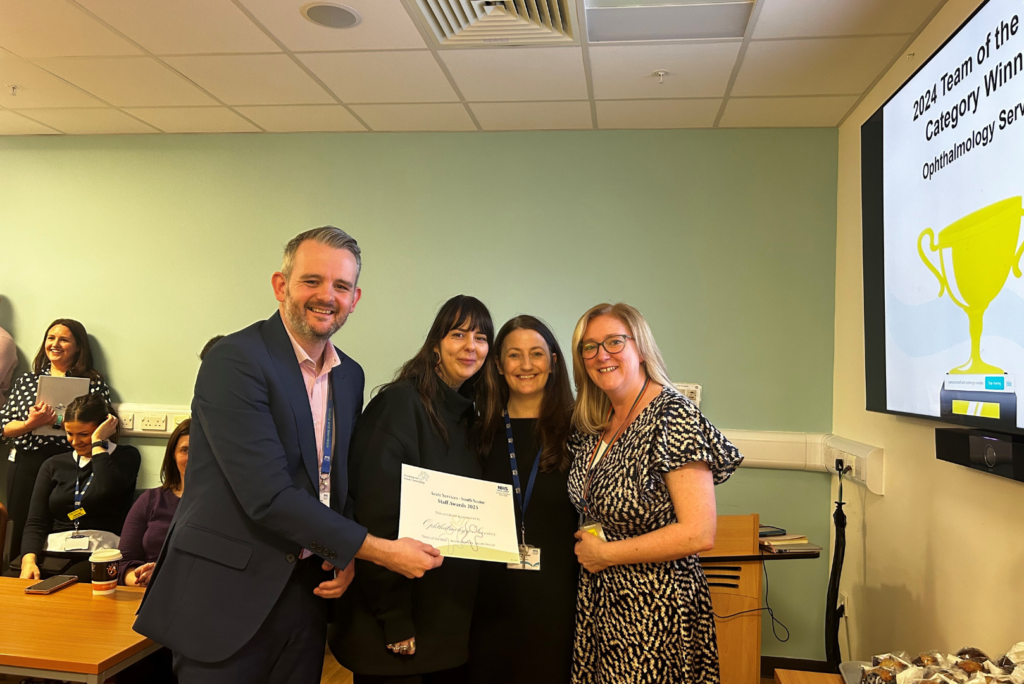
The team consists of consultants, trainees, nursing staff, orthoptists, optometrists, ocularists, administrators, and clinical staff, led by Dr. Deepak Tejwani and Dr. Soma Chakrabarti, co-clinical directors.
The service has maintained high levels of patient activity (averaging . 1700 patients per week), successfully rolled out a national EPR programme, and is on track increase the number of cataract operations completed this year by 23%. The service has also identified and contacted 500 low-risk glaucoma patients suitable for transfer of care to the community as part of the national Community Glaucoma Service.
All this activity has led to reduced patient waits, resulting in positive patient feedback via care opinion, and this positive feedback enhances overall staff morale and wellbeing.

Employee of the Year
Jade Aitken
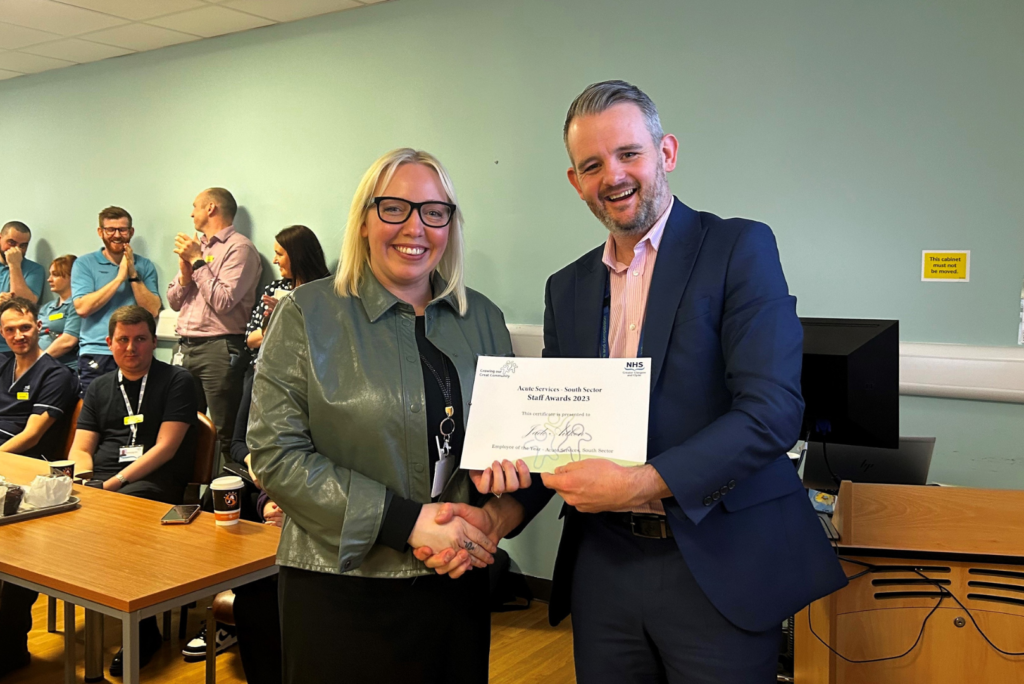
Jade, employed as a housekeeper, was extremely supportive in preparation work to open two winter wards (5c and Brownlie) at the GGH site to support winter capacity. Jade often worked independently to source the equipment required, report estate issues, and organise ward stock levels. Jade was instrumental in keeping the lead nurse and clinical services manager up to date with progress and also with issues that required escalation. Jade has done this over a period of weeks while also carrying out her own ward duties. Overall, Jade went above and beyond to support the opening of 45 additional winter beds at GGH.

Leader of the Year
Allan Dodds, Associate Chief AHP
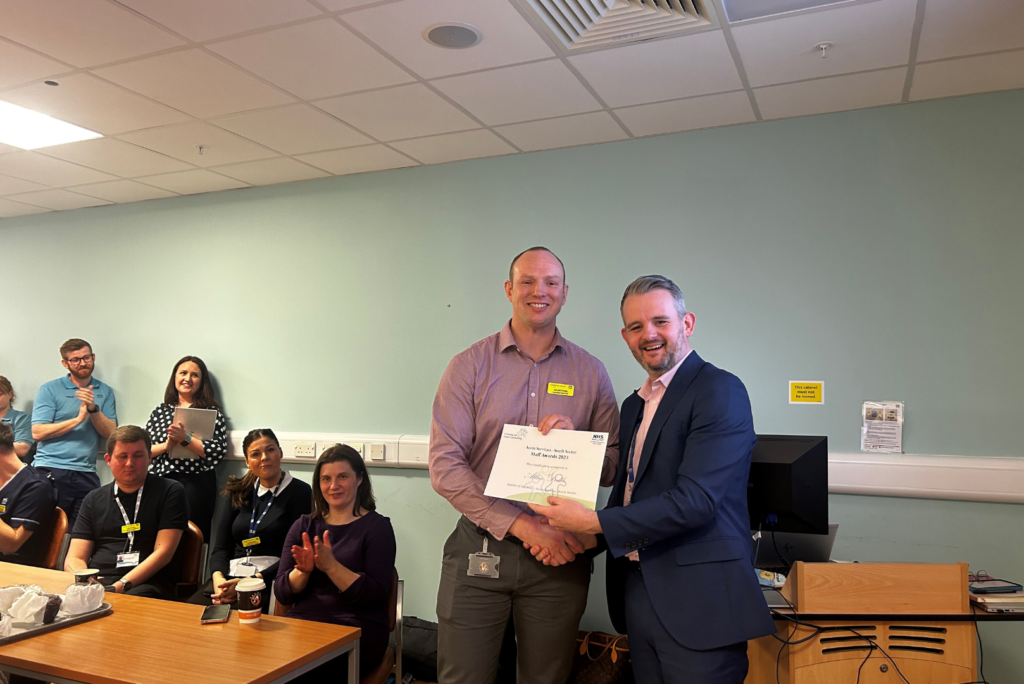
Allan has been a fantastic support to his staff, both in the orthopaedic and major trauma AHP teams. Allan is a constant source of support and positivity, which has helped to create a warm and friendly working environment for all his staff. Allan has also been working in the role of associate chief AHP. In this role, he is a fantastic advocate for the occupational therapy and physiotherapy professions and has supported all AHP teams in the South Sector who deliver excellent patient care.

Innovation of the Year
Acute Medical AHP Team
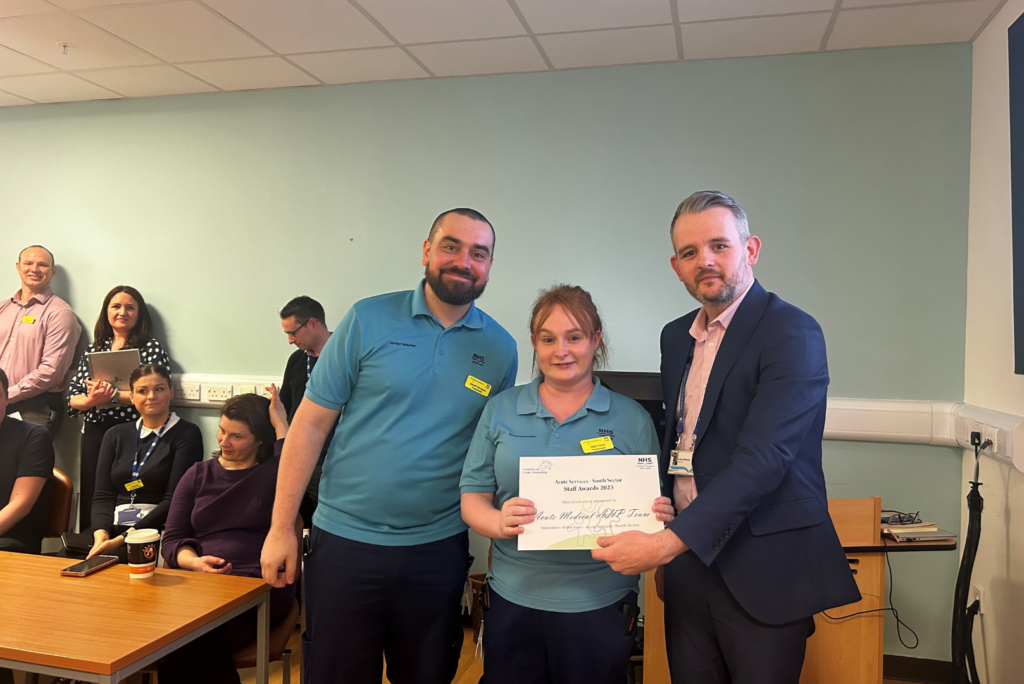
Emily and Shane work on Level 5 at QEUH, which includes diabetes, endocrinology, general medicine, and infectious diseases wards. They regularly assess and treat patients with a wide variety of medical conditions and functional abilities. Due to the
challenging environment and large number of patients with vastly different needs, their focus became centred on improving patients’s access to physical activity and advice regarding exercising independently. Therefore, to support this, they developed the ‘Get Moving to Get Home ‘campaign. As well as developing a brand new video resource, they have used an innovative approach to digital technology to make new and existing resources available to all. These new resources have been shared beyond their own clinical area and will ultimately improve the patient experience.
Diagnostics
Overall Winner – Total Skin Electron Beam Therapy. Led by Robin Sawyer, Head of Mechanical Engineering, Clinical Engineering and Radiotherapy Physics

Overall Winner Nominees
Employee of the Year
Lisa Cairney, Radiographer
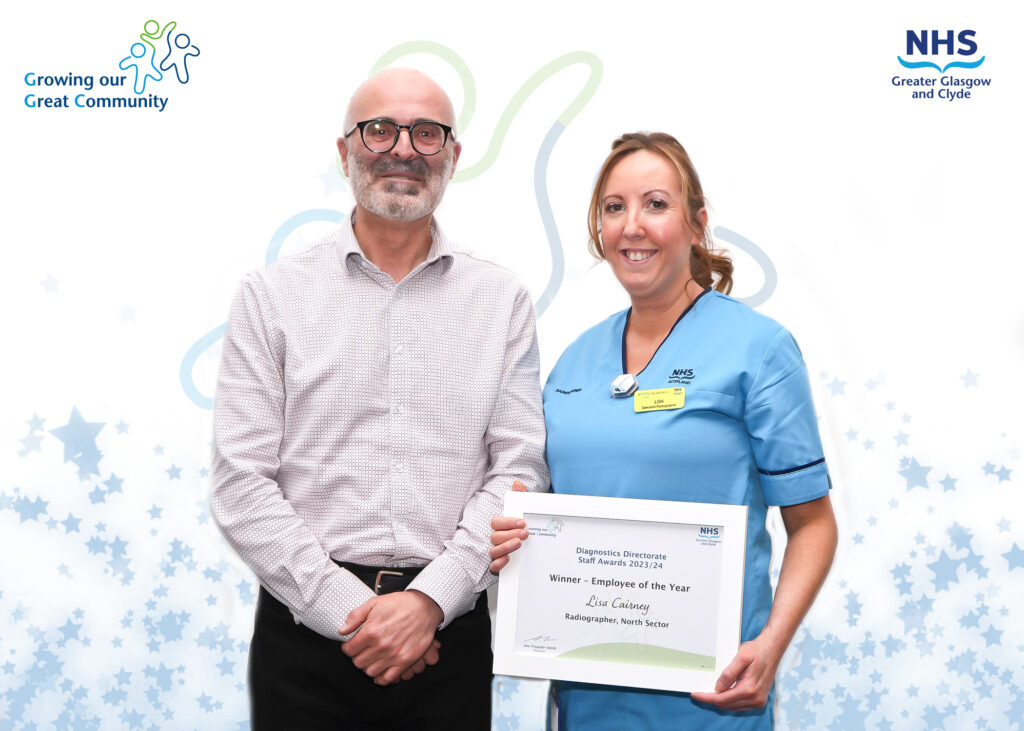
Lisa is an extremely hard working and experienced Radiographer and an expert in the field of Cardiac CT scanning at Glasgow Royal Infirmary.
These are complex scans which result in the need for extensive training. Having identified a need for training resources that included technical requirements together with how to produce a “gold -standard” scan, Lisa spent numerous hours in her own time creating an in-depth training guide featuring step by step procedures with sections covering anatomy, pathology, FAQs and troubleshooting.
The training guide is supplementary to Lisa offering one to one training for Radiographers and Radiology Registrars.
Team of the Year
Prostate Script Project Team. Led by Gavin Orchin, Pre-registration Clinical Scientist, Radiotherapy Physics
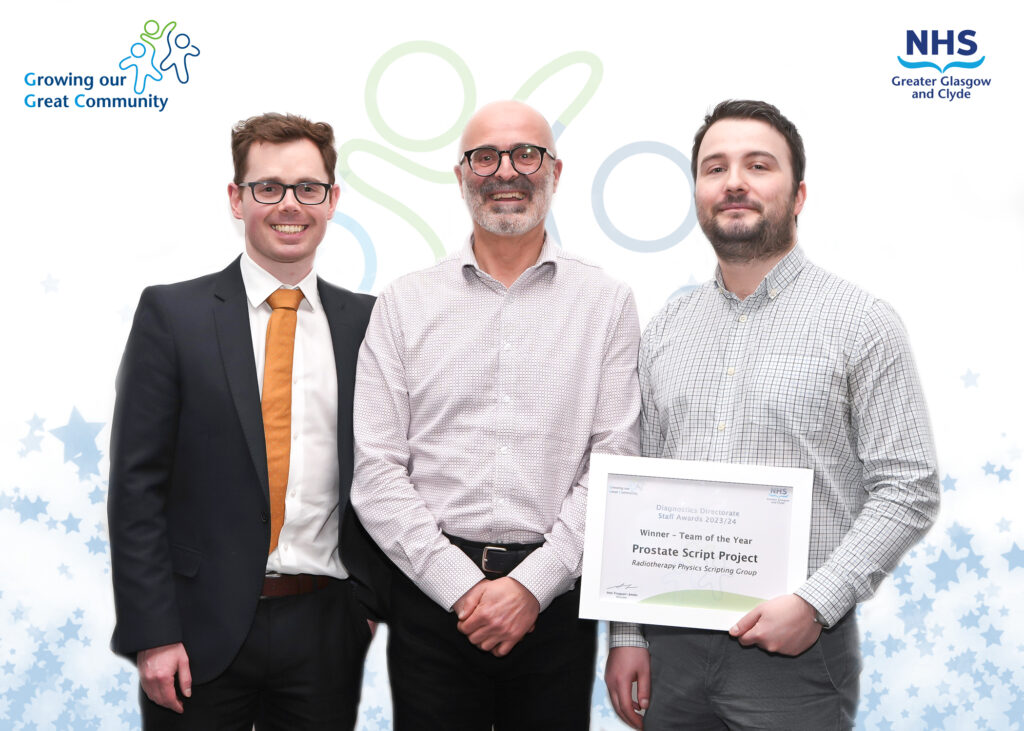
The Beatson Radiotherapy Department plan and deliver over one thousand prostate treatments each year, and a treatment plan is created for each patient tailored based on individual anatomy and optimised accordingly.
Creating these plans is time consuming and resource intensive, and a decision was taken by the team to create a Script to automate much of the manual processes.
This has improved staff experience by reducing the number of individual tasks staff are required to perform, improving efficiency by significantly reducing planning time by approximately 30 minutes per patient (leading to an annual saving of five hundred working hours).
The consistency provided by the script reduces the risk of manual errors and the time saving allows team members to further focus on patient safety and other key tasks.

Leader of the Year
Freya Johnson, Consultant Reporting Radiographer
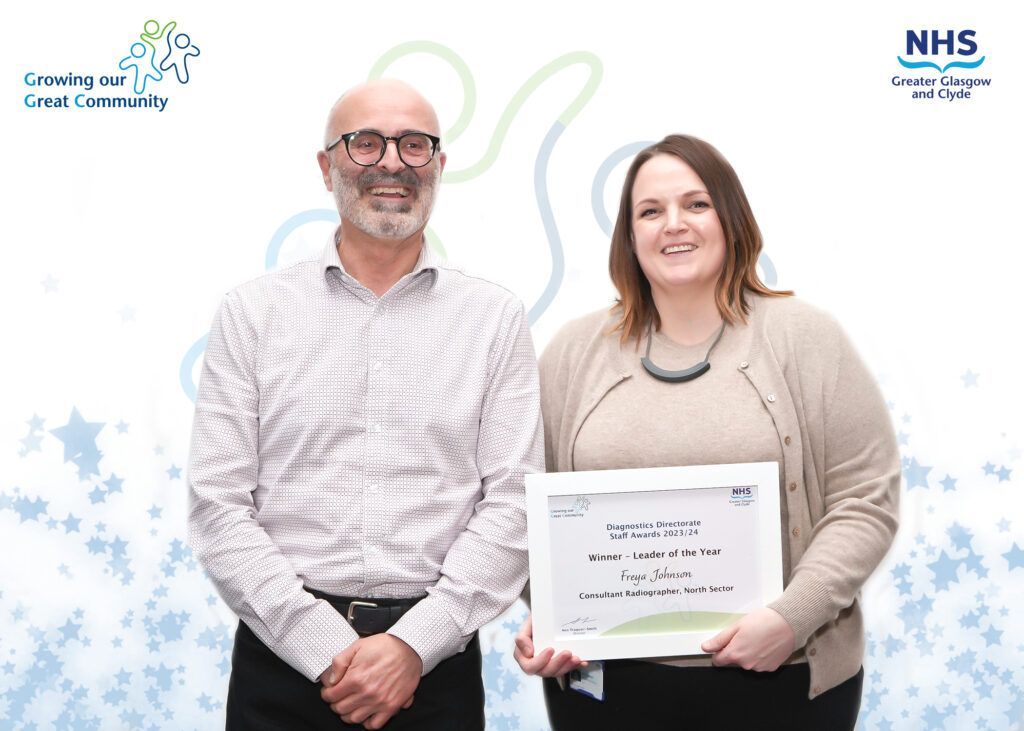
Freya has entirely changed the dynamic of the working relationship between Radiology doctors in training and the Reporting Radiography Team by taking on a large amount of training and supervision, both personally and with the support of the Reporting Radiography Team.
This has resulted in a much-improved training experience on trauma film reporting for new Radiology doctors, and with this change in the working relationship and enhanced collaboration, the number of images seen by Registrars has resulted in a significant increase together with development of a great team culture featuring much more inter-disciplinary collaboration. Freya’s attitude and work ethic continues to inspire all those around her.

Innovation of the Year
Total Skin Electron Beam Therapy. Led by Robin Sawyer, Head of Mechanical Engineering, Clinical Engineering and Radiotherapy Physics
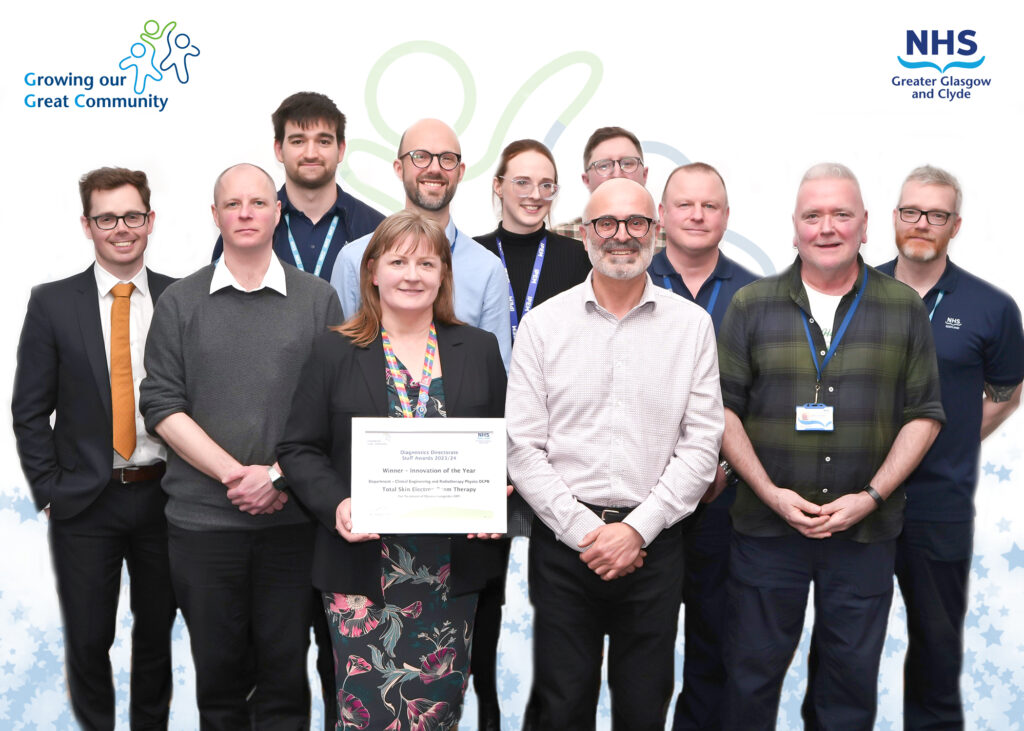
Total Skin Electron Beam Therapy (TSEBT) is the most effective single modality for treatment of Mycosis Fungoides (MF), which is the most common type of Cutaneous T-cell Lymphoma. At the time of diagnosis, many patients have patch and plaque disease limited to the skin.
TSEBT involves irradiation to the entire skin surface and is often used at various stages of MF to alleviate symptoms. The Medical Devices Unit was asked to develop a medical device to enable the treatment of patients at the Beatson Cancer Centre as opposed to them having to travel to Newcastle.
The device was developed under an ISO 13485 Quality Management System and has made a significant improvement to patient care with patients often being treated two to four times per week over a period of weeks.
The Clinical Engineering Department designed the device which complied with all quality and radiation standards, taking account of patient dignity, well-being and care.
Volunteer of the Year
Joint Winners – Monica Dillon, Biomedical Scientist, Pathology and Kayleigh Quinn, Biomedical Scientist, Pathology, Laboratory Medicine
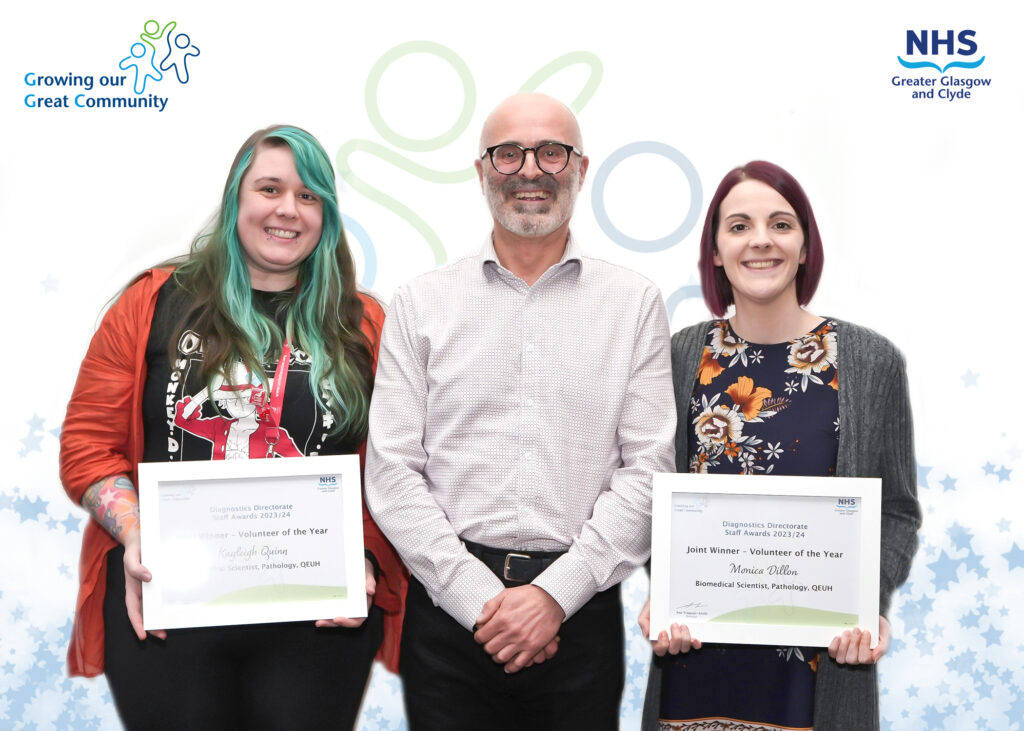
Monica Dillon and Kayleigh Quinn, both Biomedical Scientists within the Pathology Laboratory recognised that some staff had reduced well-being or were feeling lonely and isolated following the Covid pandemic and decided to organise various social activities including a monthly themed departmental quiz where all staff including medical and mortuary staff were invited.
Held on the first Friday of every month, the quiz enables staff regardless of their role to integrate better together, to practice teamworking skills and to support each other. Monica and Kayleigh fund drinks and prizes for the winning team and they also organise pizza.
As a result of friendships made, staff outings to karaoke (Pathoke) other groups have now formed, including the Board Game Club, a Staff Library and Craft Club. We are immensely proud of what Monica and Kayleigh have achieved for their colleagues, particularly as they give up a great deal of their own time to organise activities.
East Dunbartonshire HSCP
Overall Winner – Douglas Bell

Overall Winner Nominees
Team of the Year
Community Support Team, Social Work, Children and Families
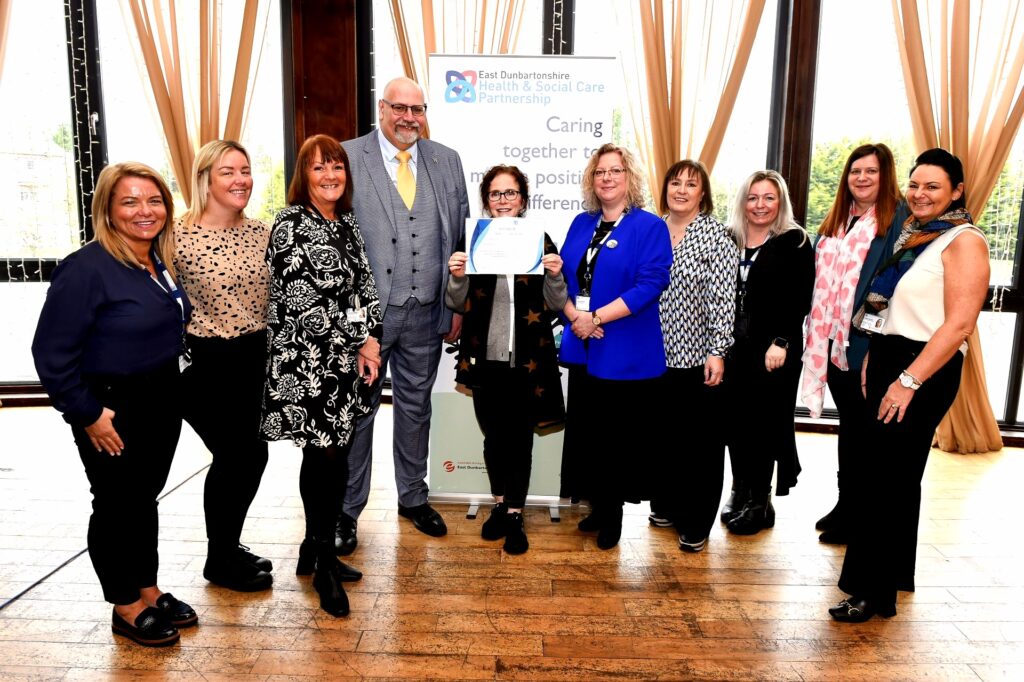
The members of the Community Support Team have been working together to improve engagement and participation with the children and families involved with the service. A team leading great projects, such as food pantry and coats initiatives, delivered in a sensitive, thoughtful way which tackled potential stigma attached. Continual improvement to service, tailoring approach to how they work with children and families. Welcoming, warm environment created to bring young people and their families into, creating a nurturing space for supporting families. A great example of team work and the outcomes that can be achieved when everyone works together with the same common shared goal and a commitment to service outcomes for their community.

Employee of the Year
Lewis Crawford, Receptionist/Modern Apprentice, Woodlands Resource Centre
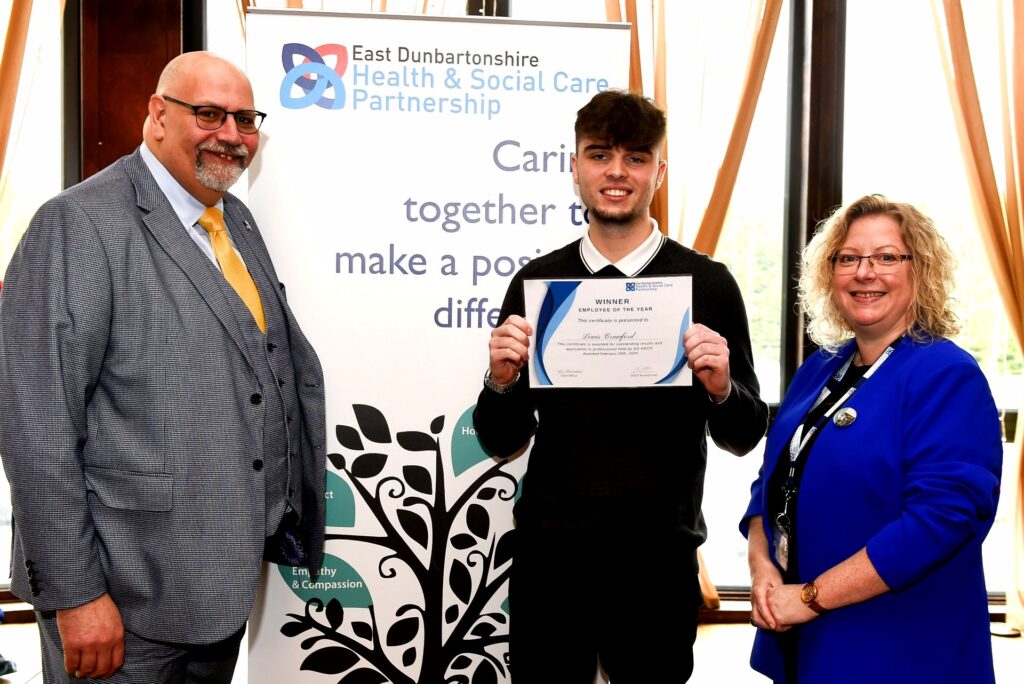
Lewis, a fairly new member to the team is the first person people meet when they arrive at our Outpatients clinics at Woodlands Centre, he has been integral to the team in terms of support to colleagues and patients.
Lewis responded well to a ‘sensitive situation’ (clarity required). Remains calm in potentially challenging situations, positive outlook with a good sense of humour, nothing is too much trouble. Delivers the full package which is outstanding so early in his career, excellent standard of work and ability to deal sensitively with patients.
Lewis is a very kind and caring person who has improved the patient and carer experience when they arrive at our centre. Being nominated is a testament to the quality of this staff member.

Leader of the Year
James Hamilton , Speech and Language Therapist Adolescent In-Patient Unit, Specialist Children Services
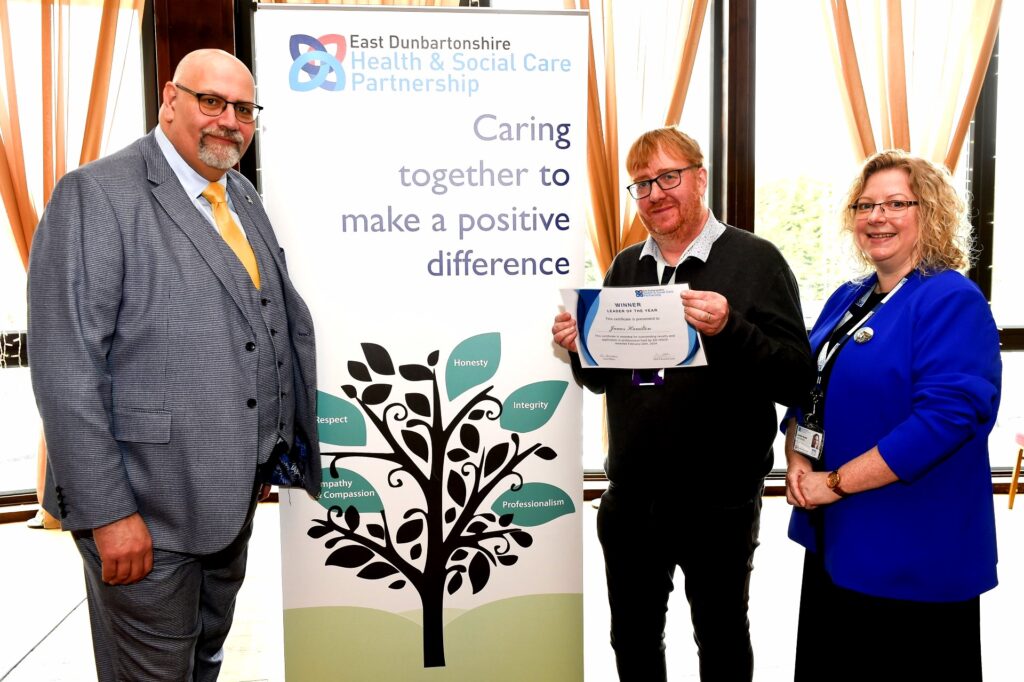
James was described as skilled mentor and coach, leading the team to deliver a nation leading approach and bringing people with him in the unique nature of service delivery. James, as the only speech and language therapist (SLT) in the UK working in Eating Disorders has shown exceptional leadership and vision in advancing the role of speech and language. Building capacity within the team.
A family quote was shared showcasing the life changing work “I got my daughter back. I watched her suffer and it broke my heart. She was disappearing in front of my eyes. We are forever grateful that we could access SLT as the specialist knowledge linked to eating disorders was definitely needed for us.”

Innovation of the Year
Douglas Bell, Advanced Nurse Practitioner (ANP) Urgent and Unscheduled Care
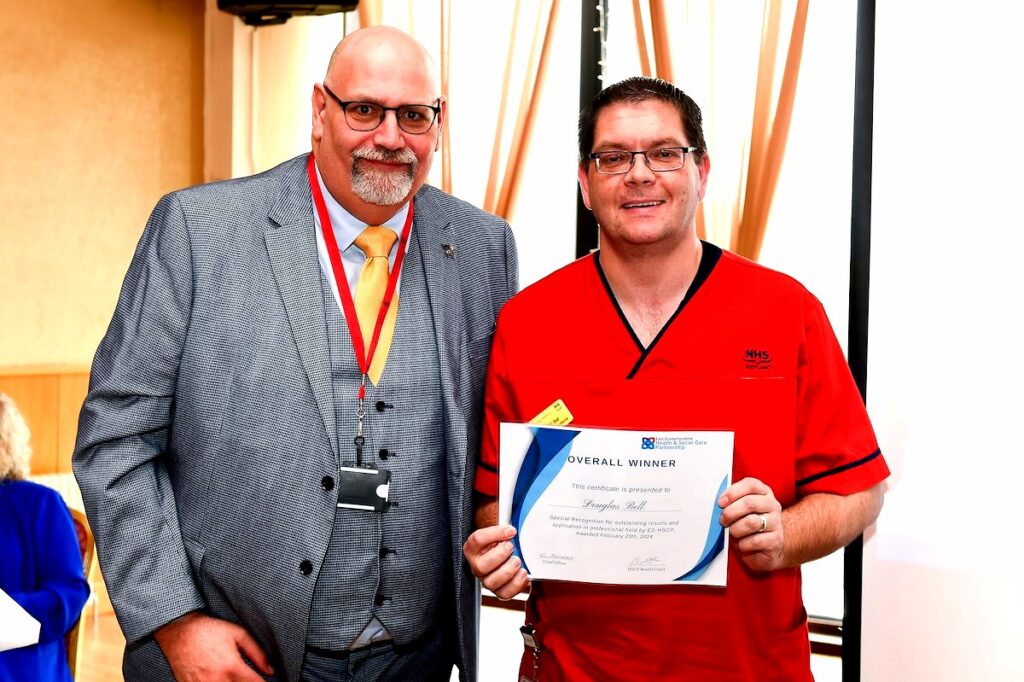
Douglas, an Advanced Nurse Practitioner (ANP) from the Primary Care Improvement Programme (PCIP) Advanced Nurse Practitioner team was nominated for his work on a service improvement initiative in order for ANP’s to carry emergency and first dose of medications for home visiting.
Douglas had the vision to identify what needed to be changed and delivered this within a challenging context. This piece of work has gathered wider interest across NHSGGC, receiving national recognition and sharing of good practice. Aligns to HSCP strategic priorities to keep people within their own homes and remain there for as long as is safe and the ability to provide immediate treatment to vulnerable people to allow this to key to the reasons for Douglas being nominated and winning this award.

Volunteer of the Year
Fiona McManus, Carer Representative for the The Public, Service User and Carer Representatives Group (PSUC)
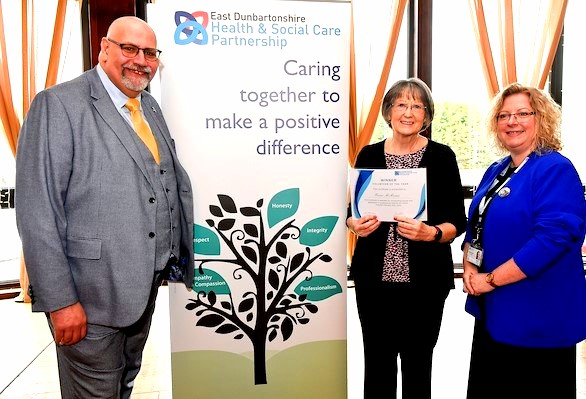
Fiona, always make a positive contribution to user and carer groups. Throughout our time working alongside Fiona, we consistently witness her skill and effectiveness representing Carers, not only across East Dunbartonshire (ED), but Scotland Wide. During the pandemic, Fiona supported in the developed of short films to support others in a caring role.
Lead on promoting the power of attorney (POA) uptake across the East Dunbartonshire (ED) community, delivering on strategic priorities, supporting better outcomes for the population. In addition supports carers across ED at the ‘drop of a hat’, simply put we don’t know what we would do without her.

East Renfrewshire HSCP
Overall Winner – East Renfrewshire Pharmacy Team

Overall Winner Nominees
Team of the Year
East Renfrewshire HSCP Pharmacy team
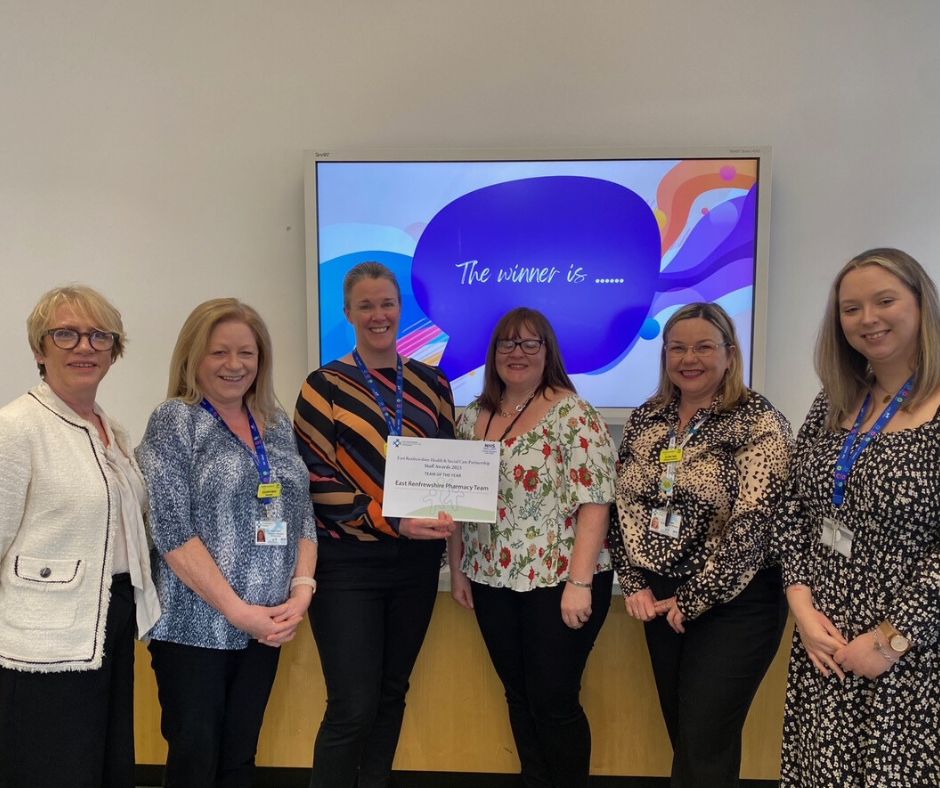
The East Renfrewshire HSCP Pharmacy team comprises of Pharmacists, Pharmacy Technicians and Pharmacy Support Workers who provide a patient centred, clinical Pharmacy service for patients living at home or in a care home within East Renfrewshire.
They have scooped coveted “Team of the Year” award for their exceptional contributions in 2023. The team focused on delivering patient-centred, clinical pharmacy services, with over 2000 monthly pharmaceutical care interventions. Noteworthy achievements include the successful implementation of serial prescribing, prescribing antiviral medicines for high-risk COVID-positive patients, and delivering substantial efficiency savings. Despite facing challenges, their unwavering dedication to improving patient outcomes and optimising healthcare services secured the team this well-deserved recognition.

Employee of the Year
Andrew Crumlish
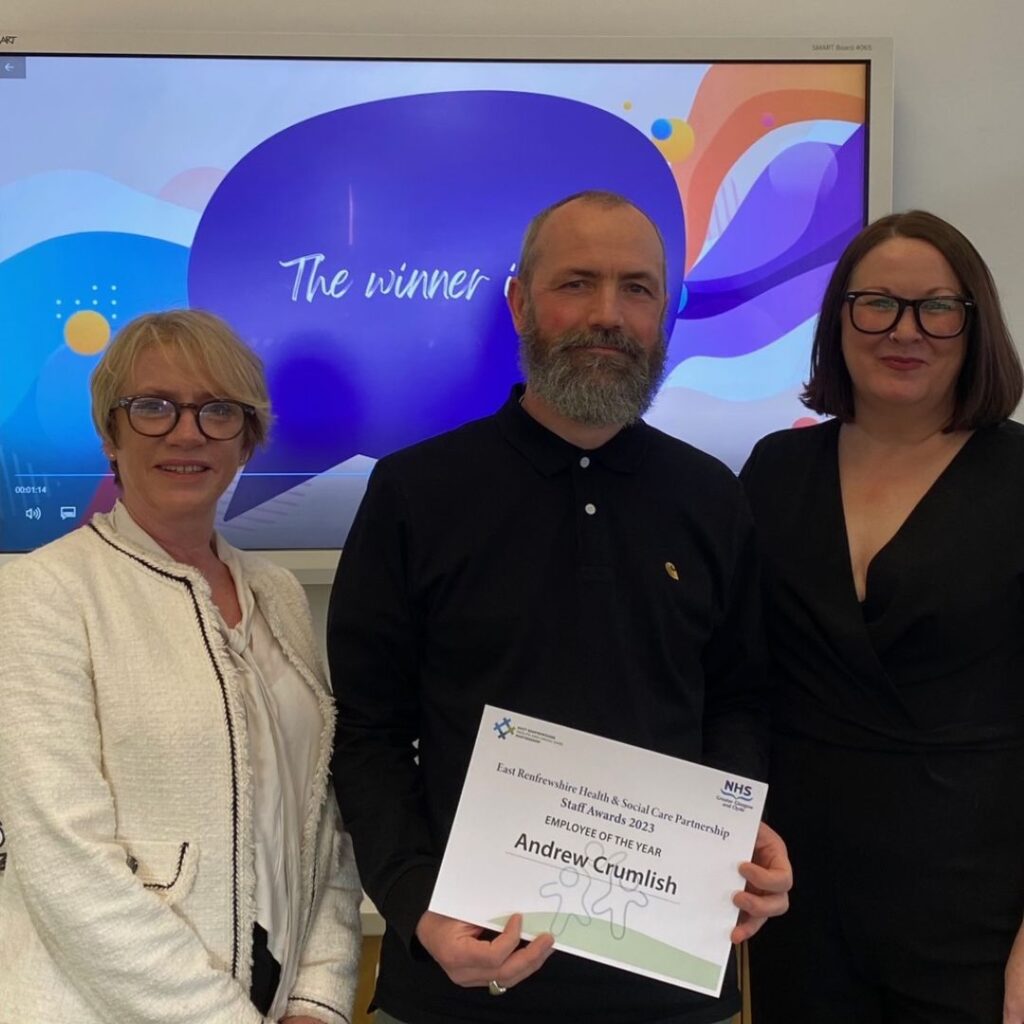
Andy is an incredible support worker, colleague and human.
He goes above and beyond to support the children and families he works with. He does everything from acting as a taxi, cleaning homes to make them safe, organising furniture to getting people involved in new activities. Andy builds trust and rapport with service users with such skill. He knows exactly what families need and formulates a plan with them.
He is hands on and proactive which was evident with the summer programme he organised. He planned trips to Edinburgh Zoo, Heads of Ayr, the cinema and many more. He arranged the funding, transport, food and drink and invitations and helped some of our most vulnerable residents have a positive and unforgettable summer.

Leader of the Year
Mark Sweeney
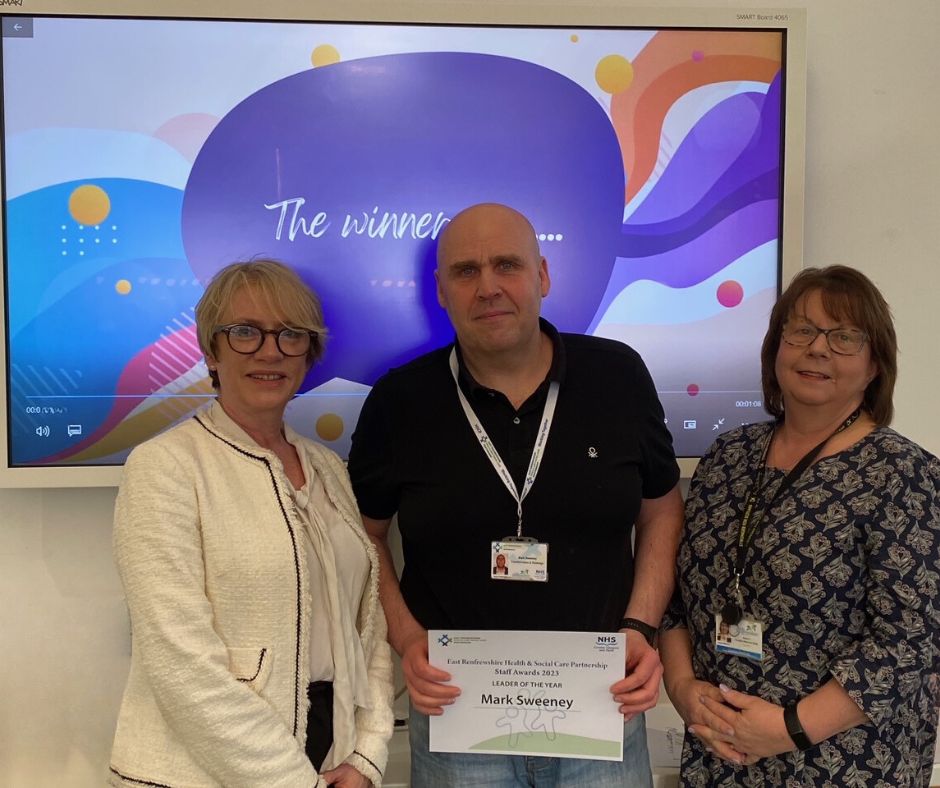
Mark has been a social worker in Children’s Social Work for more than 12 years but in the winter of 2022 he was drafted into our Care at Home Service which was experiencing significant challenges due to high levels of absence, at both frontline and leadership levels.
For six months he provided leadership and management cover for the service. He instantly won over the staff with his calm but firm approach.
He managed complex complaints, worked evenings/weekends – even missing his favourite football team play and working over Christmas without being asked. His leadership made a significant difference to staff and service users.

Innovation of the Year
East Renfrewshire Medication Support Service
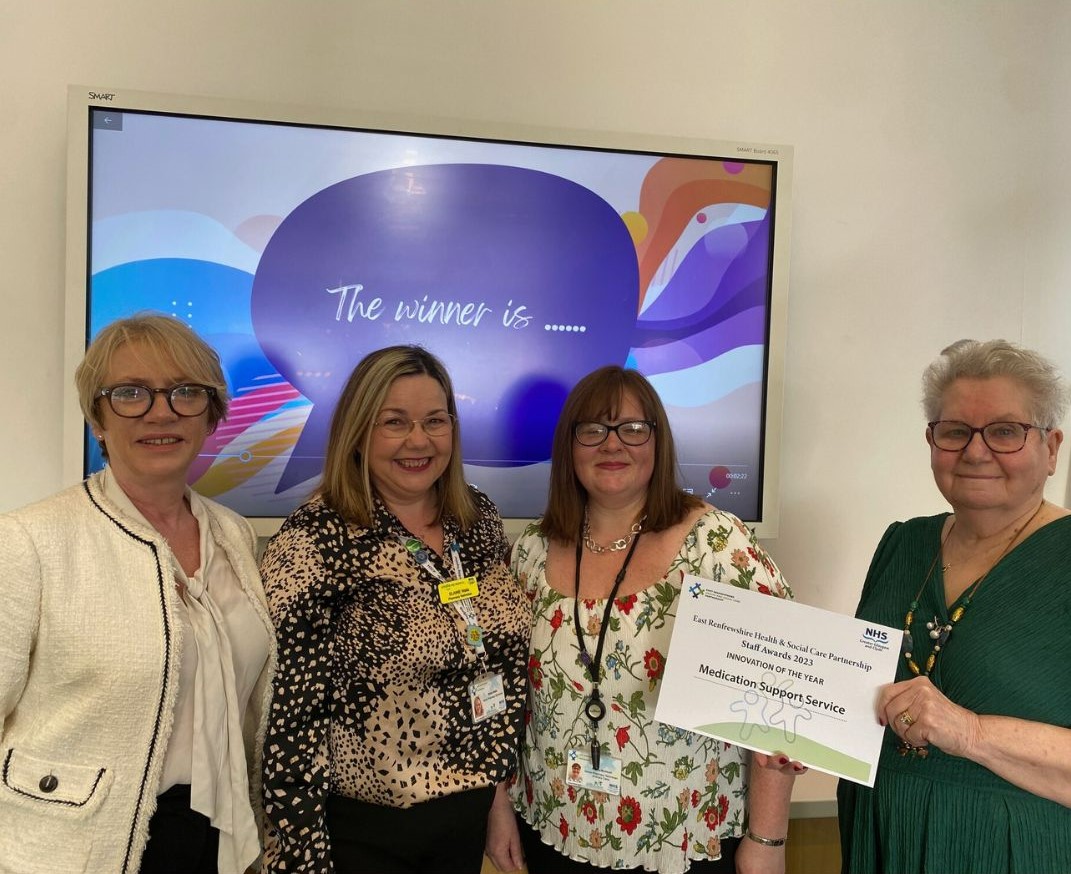
This dynamic team of Pharmacy Technicians spearheaded changes that seamlessly integrated our Medication Support Service (MSS) with the Adult Support Protection (ASP) team. By proactively receiving and acting upon medication error referrals, they have been able to create a process for collaborative interventions, sparing GPs unnecessary involvement. This reduces risks for vulnerable adults and provides a better service.
Their dedication to patient safety and innovative practises, recognised by the Care inspectorate, sets our MSS apart. This award rightfully celebrates MSS’s pivotal role in advancing healthcare delivery, ensuring better outcomes and fostering an environment of continuous improvement.
eHealth
Overall Winner – The Development and Informatics and Business Intelligence Teams – Andy Hardy, Stewart Blair and Kim Bova – Development of the Day of Care Audit (DoCA) application

Overall Winner Nominees
Team Of The Year
Louise Gunson, Gillian Morris and Iain Gordon – eHealth Contracts and Procurement Team
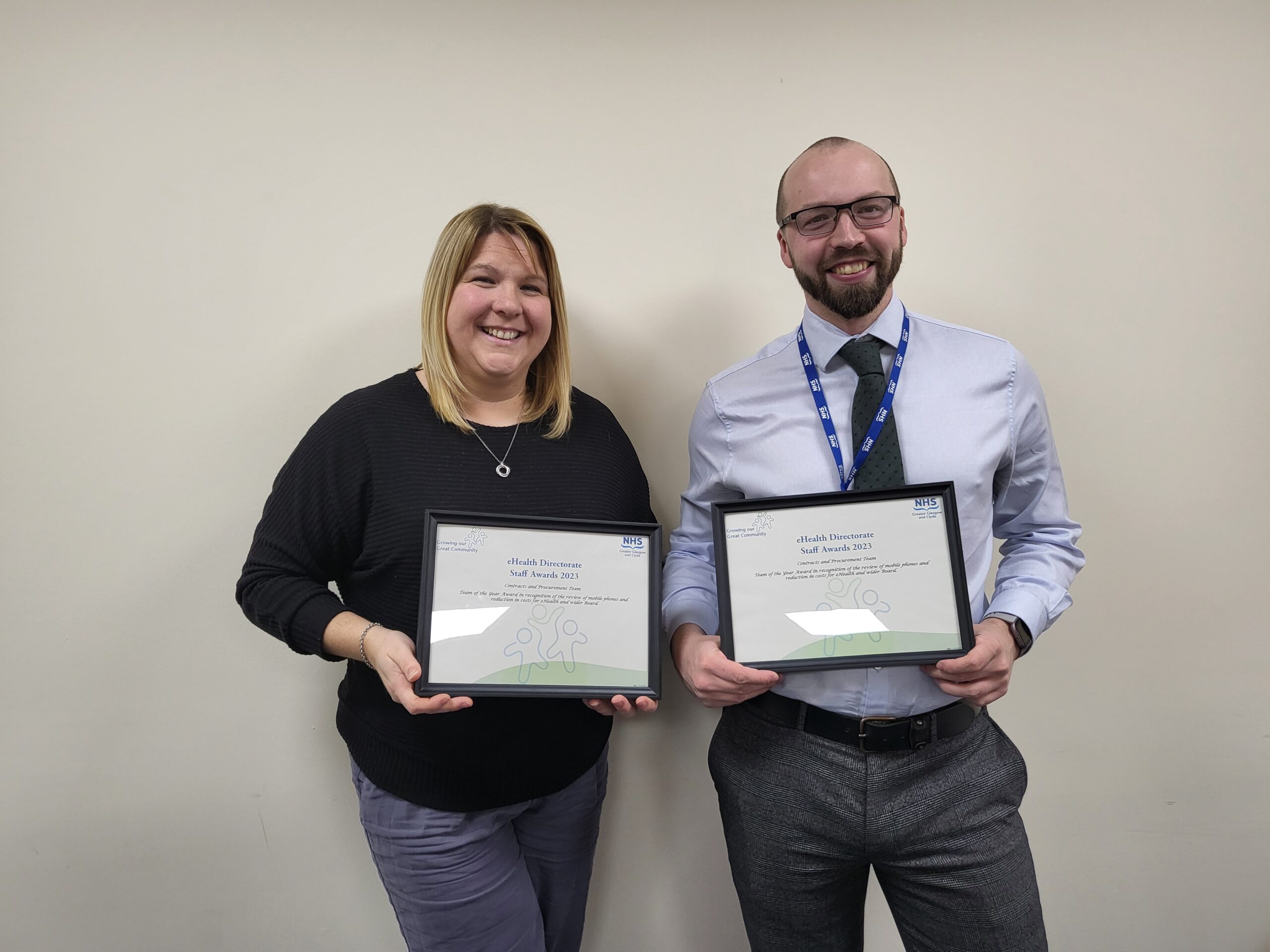
Since the transfer of mobile phone account management to the eHealth Contracts and Procurement Team, significant work has been carried out in relation to improvement of data capture, enhanced authorisation process for purchases and better reporting and analysis associated with monthly usage charges and management of contracts due to expire.
This has resulted in enhanced processes associated with invoice payment and charging mechanisms as well as a reduction in recurring costs for eHealth and the wider Board.

Employee Of The Year
Susan Cochrane – eHealth Business Intelligence

In order to properly reflect and monitor activity and compliance, Susan led on analysis of Psychological Therapies recording and storage within EMIS, transformed and modelled data to take into account of the variance in clinical approaches and transformed the identified events to reflect the standardised timeline specified for the HEAT target using a series of programmes written to incorporate this transformation into the basis for National submissions and local decision support reporting. On request this was further developed to reflect the complexities of multidisciplinary teams.
This was essential for monitoring and responding to patient access targets and in addition provided the clinical management overview of service provision to respond to demands and examine service improvements.

Innovation Of The Year
The Development and Informatics and Business Intelligence Teams – Andy Hardy, Stewart Blair and Kim Bova – Development of the Day of Care Audit (DoCA) application
The Development and Informatics and Business Intelligence teams worked together to transform the audit process for capturing and reporting on the clinical status of current inpatients. Previously this was a manual data collection process delivering results more than a week after the audit which reduced operational benefit of the process.
Introduction of the DoCA app meant an entire process could be captured across hospitals in the morning and reported in the afternoon with the development transforming the audit process and saving significant time for clinical staff. Furthermore, it improves data quality and provides the opportunity to use for operational discharge processes with Acute and HSCP staff. Other Health Boards are now interested in implementing GGC’s innovative solution.
Estates and Facilities
Overall Winner – Jennifer Materne

Overall Winner Nominees
Team of the Year
The Patient Transport Service
This team is based out of Gartnavel Royal Hospital which responds to requests from wards and departments throughout the Board to move patients to and from hospital. All the drivers have received training to allow them to deal with all different patient groups.
This is not restricted to our Health Board geographical area but can be as far afield as Oban, Birmingham, Edinburgh or London. The service is involved in transportation of renal patients from GRI and Stobhill with QEUH patients provided this service from January 2024

Employee of the Year
Jennifer Materne
Jennifer played a pivotal role in the completion of the emergency refurbishment of works 36/37 at RAH and with her attention to detail and communication skills ensured that all down to the smallest details were delivered to the highest standards and due to her dedication to the project this was delivered back in time for winter bed pressures. This has provided a greatly improved environment for staff and patients. Jennifer goes above and beyond for her team and is an excellent ambassador for the Operational Estates Team

Leader of the Year
Thomas Mills
As well as his duties as an Assistant Head of Capital Project providing valuable management and oversight to a team of Senior Project Manager Thomas has developed an on line resources for the project delivery team. The PM Handbook is the first port of call for the project delivery and collates all the processes, procedures, templates and best practice information for the delivery of NHS projects. It can also be used as a training took for new members of staff within Capital Projects. The system is interactive and an evolving resource for the staff to use in their daily roles. This taken forward by Thomas on his own initiative and a sizable piece of work to complete.

Innovation of the Year
Zoia Maher
Zoia is a member of the admin team based at GRI. Zoia has been the driving force behind the digitisation work that has been undertaken across Facilities Services over the last 12 months.
Without her commitment to excellence much of the work would not have been delivered at the pace it was, with accuracy or in a user friendly layout developed for all the team to use. Her work has ensured that time consuming process using paperwork has now progressed using the technologies available to us. This work will continue to be used to improve systems across the sector to ensure that compliance and quality management processes are updated.
Finance
Overall Winner – Andrew Molloy

Overall Winner Nominees
Team of the Year
Purchasing Team
The Team have been nominated for the successful recycling and reuse of furniture and equipment, achieved through the teams dedication and by raising the profile for the recycling and reuse service resulting in cost savings of c1.2million (from 2017 to 2023), carbon savings, waste reduction and overall improvement of sustainability.
The team have achieved ‘revolve’ accreditation which is awarded to 2nd hand stores throughout Scotland for cleanliness, quality and safety standards. This is due to the staff undertaking care in arranging the uplift, pre-check which includes upcycle (if required), cleaning and checking fit for use, uploading the details onto the portal for the end user visibility and delivery.
The team also promote the recycling service and direct NHSGGC staff members to use the portal when receiving requests for furniture and equipment.

Employee of the Year
Angela Gray
Angela is always willing to go above and beyond what is expected of her role. She has in depth knowledge of the whole service and can be relied upon to provide help and support to the service and her fellow colleagues within Management Accounts.
Her work ethic and easy going nature allows her to bring out the best in newer members of the Management Accounts team as well as service managers who are new to their role. She is a real team player, promoting health & wellbeing within the department by organising various keep fit activities (running group, keep fit class and yoga) as well as helping organise social events.

Leader of the Year
Debby Skene
Debby is the Head of Management Accounts for Acute. She has the respect of her team, her colleagues and seniors within Finance and beyond.
She is continually trying to drive forward change in the department and is leading on the changes to the month end process. She takes her team with her, makes everyone feel involved and always tries to resolve issues.
She has significantly improved the communication within her team and across all departments within Finance ensuring everyone is working collaboratively.
She is a dedicated member of the finance team and is describe by her team as a breath of fresh air!
She is a shining example to her staff and colleagues through her professionalism, positivity and can do attitude.

Innovation of the Year
Andrew Molloy
Andrew has consistently delivered technical solutions and processes to reflect a range of new pay and pensions legislation. This includes:
- The NHSS wide solution for the 2023 AFC additionality payment, which was calculated for all NHSS employees via business intelligence reports he developed to meet the criteria
- New pension control reports for multiple employments, aggregation of contribution tiers across all posts following the October 2023 pension changes, auto-enrolment eligibility across all posts, etc.
- Development of a range of reports and calculations to support a variety of core business processes
Andrew’s work has been pivotal for NHSGGC, and also the whole of NHSS, and his expertise has supported Payroll Teams across the country to deliver large scale requirements within exceptionally tight timescales.
Glasgow City HSCP
Overall Winner – Martha’s Mammies

Team of the Year
Martha’s Mammies
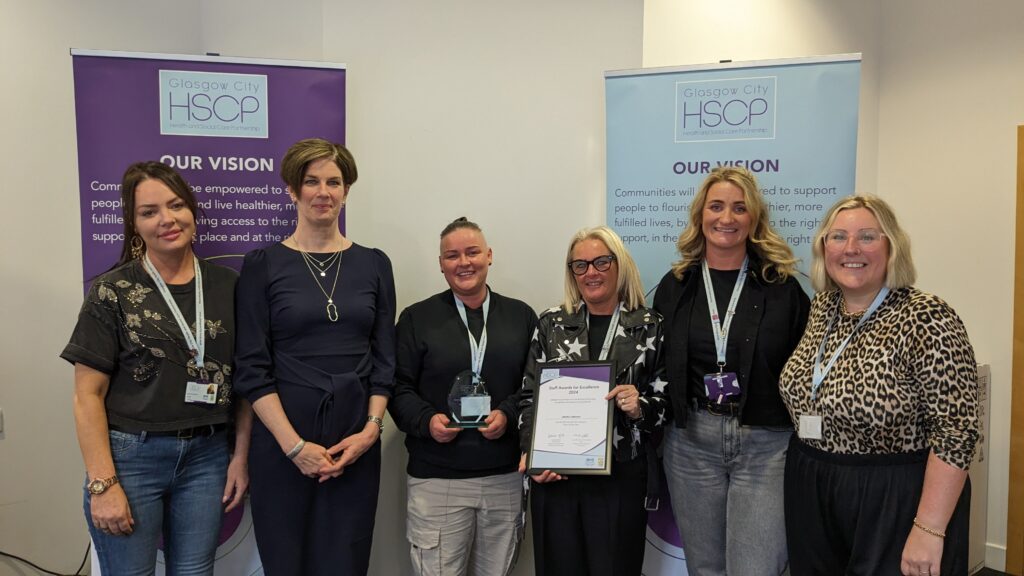
Martha’s Mammies is a service that supports birth mothers who have lost care of their children on either a temporary or permanent basis. Prior to the implementation of Martha’s Mammies, women who had lost the care of their children in Glasgow had limited specialist support to help them with the grief and loss that inevitably followed.
Martha’s Mammies is a multidisciplinary team who work with small caseloads of women to be able to offer flexible, intensive, and adaptive support to respond to the needs of individual women. The team worked well together to make a difference in a short amount of time and have achieved incredible results.

Employee of the Year
Thomas Higgins
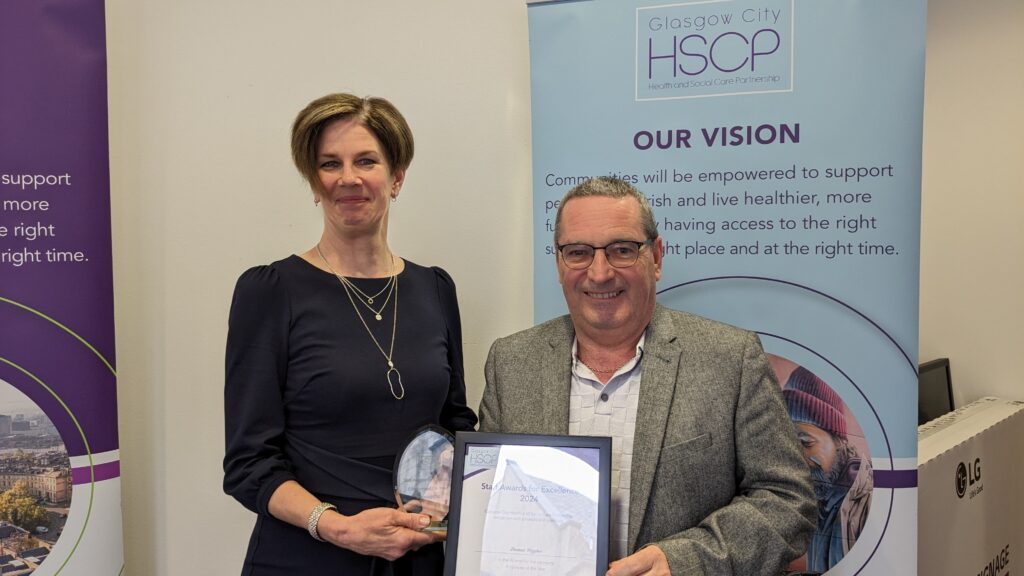
Tommy has worked in children’s residential services for many years working in several of the children’s houses across Glasgow.
He has dedicated his working life to supporting some of our most vulnerable care experience young people. In his role as a Senior Residential Practitioner, he has helped young people to flourish and realise their potential and nurtured them with care, enabling some of them to better understand the trauma they have experienced.
Tommy gives 100% on every shift and always put the young person first and foremost in any interaction, no matter how difficult it would be.

Leader of the Year
Rose Traynor
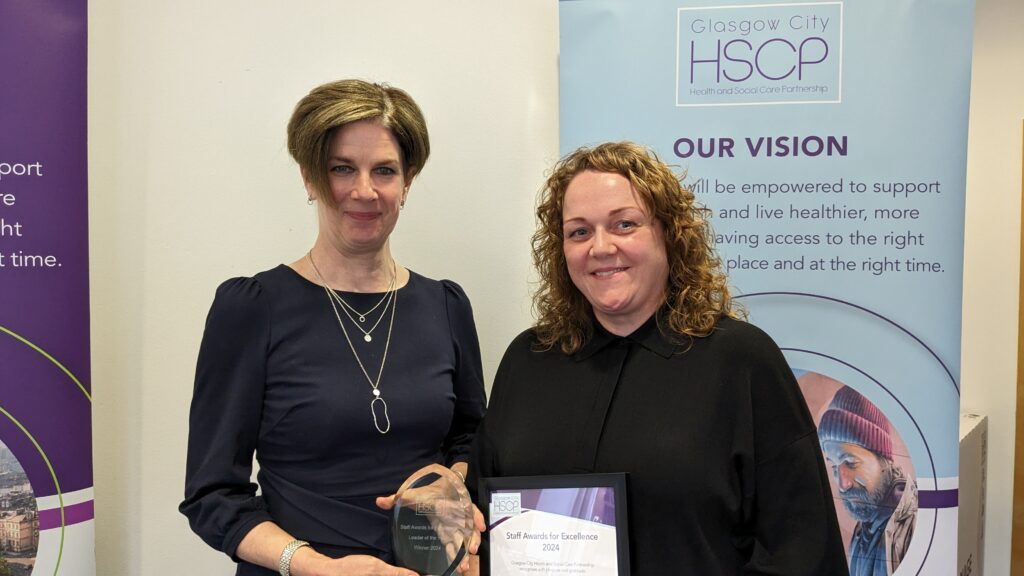
Rose is currently a Team leader for the Florence Street Community Mental Health Team. As a team leader she demonstrates outstanding leadership, encourages good practice, professional development, and a commitment to social work in mental health services. She will challenge and encourage colleagues to continue to learn and develop both professionally and individually making their working experience as good as it can be. During the past year there have been significant challenges within mental health social work services, Rose has continued to support and motivate her team to achieve positive outcomes for those they support.

Innovation of the Year
Chalk the Walk
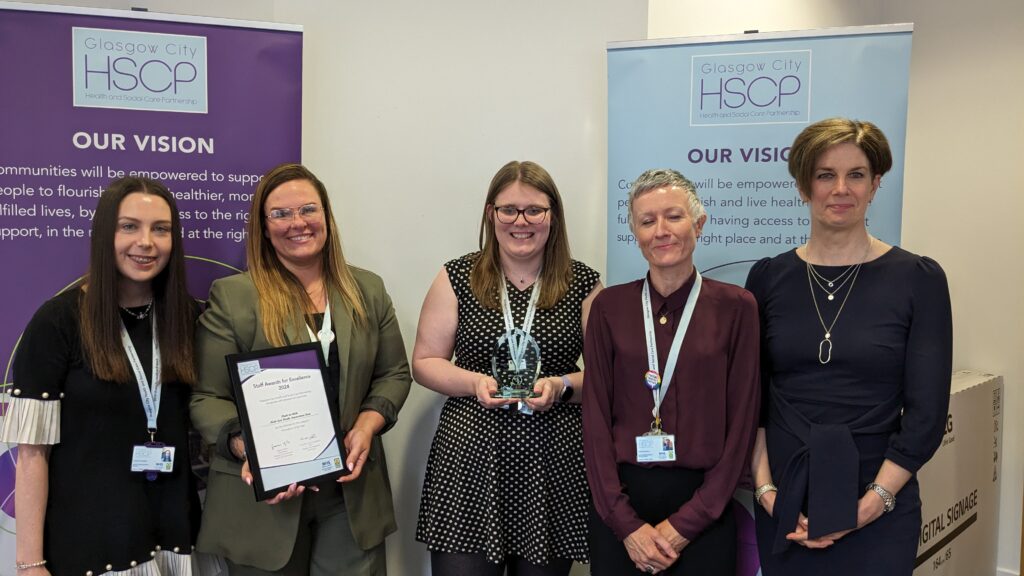
For World Suicide Prevention Day on 10 September 2023, the North East Health Improvement Children and Young Peoples Team asked local youth providers to take part in an event, “Chalk the Walk”, to help shine the light on suicide prevention. Working with Health Improvement teams, local youth organisations encouraged young people to use chalk, to beautify their community, with images and messages of hope, resilience, suicide awareness and prevention.
The youth organisations then posted pictures of their artwork on social media and the team allocated prizes for most creative, most colourful and most inspirational messages. Chalk the Walk was an innovative event that has made a significant different to local youth organisations, young people and their communities.

Volunteer of the Year
Sarah Donnelly and Sara Delaney
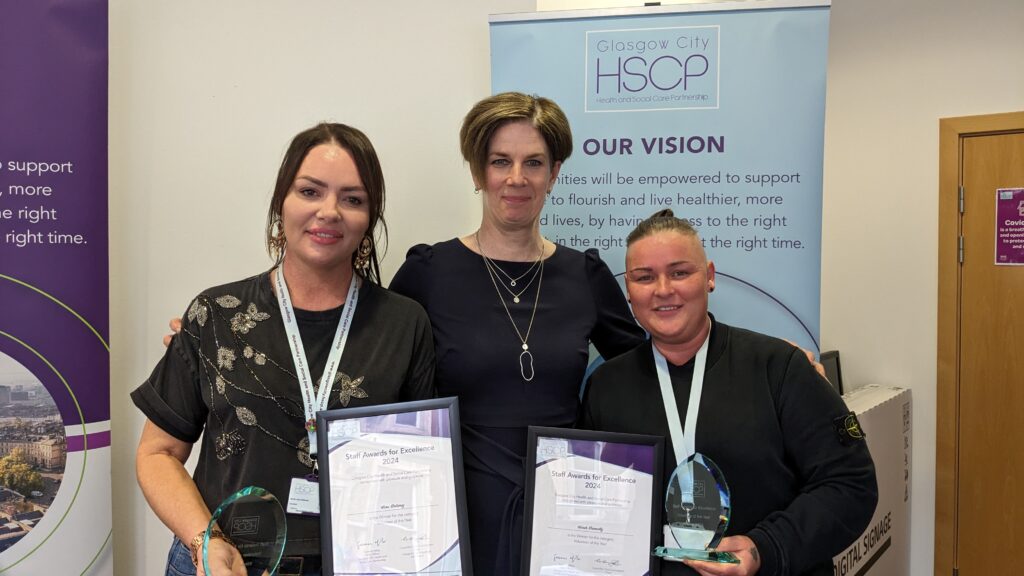
Both Sarah and Sara are lived experience volunteer mentors who support the work being done within Tomorrow’s Women Glasgow and Martha’s Mammies.
Since starting their volunteering, they have transformed the team through their experiences. They are highly motivated and give up their time to attend various groupwork activities and support the delivery of the programme and identify women who may require additional 1to1 support. In the past year, they helped establish a Recovery Café in Maryhill.
This café supports women in custody to ensure they are supported to maintain a drug and alcohol-free lifestyle that helps to prevent reoffending behaviour. The women attending consistently express their gratitude for both volunteers and the support they receive.
Human Resources & Organisational Development
Overall Winner – Teaching and Learning Centre (TLC) Reception Team

Overall Winner Nominees
Team of the Year
Teaching and Learning Centre (TLC) Reception Team
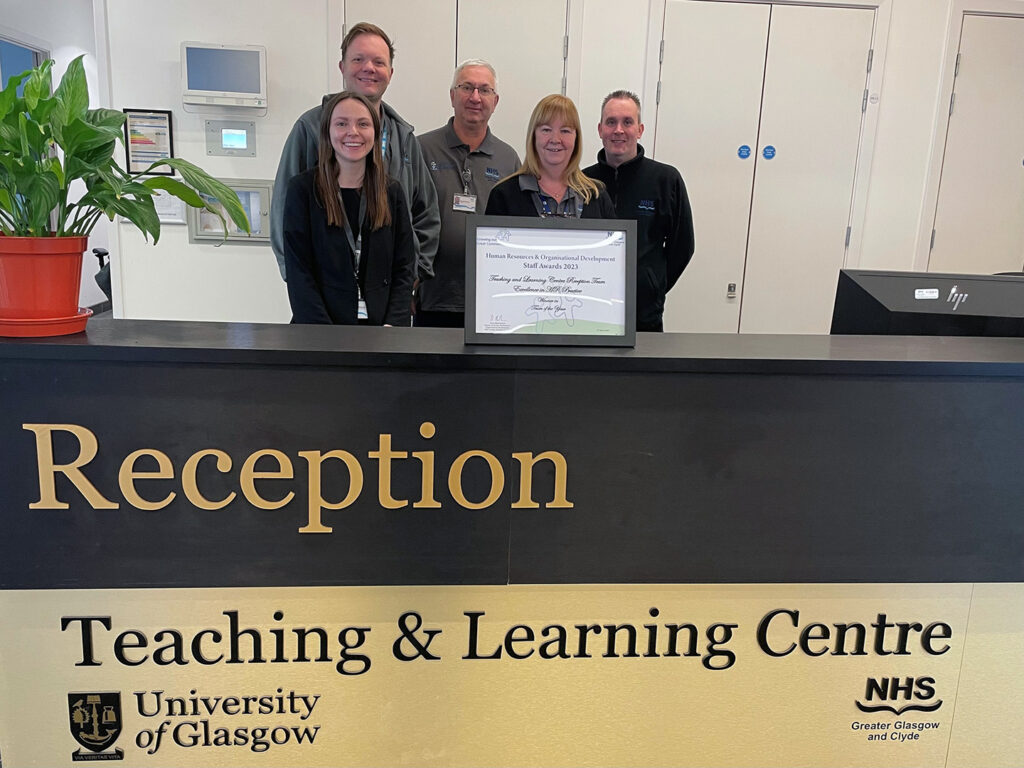
The Teaching and Learning Centre (TLC) Reception Team, QEUH Campus are nominated in the category of Team of the Year in recognition of their contribution to the return of the TLC back to its original purpose as a joint teaching and learning facility for NHSGGC and University of Glasgow. This followed on from a period during the COVID-19 pandemic when the Centre was requisitioned as a national testing laboratory and was closed to teaching and learning to provide this service for the duration of the pandemic. The team continued to work together throughout this period providing a physical frontline support to staff and contractors.

Employee of the Year
Krizia Mazzoni, Assistant HR Advisor, Cluster 1, HRSAU
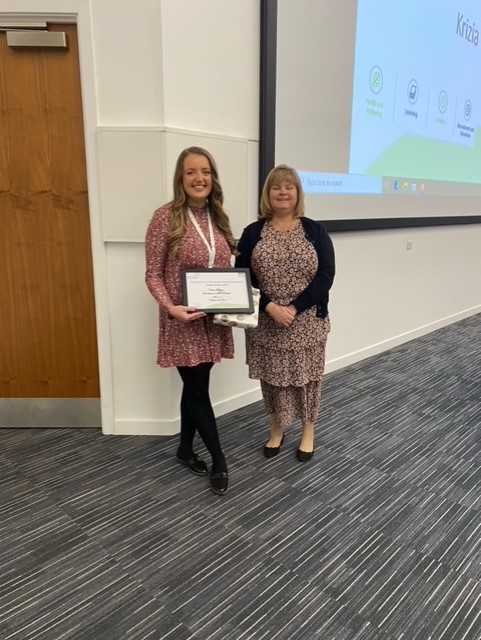
Krizia goes above and beyond her role as Assistant HR Advisor in the support she provides to managers for attendance management. Krizia has been fundamental to the coaching and training provided to managers in Clyde Sector and continues to offer support at absence focus groups.

Leader of the Year
Steven Reid, Mental Health and Substance Nurse Lead
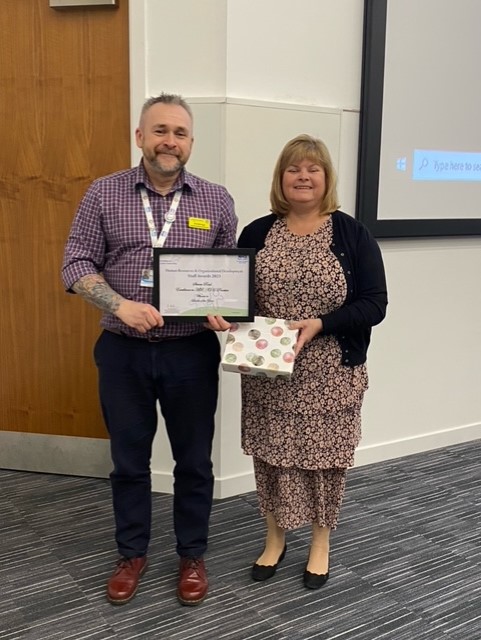
Steven Reid started in Occupational Health as a full-time employee in 2016, following his background career as a mental health and addictions nurse. His original role was as OH alcohol and substance nurse from 2012, he was then asked to take over the management and development of the workforce Counselling service. This service was responsive through the pandemic and evolved to be part of the wider provision of psychological services for our workforce and is a core part of our Staff Health Strategy.

Innovation of the Year – Joint Winners
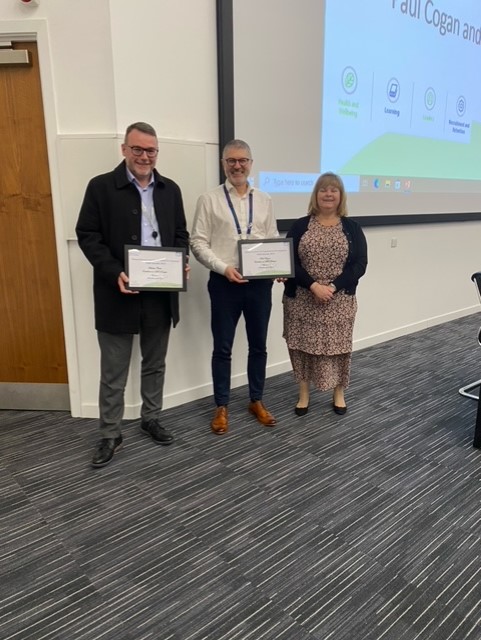
Andrew Clark
Andrew developed and refined the Business Intelligence dashboard for the SHaW Task Calendar. This included building specific filterable data pages alongside the Sector / Directorate / HSCP summary pages that feature in the SHaW Storyboards.
Paul Cogan
Paul leads on the Success Register Workstream of the NHSGGC Culture Strategy for the Organisational Development team. The NHSGGC Acute and Corporate Organisational Development team took on the challenge of establishing a platform for over 41,000 colleagues to share success stories, nominate instances of excellence, and highlight innovative practices. In response, Paul Cogan undertook the project lead role for the Success Register for the Team.
Volunteer of the Year
One HR Team
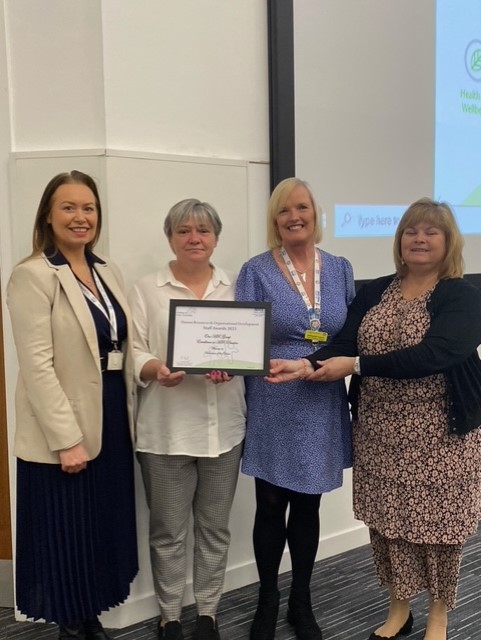
The One HR project team brings together teams from across the HR&OD Directorate to create a sense of one team, with a unified purpose, of enabling a skilled, engaged and healthy workforce across NHSGGC that is valued, supported and empowered. The OneHR group will support this by sharing best practice, adopting shared ways of working and creating opportunities for our teams to mix, socialise and get to know each other.
HR and Organisational Development – Director’s Award
Claire Robertson
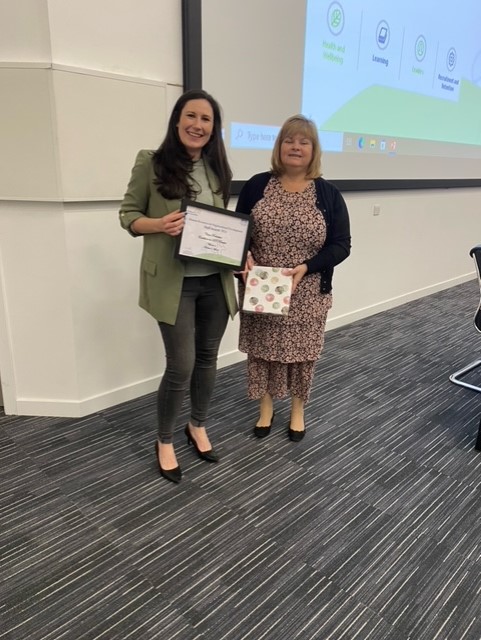
Since joining NHSGGC in 2020 from South Africa, Claire has done an amazing job in cultivating a high profile and confidence with the Directors, SMTs and wider teams in the areas that she supports. Her instrumental role in supporting and progressing success for NHSGGC Clusters in the Investors in People Award is recognised with this Director’s Award.
Inverclyde HSCP
Overall Winner – Aileen Wilson

Overall Winner Nominees
Team of the Year
Strategic Commissioning Team
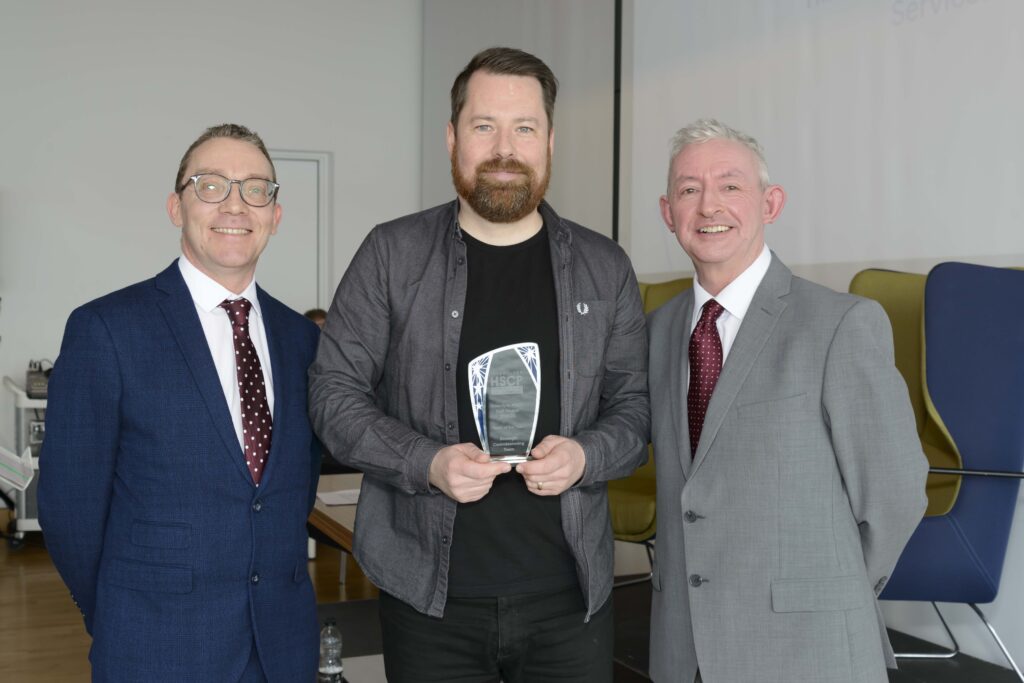
The strategic commissioning team support the HSCP with commissioning, governance and contract monitoring of services with external providers. The HSCP commissions approximately 175 services with external third sector and private providers covering a huge range of areas.
The team work hard to evidence the need for commissioned services and manage the procurement for the service – they work to tight timescales and must be adaptable to the changing landscape of health and social care.
The team demonstrate excellent management and communication skills to work with commissioned services to ensure targets are met to benefit people in Inverclyde receiving care. The teams workload reflects the huge range of services Inverclyde HSCP delivers.

Employee of the Year
Heather Millar
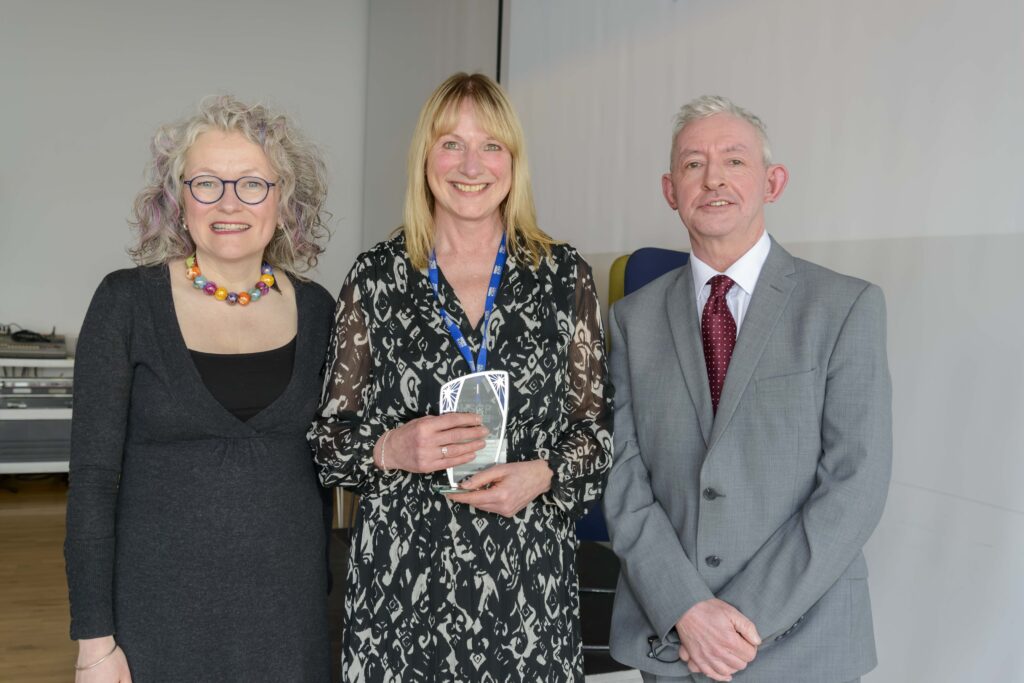
Heather has worked with HSCP for around 20 years within learning disability day operation services in a support worker role.
Heather has been pivotal in the setting up and delivery of the HSCP Autism Pilot Service to meet the needs of young Autistic people. She works tirelessly to support vulnerable young people and is a fierce advocate for their wellbeing.
Heather built up relationships with young people over a long period of time and in some cases helped give them the confidence to leave the house; one young person she supports who struggled to leave the house has now passed their driving test and attends college.
Heather is described as self-effacing, unassuming, genuine, funny, warm, and a joy to work with.

Leader of the Year
Aileen Wilson
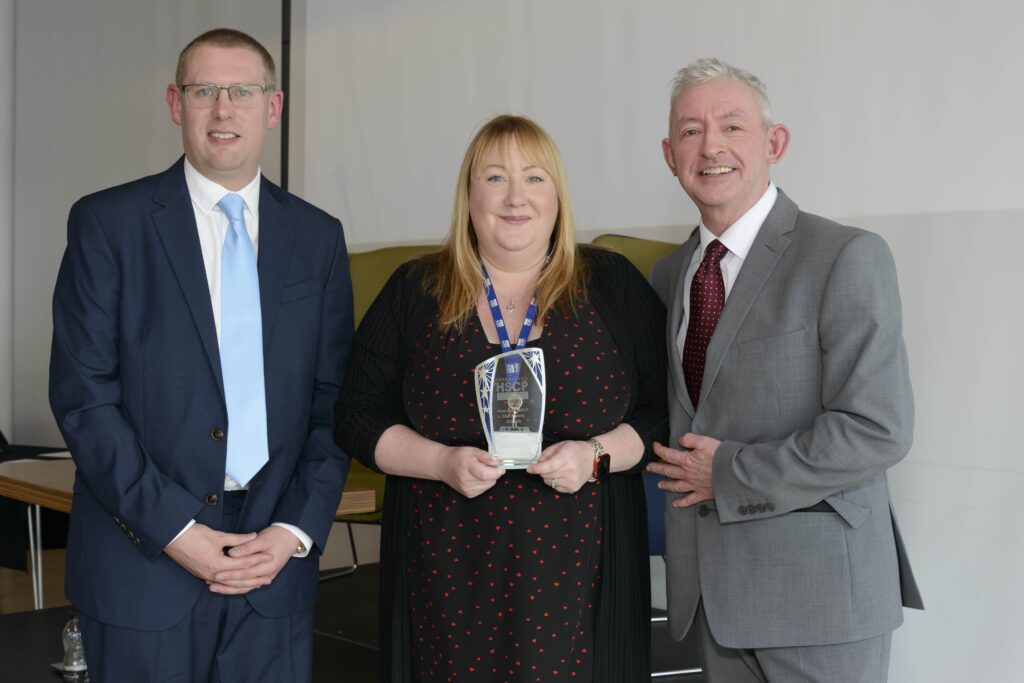
Aileen manages 3 children’s houses which include a large staff team.
Aileen is dedicated and committed to providing a high standard for care and her values are rooted in compassion and the rights of children.
Many of her colleagues describe her as being a great problem solver who finds solutions to many difficult situations which arise at short notice.
Aileen is committed to working to the strengths of her staff she is a great communicator and listener. Aileen has developed a culture of trust whereby our children’s voices are listened to by staff and their views are taken seriously.

Innovation of the Year
Neil Cree & Asylum Health Community Team
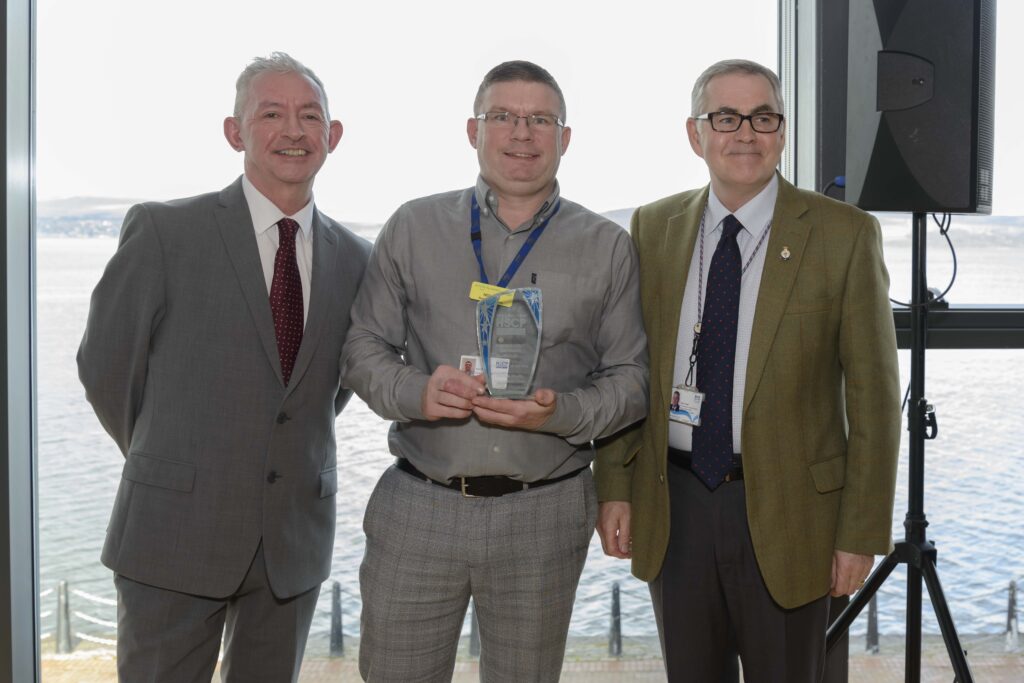
Neil Cree and the Asylum Health Community Team were unexpectedly tasked with accommodating 70 refugees. At very short notice, the team had to create procedures and referral pathways to assess the health of the refugees and link them to wellbeing support in Inverclyde. They had no additional funding and faced many challenges.
This team has went beyond expectations and are now supporting other HSCPs and Health Boards to develop services similar to what we now have in place within Inverclyde. The team work closely with outside partners to deliver exceptional services, and by having this team in place we have reduced a lot of strain on other partners.

Volunteer of the Year
Veronica Rasmussen
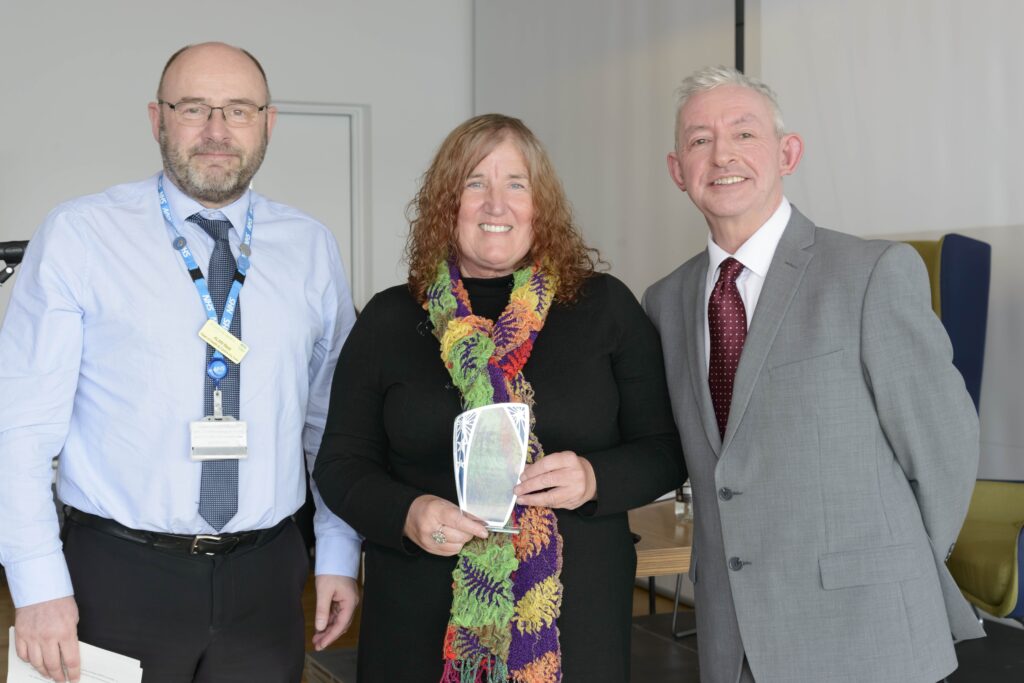
Alongside her role in the Homelessness Centre, Veronica has recently gained a first-class honours degree in psychology and also the COSCA Certificate in Counselling Skills.
Then on top of this, Veronica volunteers in a range of roles to support the most vulnerable people in our communities including: volunteer with Talk On Ladies (part of the Man On! Charity in Inverclyde); Committee Vice Chair Oak Tree Housing Association; Children’s Panel Member; Unison Workplace Steward. Veronica is described by her colleagues as inspirational, selfless and goes above and beyond whilst working tirelessly in her role.
Pharmacy Services
Overall Winner – Michelle Stevenson

Overall Winner Nominees
Team of the Year
Northeast Health and Social Care Partnership, Parkhead Cluster Pharmacy Team
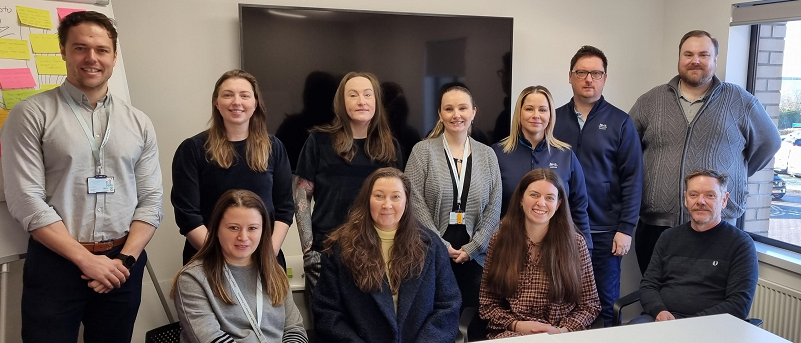
Since recruiting a full complement of technical support in 2023 our fantastic technicians, Pharmacy Support Workers and Pre Registration Pharmacy Technicians are now delivering a medication reconciliation service for all immediate discharge letters and outpatient letters with medication changes consistently 5 days per week throughout the year and we are the only cluster doing so within the HSCP.
Our pharmacy technicians have been able to maintain this excellent standard of work with minimal pharmacist input for queries. In addition, we have even been able to provide cross cluster cover to maintain the services provided by other cluster within the HSCP during absence.

Employee of the Year
Susan Donnelly

Susan is often the first person that people contacting the prescribing team or the wider Clarkston Court Pharmacy Team come into contact with. Her years of experience working in a GP practice mean that she is equally comfortable talking to patients as she is to senior managers and directors.
Her many years with the prescribing team means that she has a comprehensive knowledge of all staff and all aspects of the business management for the team.
She is unfailingly helpful, reliable, knowledgeable and efficient. She cares deeply about the welfare of people in the team and their development. She displays many fine leadership behaviours and is instrumental in keeping the administration team a cohesive, happy and effective service.

Leader of the Year
Michelle Stevenson

Michelle is a unique person who is distinguished by her extraordinary capacity for inspiring others and her superb interpersonal abilities. She naturally builds great relationships with co-workers, managers, and subordinates due to her charming and personable manner. Because of her sincere interest in people, Michelle is able to identify their wants and worries, fostering a supportive and cooperative work atmosphere.
Michelle is an amazing motivator who can motivate and inspire her peers to realize their own potential. She gives everyone around her confidence and enthusiasm, whether it’s by setting an example, offering helpful feedback, or encouraging words. Michelle’s ability to inspire others goes beyond personal success; it has a favorable effect on the atmosphere of the entire organization.

Innovation of the Year
Surgical Team, Queen Elizabeth University Hospital
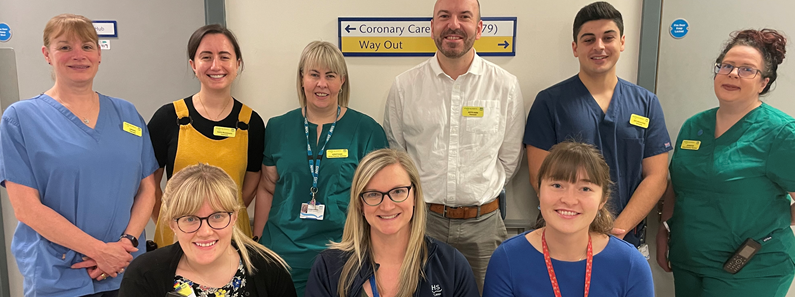
This team comprising pharmacists and pharmacy technicians has worked together to change the way in which we deliver services to patients undergoing surgery within GGC to support surgical remobilisation.
Changes include development of a pharmacy referral system, review of systems for patient triage and development of the pharmacist’s role in the arthroplasty and perioperative clinics.
This team worked together, changing the traditional service, trying small tests of change and working differently including developing the patient facing role of pharmacy technicians as well as developing their advanced practice.

Director of Pharmacy Award
Manpreet Narwan

Mani highlighted that we only recognised Christian holidays when we wished the community pharmacy network well via the local communications.
Mani worked with the Board’s Equalities Team to identify the most relevant religious holidays taking into consideration the demographics of the pharmacy workforce. She then worked with the Board’s Interpreting Team to devise a form of congratulations and best wishes for the main holidays.
Mani has pro-actively taken responsibility for developing the Community Pharmacy Development Team’s profile amongst the community pharmacy network. She has drafted documents developing the Team’s Mission and Vision and is currently working on how we can develop our communications strategy to better explain how the Team can support the network.
Public Health
Overall Winner – Community Food Teams

Overall Winner Nominees
Team of the Year
Travel Health Contingency Team
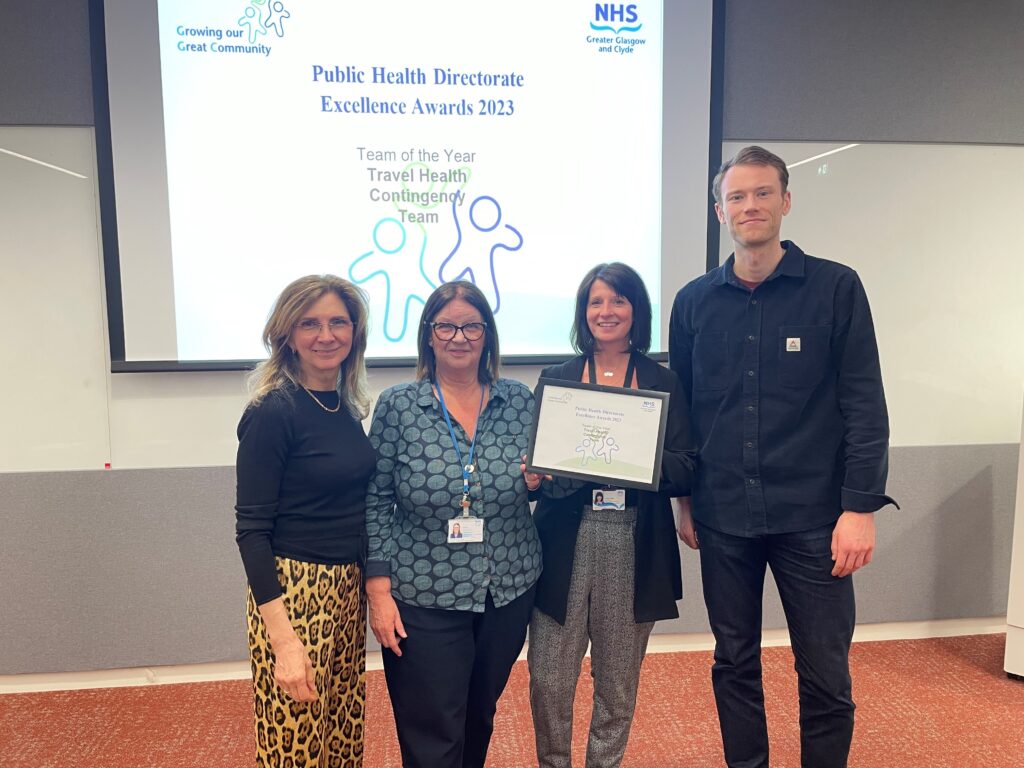
In June 2023 the provider to all of GGC except Glasgow Northwest, notified NHS GGC of its intention to withdraw from it’s contract to provide travel health risk assessments and vaccinations by end of September.
However due to staffing and other core service delivery issues this service was in effect withdrawn in August.
Despite this short notice withdrawal, a Contingency Service was in place within a week. To pull together the logistics of a new service at such speed is a testament to the dedication, professionalism and sense of duty of all those involved.
Without the actions of the team, the population of GGC would have been without a free-at-the-point-of-access travel service and risking a widening of travel-associated health inequalities.

Employee of the Year
Kary O’Brien, Health Protection Nurse Specialist
We have a great team of HPNS, all of whom deliver their daily health protection work with incredible empathy.
Even amongst such a great team, Kary quietly and without any fuss, stands out in the kindness and warmth that she brings to all of her interactions, be it with cases and contacts or with her colleagues. Without exception, she is very much liked and respected by absolutely everyone. Kary is warm, funny and with a unique insight into other people’s emotions.

Leader of the Year
Dr Iain Kennedy, Acting Head of Health Protection
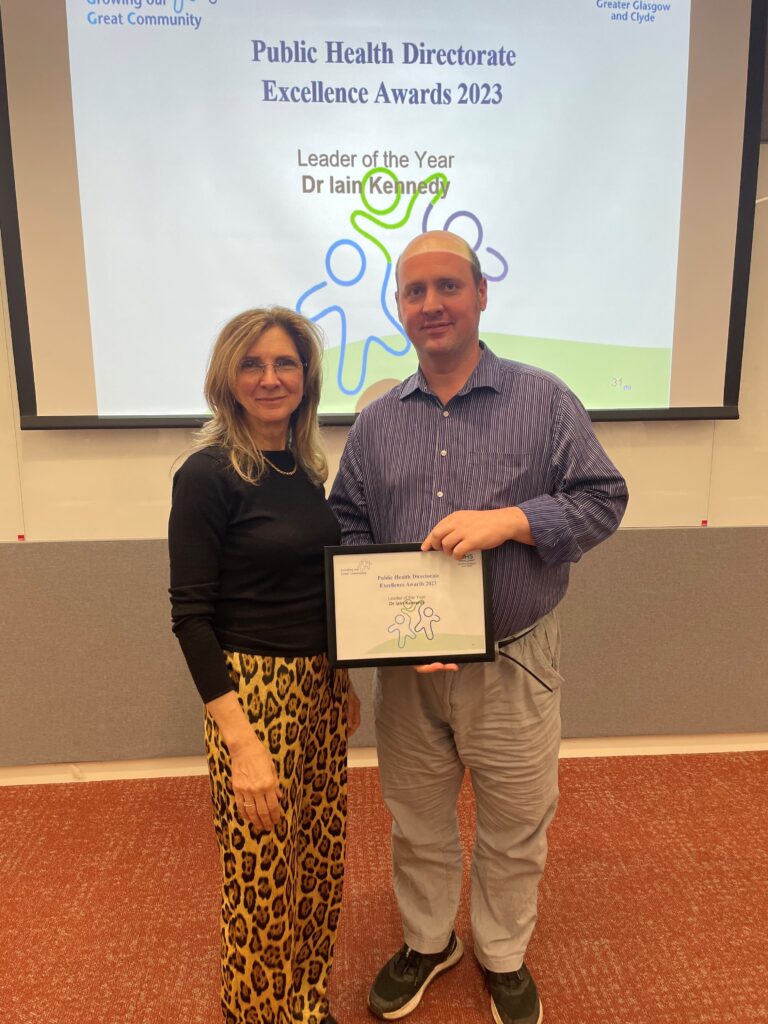
Dr Kennedy has provided calm leadership of the Public Health Protection Unit team over the last year during something of a post-Covid transition period, with challenges and changes for the team including an increase in working pressures and staff changes within the team.
Iain has always shown good leadership and been calm and approachable, and is very willing to share his expert knowledge with the team, encouraging skills development in staff members. Alongside the day job of leading acute health protection responses and managing his consultant portfolio he has also done a great job of identifying areas for team development and encouraged initiatives aimed at team wellbeing including some informal team building activities.

Innovation of the Year
Cost of Living Mitigation Programme
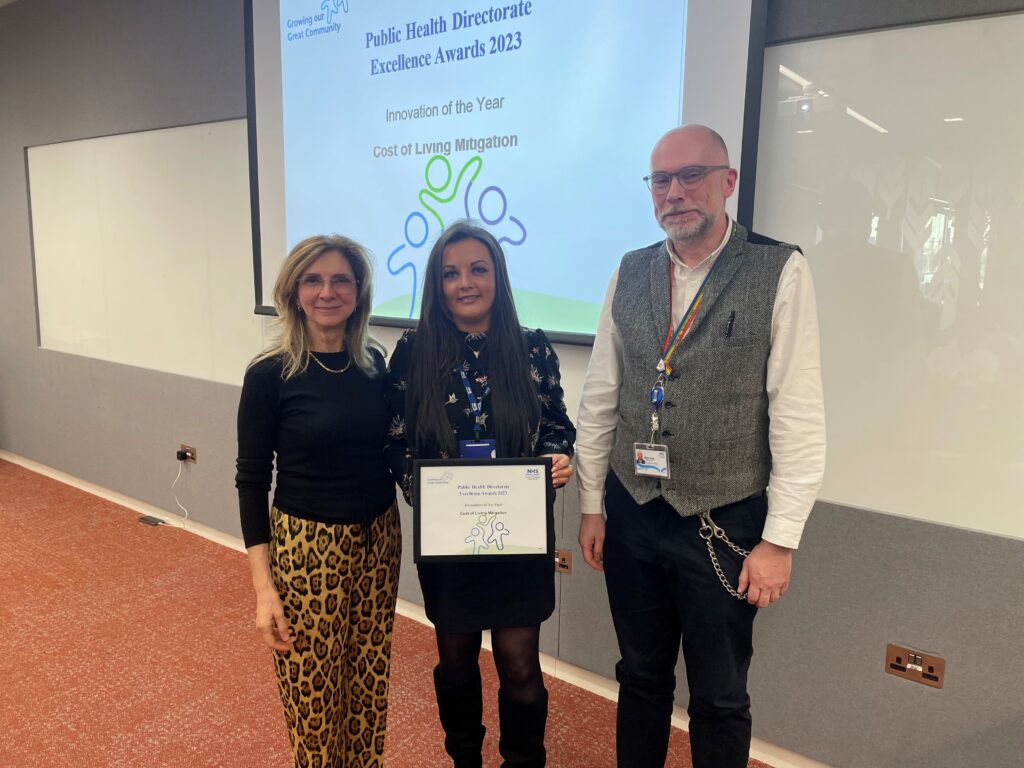
The team work across acute settings and have developed a range of innovative approaches in response to cost of living pressures impacting on Patients and Carers attending NHSGGC Hospitals.
The package of support includes access to a menu of immediate cash first & practical responses such as Maternity Emergency Grant (MEG); Crisis Home energy service and the Emergency Food on discharge service which have collectively support approx. 2000 of our most disadvantaged patients over the last year. They also meet challenges facing our staff with a comprehensive package of emergency response to support food, fuel and money was introduced to support the wellbeing
of NHSGGC Staff. The NHSGGC Staff Hardship Grant has supported almost 500 staff through a grant secured from endowment funds.

Volunteers of the Year
Community Food Teams
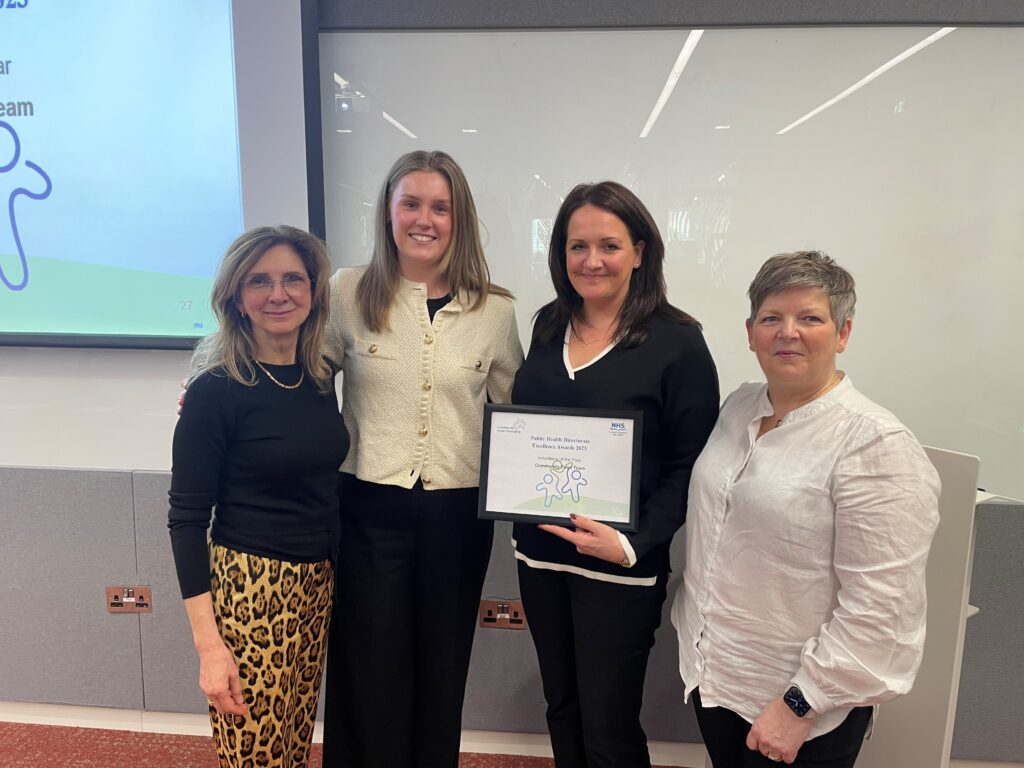
The Community Food Team works to address barriers to healthy eating, weight management and food insecurity through the development of local community-based support networks which aim to increase availability, affordability and accessibility of healthy food and provide support to increase food literacy and practical cookery skills within communities. We recognises the multitude of volunteers who collectively support the delivery of the programme within the many community health projects who are critical partners in the GGC Community Food Network.
The programme builds capacity at a local level and supports a network of volunteers to train as community chefs and deliver practical cooking sessions to communities. Volunteers are supported to gain skills not only in cookery, but also in food hygiene and health and safety that supports wider employability outcomes longer term.
Regional Services
Overall Winner – Graeme Crockett

Overall Winner Nominees
Team of the Year
The STAR team
STAR is a specialist service that focuses on the successful integration of offenders into society, emphasising their role as productive members of the community. The STAR team focuses on reducing risk of violence in the community and improving mental health outcomes for patients with complex presentations. The treatment works towards positive outcomes in terms of helping patients to make prosocial choices rather than engaging in offending behaviour, improving mental health of service users, and enhancing their overall well-being. STAR also reflects a commitment to treating service users with dignity and respect. The Team approaches the service to ensure that there is balance between public safety and the well-being of offenders

Employee of the Year
Graeme Crockett
Graeme has gone above and beyond for the second year in a row in his efforts to boost the successful recruitment of band 5 nurses for Forensic Mental Health. He has volunteered for every recruitment event and has been filmed as the Regional Services representative for GGC recruitment video as well as a Forensic specific recruitment video.
The service has one of the highest band 5 vacancy rates which has a significant impact on the delivery of safe and effective patient care and increases the strain on our current staff group. He has helped raise the profile of the service and bring in new staff to join our teams. From an organisational perspective increased staff has helped boost morale and in turn has a positive effect on sickness absence rates as well as helped reduce additional spend attributed to vacancies.

Leader of the Year
Diane Wright
Diane is the Lead Nurse for Renal Dialysis Units at a time of acute challenges with insufficient haemodialysis spaces to meet demand. Diane has led her team to complete a comprehensive review of capacity across the service. Through service redesign, she introduced twilight services increasing capacity. Diane has developed the team to review and promote home therapies, increasing care options for this group of patients.

Innovation of the Year
Haematology Ambulatory Care Service
A project team was identified which included the appointment of an Advanced Nurse Practitioner and a Nurse Practitioner, who were supported by the Lead Nurse, Pharmacists, Estates and Consultant Haematologists to take forward. This project was completed in August 2023 and is now fully operational with patients having their treatment as a day case as opposed to having to stay as an inpatient.
A non-clinical space within level 4 at the BWoSCC was identified and an area created for a 4 chair space ambulatory care service with 2 nurse assessment rooms. This new service has allowed more patients to be treated at home in line with our SACT Strategy and patient feedback has been very positive.

Volunteer of the Year
Lesley Ong
Lesley maintains the NRU garden voluntarily. She works in NRU as a nurse but comes in on her days off to tend to the garden. This garden makes a real positive impact on the morale of NRU patients and staff. Having this area maintained regularly means it is always welcoming and creates a positive outdoor experience for patients and families. Lesley involves the
patients where possible with planting, weeding and watering. These functional tasks are excellent rehabilitation for patients.
Renfrewshire HSCP
Overall Winner – Delayed Discharge Team

Overall Winner Nominees
Team of the Year
RAH Ward 37 – Multidisciplinary Team
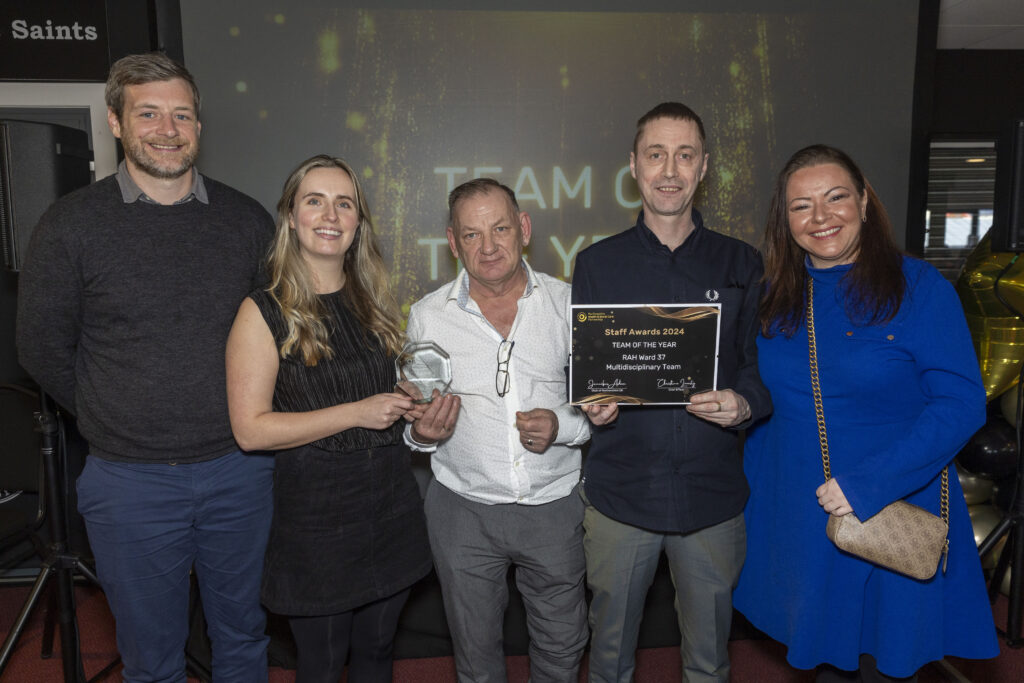
This group of staff are the epitomy of a gold standard team.
In June 2023, Legionella was discovered in the water supply for Ward 37. To keep patients and staff safe and to replace parts of the water system, the ward was decanted to Munro Ward in Stobhill Hospital.
The team pulled together to transfer all of the patients and equipment safely and with minimal disruption within a very short period of time. The staff had to make a 30 minute trip, twice a day, to get to and from Munro Ward.
Due to multiple factors the works took five months to complete.
Through all of this, the staff put the patients and relatives first. Ensuring that the high standards of care that were provided in Ward 37 were replicated.

Employee of the Year
Jennifer Phillips, Community Learning Disability Nurse
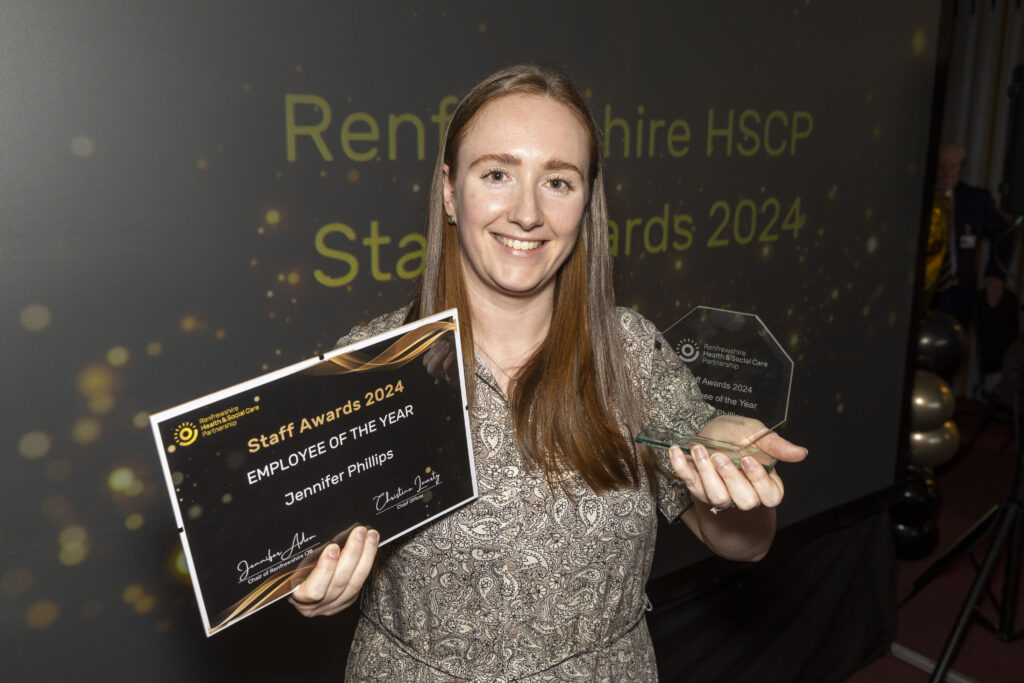
Jennifer always goes above and beyond to ensure her patients are well cared for and have their every need met. An example, of the work Jennifer regularly does which demonstrates her dedication:
One of Jennifer’s patients was bed bound and required support for all moving and handling. Due to this, she had been unable to have a cuddle in bed with her husband for a long time and this was of huge importance to her. Jennifer managed to work out a way that she could make this happen, although this was not a routine task for a CLDN. This meant so much to both of these individuals and led to an immediate improvement in their mood and wellbeing.

Leader of the Year
Yvonne Du Pon, Team Leader, ‘Doing Well’ Community Mental Health
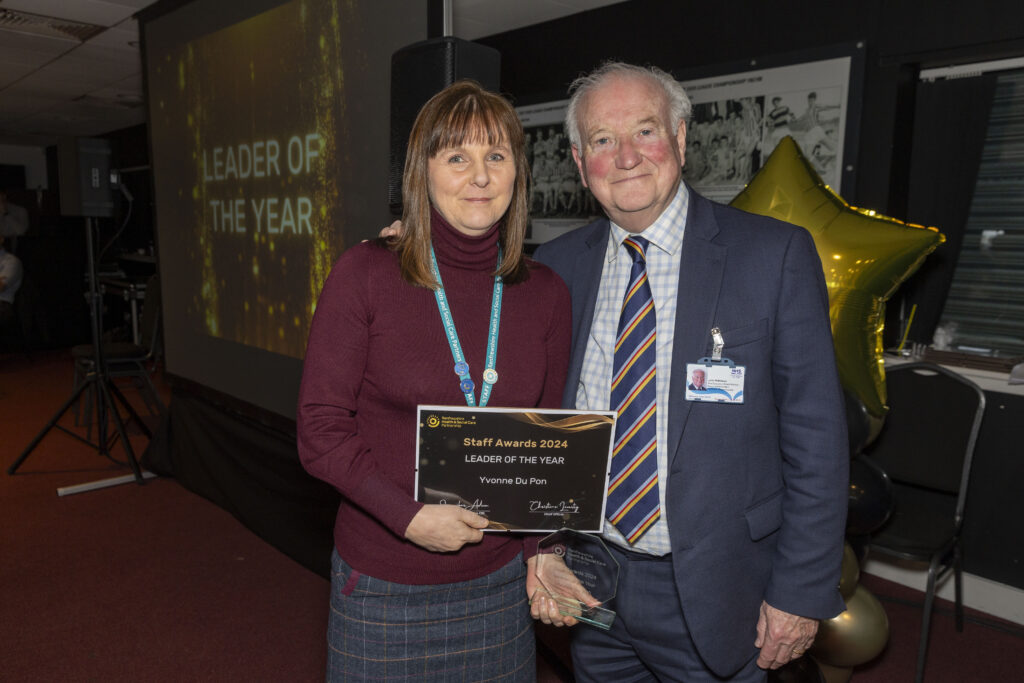
Yvonne is an inspirational leader, dedicated to her staff and patients. Yvonne worked endlessly to identify key areas that required improvement within the ‘Doing Well’ service.
By working with staff to support them to rectify issues and support changes, long waiting times were dramatically reduced. Yvonne has manged to achieve their assessment to treatment target and there is currently no waiting list for patients starting treatment.
Without this support and clear direction and guidance the goals and achievements today would not have been possible.
Yvonne’s character is a testament to her hard work and dedication, which has ensured the success of the teams that she directly manages.

Innovation of the Year
Care Home Nursing Support Team
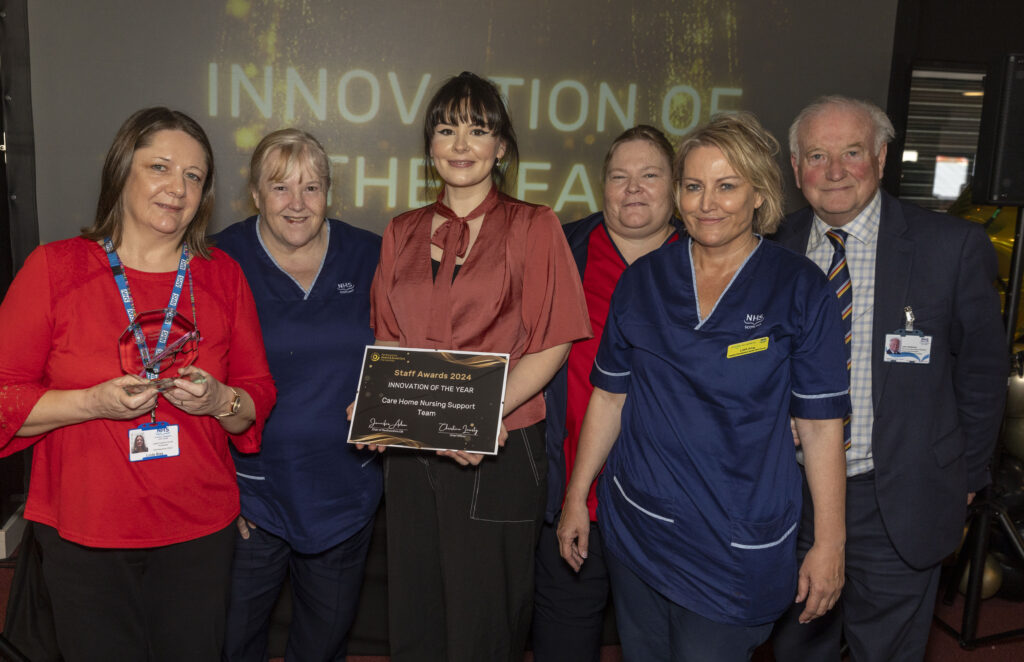
A collaborative approach to prevent unnecessary admissions to hospitals from Care Homes in Renfrewshire. Established in 2020, the Care Home Nursing Support Team has developed and grown into a team of nursing professionals who provide support to residents, families and staff in care homes.
Comprising advanced practitioners, care home liaison nurses and practice development nurse who can respond quickly and visit people in care homes requiring urgent unscheduled assessments.
Taking both a preventative and reactive approach have been key in supporting better outcomes for care home residents.
The team provides service across all 23 care homes in Renfrewshire and two on the Inverclyde border.
In the last year they have provided direct assessment to 772 care home residents resulting in 3048 consultations from which only 8% needed referral to acute services.

Community Involvement
CAHSC Project – James McGuire
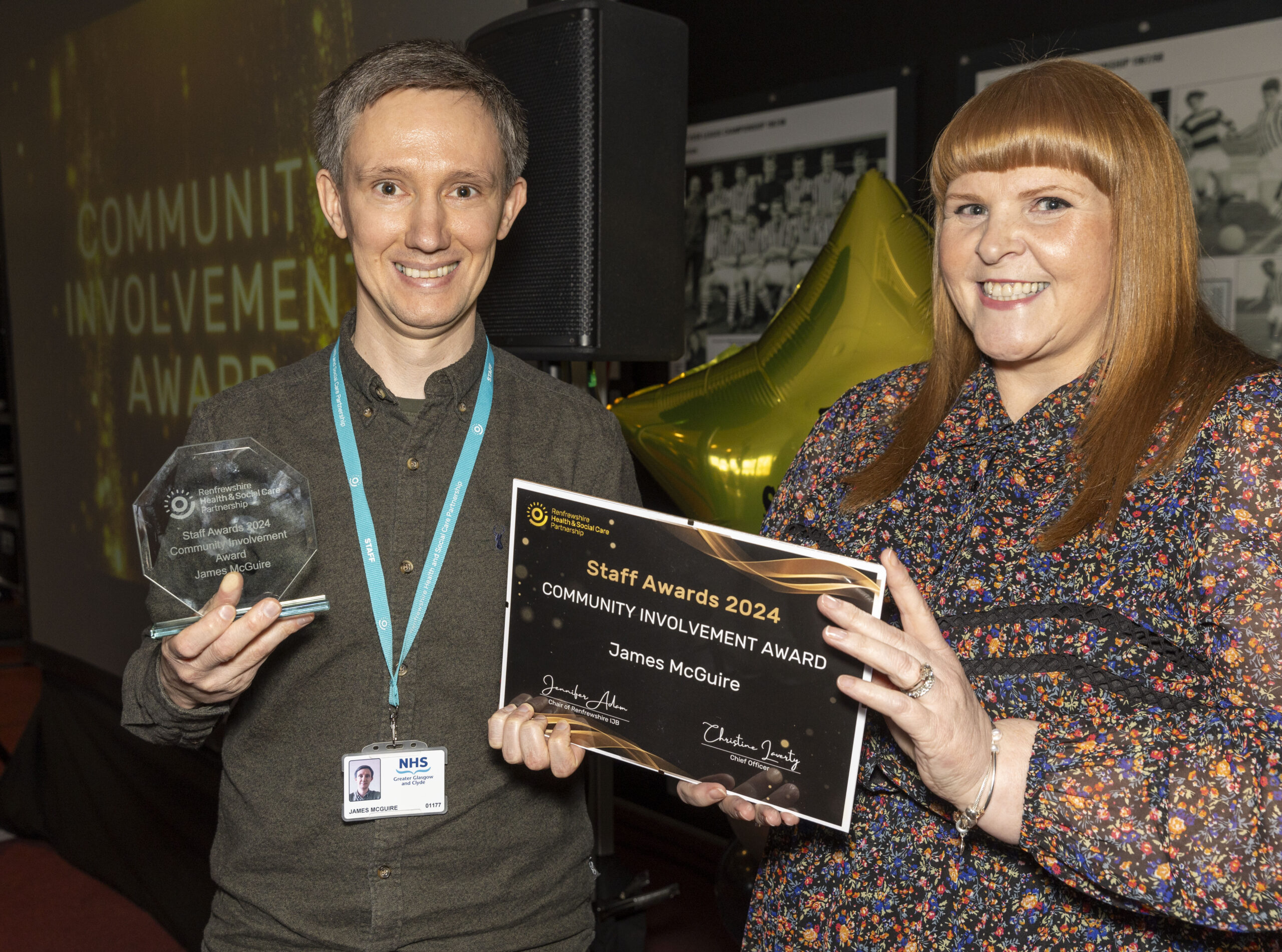
As part of his Culture and Arts Co-ordinator role, James developed and administered two small grants funding pots for local community groups and partners, including Renfrewshire Council, our HSCP and OneRen, to increase opportunities for local people living with the impact of inequalities to take part in arts and cultural activities.
James has also established excellent working relationships with a wide range of partners, particularly within the Community Wellbeing Network that he created and is managing alongside Engage Renfrewshire. This Network has brought together over 150 people from community groups, third sector organisations, arts practitioners, statutory organisations and the private sector to enhance wellbeing through developing understanding, appreciation and innovative partnerships.
James is a real asset to the HSCP and has made a difference to the lives of many people.

Best Supporting Role
Megan Achara, Community Treatment Room, Nurse Co-ordinator
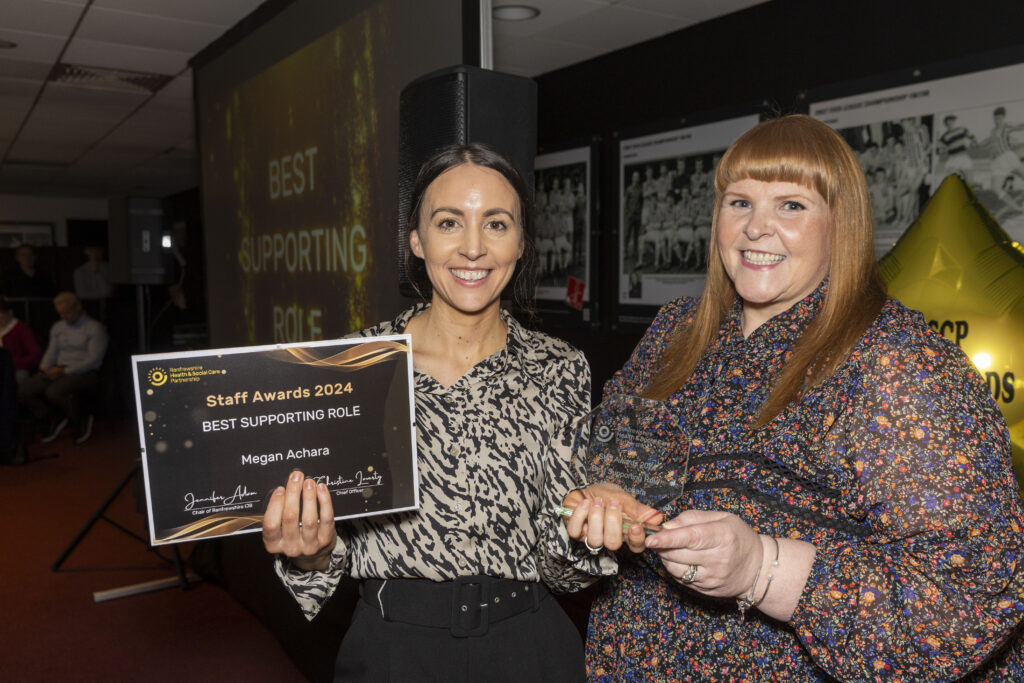
Megan she has been inspirational in the development of the new community treatment and care service. She is a great support to each staff member, together with her team lead, they coordinate the day to day running of 14 treatment rooms and 130 GP phlebotomy clinics per week.
Working closely with a range of clinical professionals, Megan will always go the extra mile to help as well as any of the treatment room nurses with clinical patient queries.
Megan’s phone is always ringing and is always visiting clinics and giving advice to patients and staff. Megan is always smiling and keeping her team afloat. She is a real people’s person, has an eye for detail and her positivity is a breath of fresh air and is dearly appreciated by everyone she works with.

Improving Our Workplace
Laura Docherty, Business Support Manager
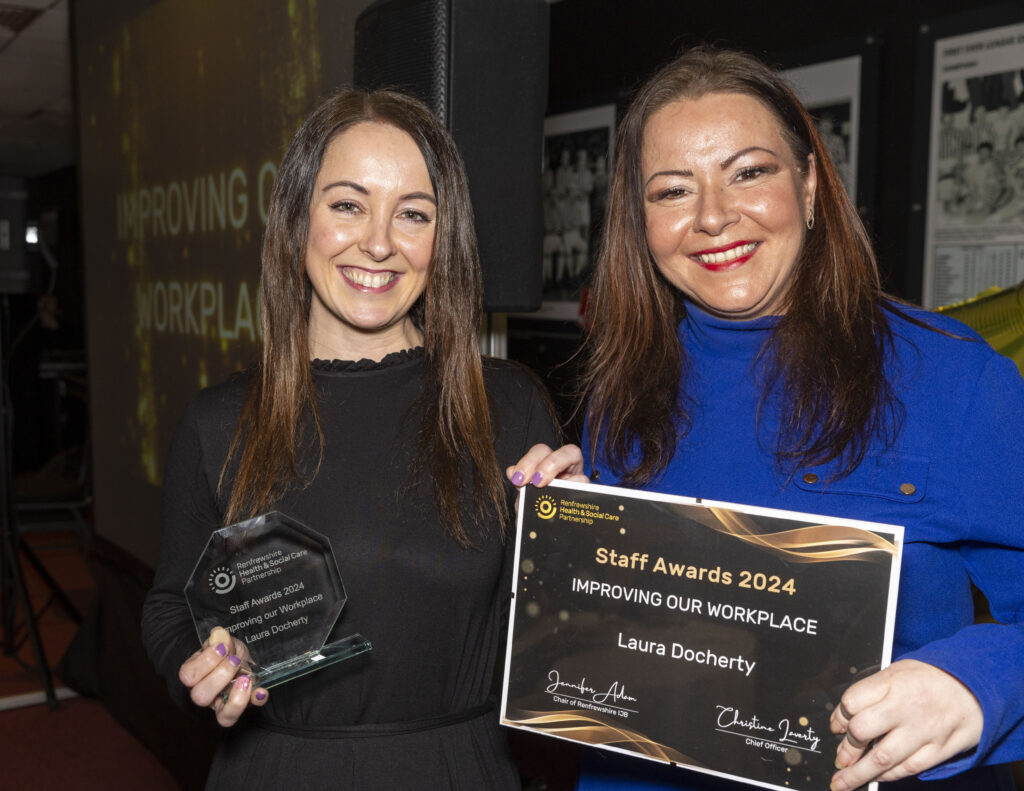
Laura has made significant improvements to how her team within admin and business support function.
Over the past year Laura has been instrumental in supporting, participating and implementing the findings of an admin and business support review.
Introducing training opportunities for her team, acting on the development needs of staff and improving overall morale.
Laura has focused on the importance of maintaining a positive team ethos and culture, as evidenced in the team’s iMatter results, which are consistently improving.
Laura is solution focused and always delivers on any ask of her or her team no matter how complex or time constrained.
Laura is always calm and level headed and that shines through in the way the team work – it is a real testament to her strength as a leader.
Chief Officer Award
Delayed Discharge Team
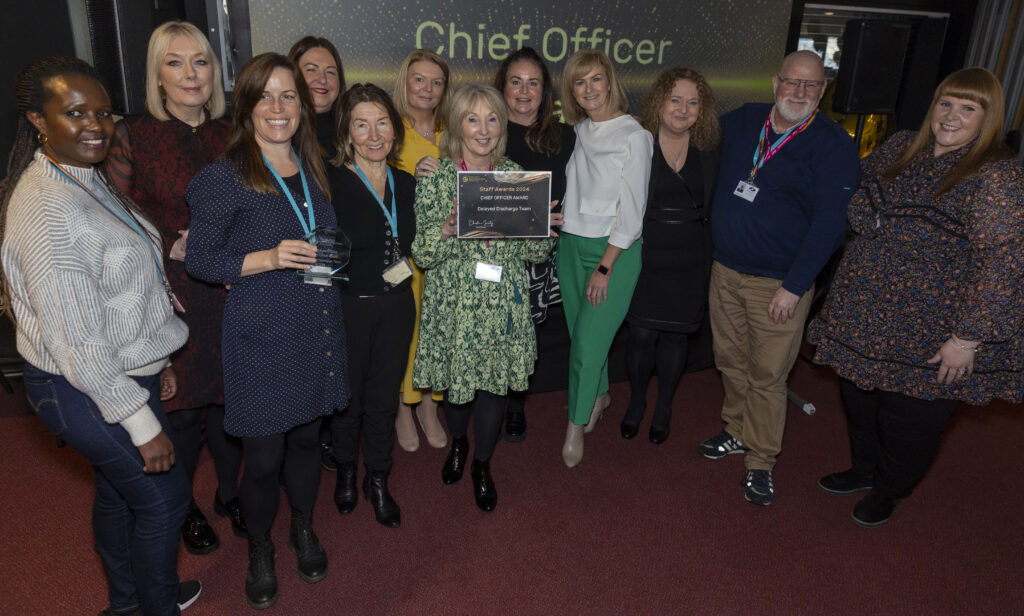
The team work closely with acute colleagues, ensuring that every person who requires support from our community services, upon discharge from hospital, receive the right support, without delay.
The team pride themselves in working closely with the person and their family to ensure that the wishes and expectations of all concerned are at the centre of their planning and that they are treated with care and compassion.
They have adopted a ‘one-team’ approach across all our community support services, including our external providers to ensure that that person is a priority for the whole service.
Since its establishment, the team has shown commitment, motivation and an immense sense of pride in their performance, which has made Renfrewshire the highest performing HSCP in Scotland for Acute standard delays in the period April – September 2023.
West Dunbartonshire HSCP
Overall Winner – Morven Cowie, Senior Charge Nurse, Older People’s Wards, Vale of Leven Hospital

Overall Winner Nominees
Team of the Year
HSCP Finance Team
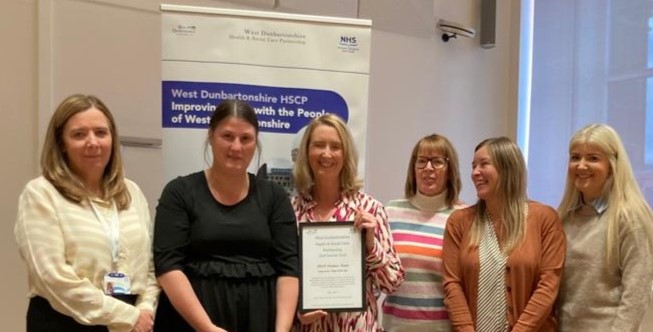
The Finance Team is one of the “unsung heroes” who regularly demonstrate outstanding leadership during very difficult times. They are inspirational and continuously enable West Dunbartonshire HSCP achieve important outcomes.
The impact of their work reaches across all functions within the organisation, delivering expert guidance and structure every day with professionalism, patience and integrity. They willingly share learning and experience, ensuring that there is always partnership working.
Often going above and beyond the call of duty, especially during periods of significant pressure, this Team fully meets the criteria for this Award by “epitomising our values and continually demonstrating positive behaviours”.

Employee of the Year
Laura Goodwin, Policy Assistant
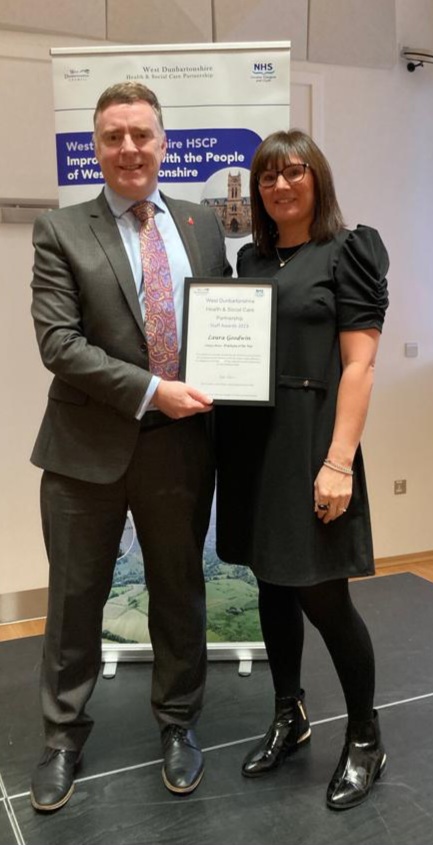
Laura has the unenviable task of dealing with the complaints and enquiries received by West Dunbartonshire HSCP.
But her diligence, attention to detail, professionalism and gentle persistence, has been acknowledged by her colleagues, as well as her desire to make a positive difference in all that she does.
Laura is generous with her time, supporting colleagues and managers with helpful guidance and information. She is forward thinking, highly organised, and willingly shares her knowledge with others. She has shown initiative by developing systems to provide greater clarity so that our services are aligned with Complaints Regulations.
And all this she does with a ready smile and the “patience of a saint”!

Leader of the Year
Morven Cowie, Senior Charge Nurse, Older People’s Wards, Vale of Leven Hospital
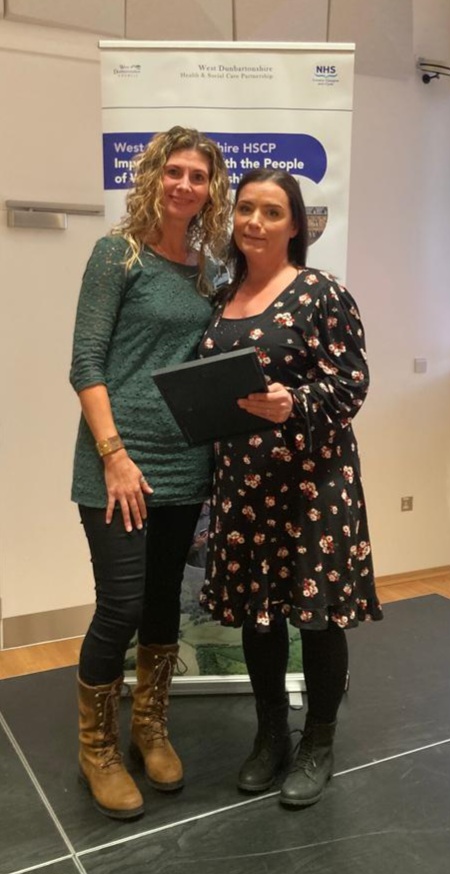
Morven has been described as an “exceptional and outstanding” leader by her colleagues.
Added to this, a recent Care Inspectorate Report cited the stability of the staff team to be a “testament to her leadership”, and families also praised her proactive approach.
Morven has worked with patients at the Vale of Leven Hospital for the last 28 years, and her dedication and commitment has not diminished.
Staff enjoy coming to work, and this is reflected in the care provided to patients and their families. Regardless of what challenges come her way, she overcomes them with a positive attitude, acting as a role model to her Team at all times.

Innovation of the Year
West Dunbartonshire Alcohol & Drug Recovery Service – Harm Reduction Mobile Unit
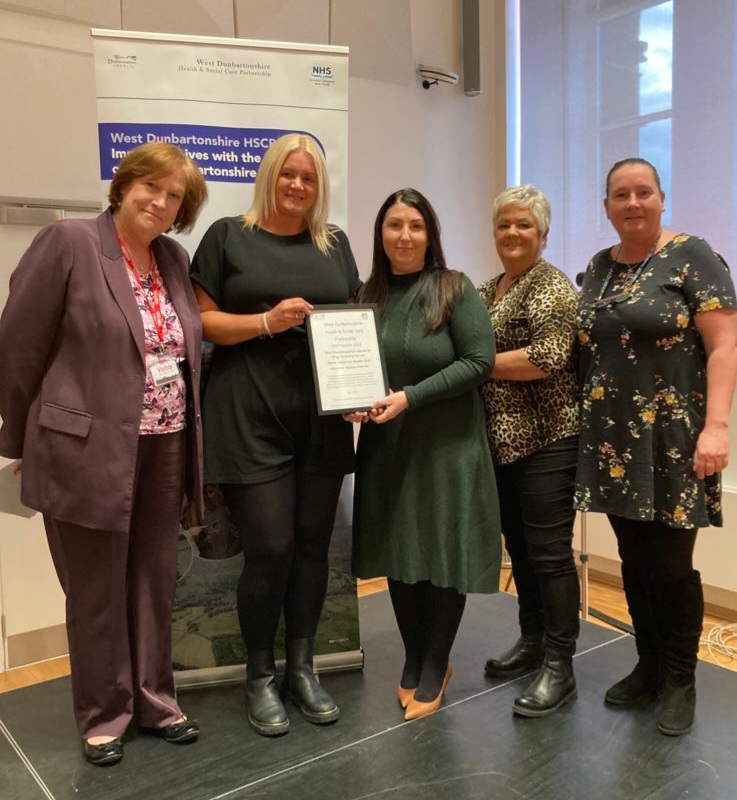
This unique service became operational in August 2022. It seeks to provide care, treatment and support to the most vulnerable people in West Dunbartonshire.
The Mobile Unit is staffed by a group of experienced Practitioners from Addiction Services who, in addition to their day jobs, visit a different location every evening. By removing barriers and building up trust, those in need can access treatment and support beyond normal clinic hours.
The Harm Reduction Mobile Unit does more than provide a service – it offers a lifeline to people who might otherwise not engage in traditional healthcare pathways, and gives them the chance to maintain a level of stability in their lives and the lives of their families.
Volunteer of the Year
Becky Dunphy, Advanced Practice Physiotherapist in Primary Care
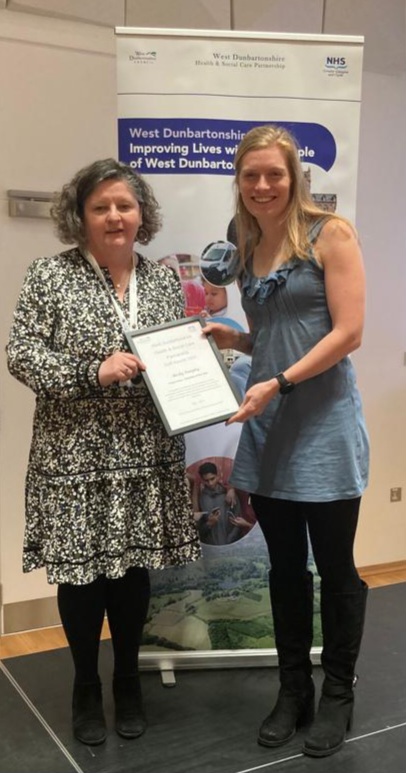
Becky is described by her colleagues as a very caring, compassionate individual who is extremely passionate about access to healthcare for all, regardless of background or circumstances.
In addition to her Physiotherapist role, Becky volunteers as a Lead Champion of Global Citizenship within NHSGG&C, promoting and facilitating global health work throughout the organisation.
She undertakes charitable work with the Dalitso Project, a charity seeking to improve healthcare in Malawi, and regularly travels there to undertake essential ground work to support ongoing projects, as well as supporting fundraising activities and events.
Becky is passionate about “making a difference and her motivation and enthusiasm is an inspiration to others.
Women & Children’s Services
Overall Winner – Nelly Delwani

Overall Winner Nominees
Team of the Year
Orthopaedic Trauma Liaison Nurses
The Orthopaedic Trauma Liaison Nurses have been awarded Team of the Year for their exceptional contributions to Orthopaedic care delivered to our patients and families. Serving as a central communication hub, they streamline processes, educate patients, and gather vital data for continuous service improvement. They facilitate smooth transitions, ensuring effective follow-up plans and supporting all staff during emergencies. Introducing innovative practices like virtual fracture clinics and trauma databases, they’ve significantly enhanced patient care and research capabilities. Their dedication to patient satisfaction is evident, with informal feedback praising their personalised approach. Operating as the first of its kind within paediatrics in Scotland, their impact within just 18 months is remarkable. Through teamwork, compassion, and unwavering responsibility, they’ve set a standard of excellence in patient care and interdisciplinary collaboration.

Employee of the Year
Katie Cameron
Katie has been honoured for her outstanding dedication and support to all staff at the RAH. Katie always goes above and beyond, for example; transforming the on-call room into a sanctuary for staff and organizing morale-boosting social events. Additionally, she initiated fundraising efforts to aid colleagues facing adversity. As an exceptional midwife and leader, Katie excels in diverse situations, from supporting lower risk midwifery led births to the most complex clinical scenarios. Her mentorship and support uplift her peers, reflecting her humility, competence, and proactive attitude. Katie is an exceptional midwife, leader, fund raiser and problem solver. With a steadfast focus on women’s well-being, Katie’s unwavering commitment to her colleagues and the community makes her a deserving recipient of this award.

Leader of the Year
Janice Heggie
Janice has been awarded for her exceptional contributions as a lead nurse, driven by her compassionate and caring nature. Every day, she positively impacts lives, embodying professionalism while nurturing and empowering her colleagues with her extensive expertise. Janice’s dedication to patient well-being is unwavering, putting their needs first and foremost. She serves as an inspiration, offering unwavering support to everyone she encounters. Janice’s genuine compassion shines through in her interactions, making her a truly remarkable leader. Her kindness and empathy set her apart, making her truly deserving of recognition for her natural leadership and outstanding commitment to care.

Innovation of the Year
Best Start AMU Project
The Best Start Alongside Midwife Unit (AMU) Project focuses on implementing a key recommendation from the Scottish Government’s Best start review: a full range of choice of place of birth for all women wherever they live. Women right across GGC now have the full range of choices about where to give birth: whether that is in a high risk labour ward, at home or in a homely alongside midwife unit.
Project midwives, Karen and Nicola, have co-produced with women and staff and have been innovative in their holistic approach to change – including developing bespoke training, clinical support in providing care in this setting, refurbishing rooms, installing equipment and developing new guidelines with obstetric colleagues.
Positive feedback from staff and women underscores the success of their efforts, highlighting enhanced care in the AMUs. The team’s demonstration of care, compassion, and teamwork while supporting staff through significant service changes reflects their commitment to excellence and improvement in maternity healthcare delivery.

Volunteer of the Year
Schwartz Rounds Team
The Schwartz Rounds team, have been recognised with the Volunteer of the Year award for their pivotal role in fostering a supportive environment for staff, and contributing to our Staff Health and Wellbeing objectives. Since its inception in 2021 and launch of the first round in December 2022, these monthly gatherings have provided a safe space for staff from all disciplines to discuss the social and emotional aspects of work. Their commitment to training for and facilitating these rounds has resulted in well attended rounds and positive feedback, highlighting the positive impact on staff well-being. By offering a platform for open dialogue without judgment, they’ve promoted mental health support and strength the sense of community and belonging. Their dedication has not only improved staff morale but also created a culture of empathy and respect within the hospital community, making them invaluable volunteers deserving of recognition.

Directors Award
Nelly Delwani
Nelly Delwani, a devoted midwife at the QEUH Maternity unit since April 2021, has been awarded the Directors Award for her unwavering commitment to compassionate care. She has consistently placed women at the forefront of her practice, ensuring their voices are heard and their needs met with empathy. Nelly’s advocacy for vulnerable women, particularly those with language barriers, highlights her dedication to inclusivity and accessibility in care. Her positivity, cheerfulness, and professionalism make her an indispensable asset to the Labour ward team. Nelly’s exceptional advocacy and commitment to excellence in maternity care embody the values celebrated by the Directors Award, recognizing her outstanding contributions to the field.
Further information on the main award categories
Team of the Year
The team, department, service or function that has been judged to have worked together as a team and made the most significant contribution to quality of care, population health and care, service delivery or staff wellbeing likely under significant pressure or difficult circumstances.
Employee of the Year
Any member of staff who has stood out as an exemplar of care giving, service delivery or who has made a major difference for colleagues around them or the delivery of a key objective for their department or wider NHSGGC/HSCP.
Leader of the Year
Any member of staff who has demonstrated outstanding leadership, positive values and behaviours and/or inspired others in a particularly challenging situation, or for the respect they get from others through the day to day difference they make for those around them as a leader.
Any member of staff can demonstrate leadership, not just those who formally manage people.
Innovation of the Year
To recognise any individual, team or department responsible for developing and implementing an innovative service, method, technology or process that has made a significant difference to quality of care, wider population health or care, service delivery or to the wellbeing of our own staff or to the efficient use our resources.
Volunteer of the Year
To recognise an individual or team of individuals who have volunteered significant time and effort to the benefit of our patients, service users or staff and made selfless contribution perhaps under difficult personal circumstances.


